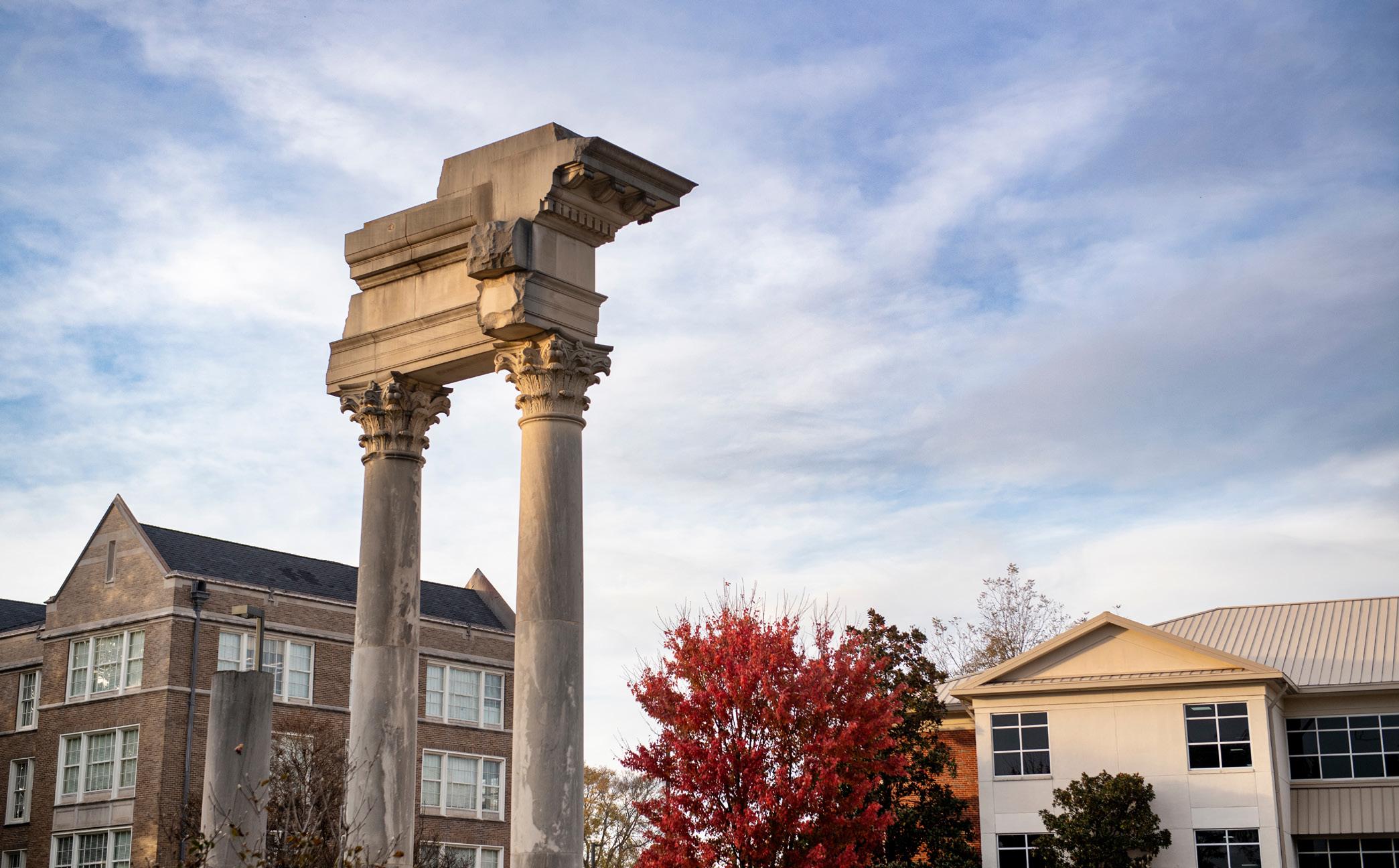Vision




Welcome to the 2022 edition of Vision. This year’s theme is “perspective” as we highlight the breadth of our college and the research and learning that occurs within. Perspective is a rather fascinating word, especially at this time in our nation’s history when it seems that so many ideas and issues have been twisted to such a degree that all perspective has been lost. The drawing below is a famous drawing from the late 19th century that has been used to depict our abilities, or inabilities, to understand events and ideas in more than one way. For some, they spot a duck relatively easily as it gazes to the left with its bill slightly open. Ducks are easy to admire with their graceful flight and wonderfully quirky sound that Old McDonald taught us long ago. For other viewers, they quickly recognize the rabbit and aver that anyone who thinks they saw a duck must be without their senses.
And so it is, it seems, in our world today. The duck/rabbit image is one of several ‘ambiguous images’ used in psychology and other fields of research devoted to studying our ability to process and understand information that can be ambiguous, convoluted, and sometimes, uncomfortable for us to come to grips with. From these research endeavors we know that many individuals cling to the first way they understand new pictures or ideas or events and simply cannot see something from another perspective. Others, however, are rather capable of understanding greater complexity, yet simply choose not to try because it may call for too much introspection or to use the words my then five-year old son once muttered, “it’s too much effort.”
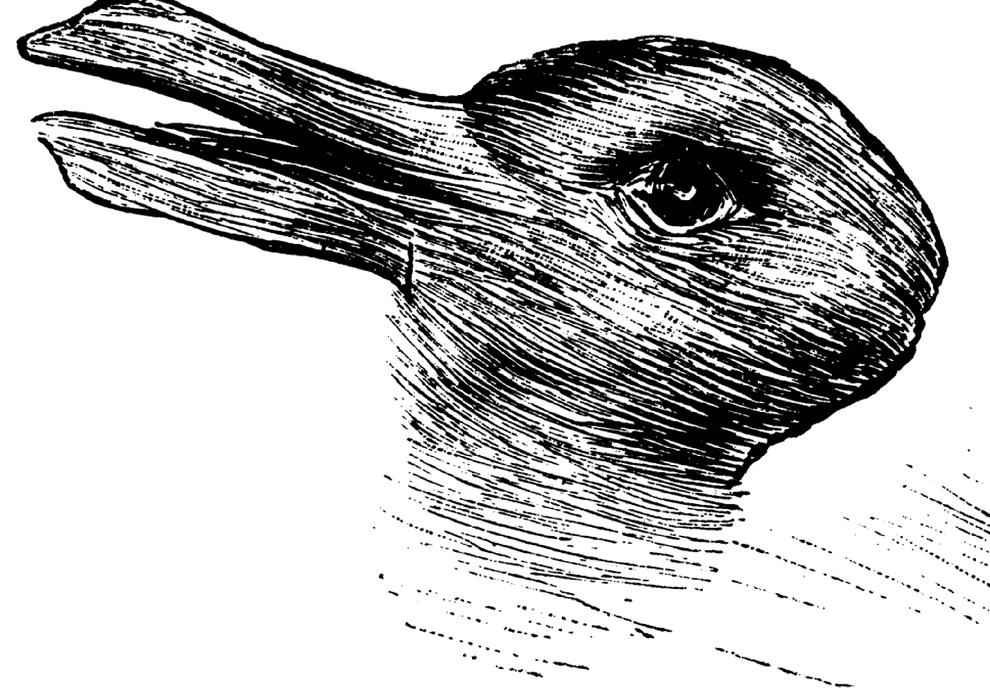
Certainly, it is tempting to try to view the world through a simplistic lens where everything is black or white but such an approach is not in keeping with the core tenets of the College of Arts and Sciences. Indeed, part of our educational mission is to stimulate a life-long pursuit of knowledge, a pursuit willing to explore the gray areas for it is in these gray areas that new insights, understandings and progress emerges. As a college, we strive to prepare our students for a complex world by developing their analytical abilities, broadening their perspectives on humanity and culture, and
equipping them with quantitative and scientific methods that enable them to comprehend the natural world. All of this is done with the expectation that they will use this knowledge beneficially and ethically.
Beyond our classrooms, our faculty are engaged in various research efforts devoted to these self-same goals. In this issue, we highlight some of these efforts that illustrate the panorama of the intellectual breadth of the College of Arts and Sciences. Inside you will find articles focusing on the work of some of our leading humanists who are introducing us to the new exciting world of digital humanities, who are working to reorient our understanding of satire and its use for addressing controversial issues and who remind us that we must never walk away from our past, especially the voices that were lost in the past. Other pieces highlight faculty contributions in meeting ongoing challenges related to COVID-19 and climate-friendly energy production. Still others celebrate the awakenings among students, past and present, who discovered passions while at MSU that continue to lead them to explore new, gray areas further increasing their abilities to see different perspectives in the world.
In all of this, I continue to celebrate my great fortunate to be in a position to observe these things. I also thank you for your support of A&S and its students and faculty. Please keep in touch and come visit when you can.

Hail State!
Rick Travis Dean, College of Arts & Sciences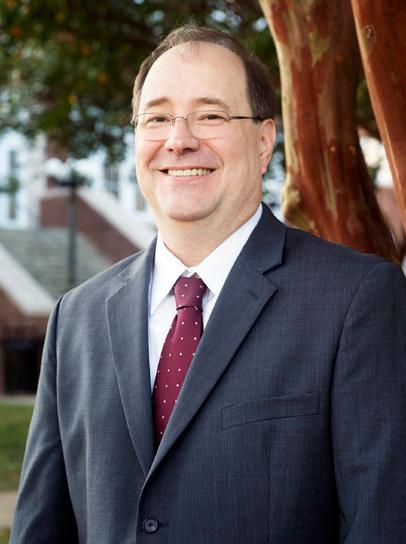
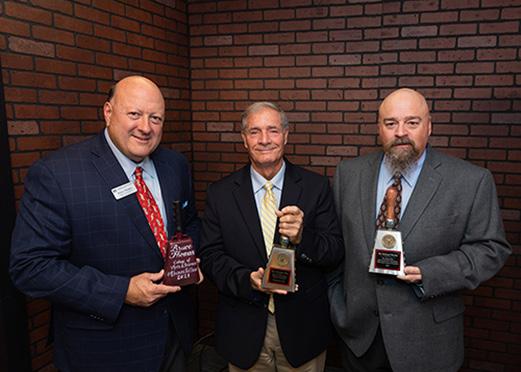
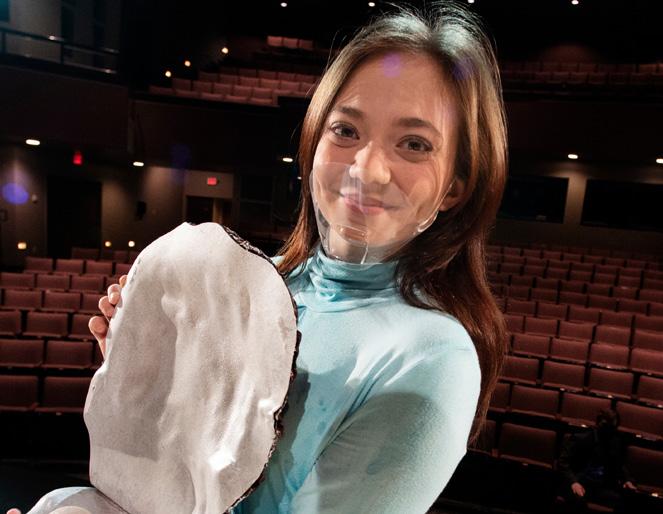
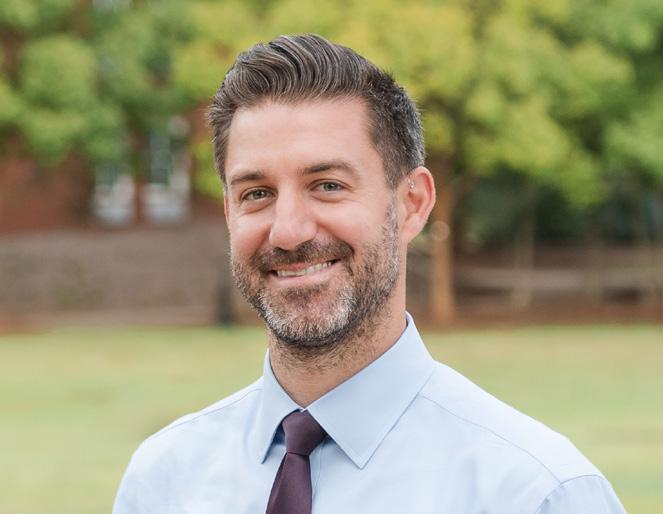


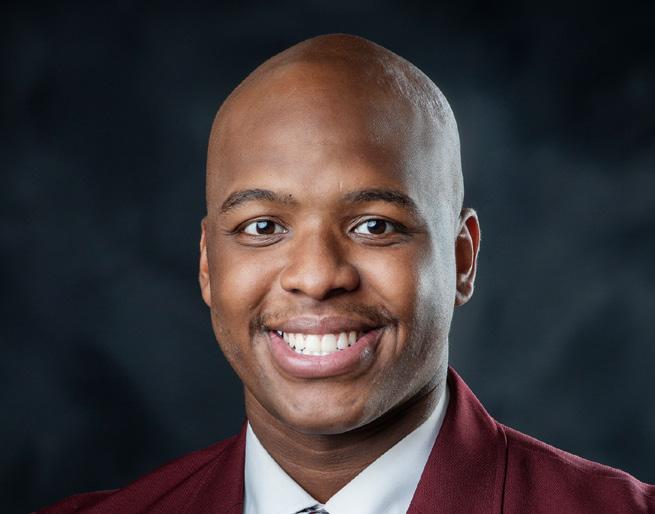
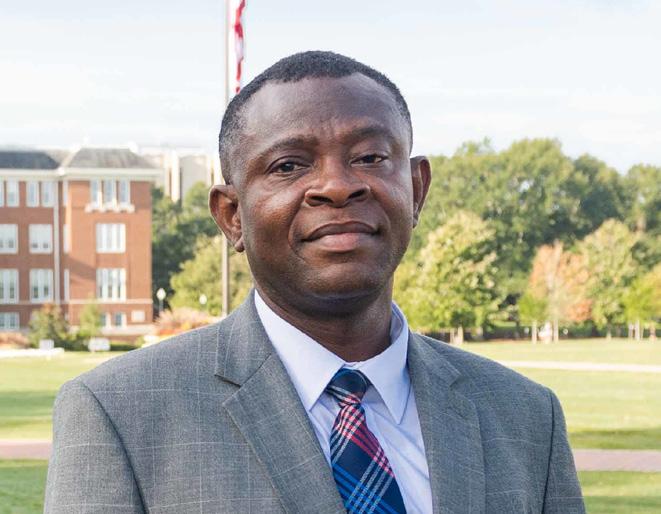
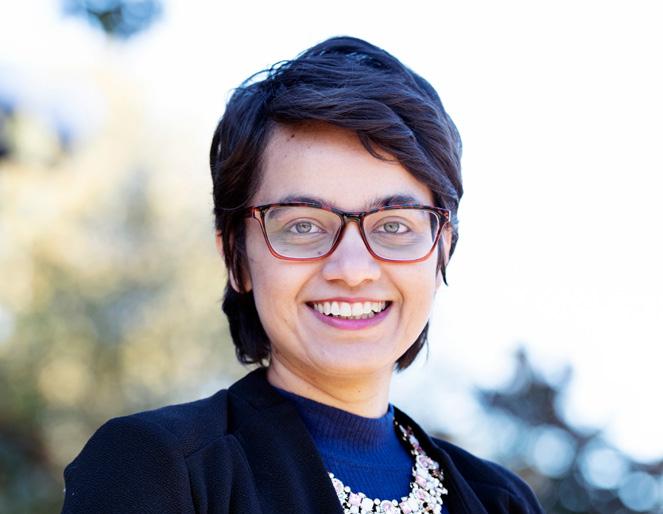
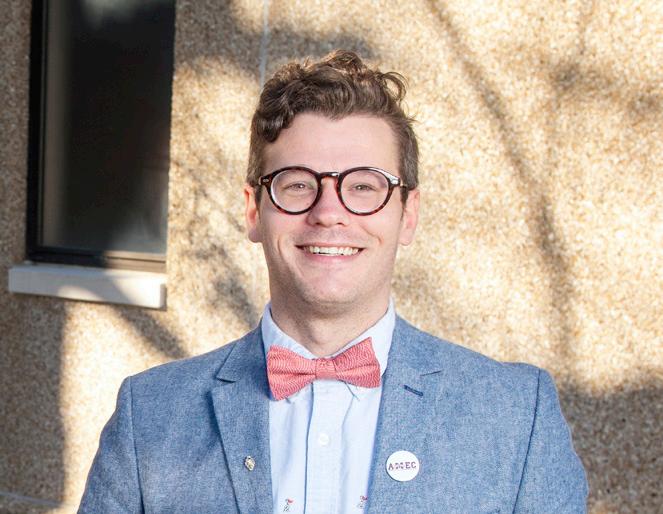

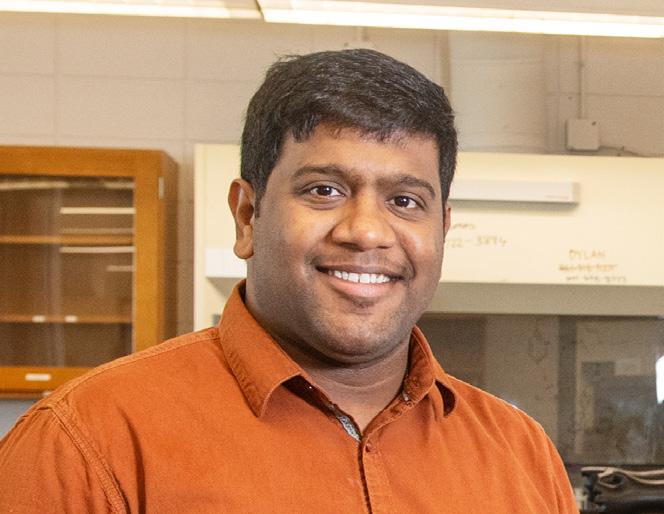
Direct comments or questions to: KARYN BROWN | 662.325.6650 kbrown@deanas.msstate.edu
P.O. Box AS | Mississippi State, MS 39762
DEAN & LEADERSHIP:
DR. RICK TRAVIS DEAN
DR. TOMMY ANDERSON ASSOCIATE DEAN FOR ACADEMIC AFFAIRS
DR. GISELLE THIBAUDEAU (MUNN) ASSOCIATE DEAN FOR RESEARCH
DR. MELANIE LOEHWING INTERIM ASSISTANT DEAN FOR ACADEMIC AFFAIRS
DR. KATHY SHERMAN-MORRIS INTERIM ASSISTANT DEAN FOR ACADEMIC AFFAIRS
ALISA SEMMES ADMINISTRATIVE ASSISTANT TO THE DEAN
ACADEMIC AFFAIRS:
DR. TOMMY ANDERSON ASSOCIATE DEAN FOR ACADEMIC AFFAIRS
EMILY CAIN ACADEMIC COORDINATOR
KASONDRA HARRIS ACADEMIC COORDINATOR
HANNAH BATEMAN ADMISSIONS COORDINATOR
KATE SAWAYA ADMINISTRATIVE ASSISTANT
RESEARCH:
DR. GISELLE THIBAUDEAU (MUNN) ASSOCIATE DEAN FOR RESEARCH
SILAS KNOX CONTRACT & GRANT SPECIALIST
ASHLEY MILLER CONTRACT & GRANT SPECIALIST
KEISHA KNOX BUSINESS COORDINATOR
SAM KEALHOFER COORDINATOR, COMMUNICATIONS & RESEARCH SUPPORT
COMMUNICATION:
KELLI ANTHONY GRAPHIC DESIGN
KARYN BROWN DIRECTOR OF COMMUNICATION
JOHN BURROW COMMUNICATION AND INSTITUTE FOR THE HUMANITIES GRADUATE ASSISTANT
SAM KEALHOFER COORDINATOR, COMMUNICATIONS & RESEARCH SUPPORT
SARAH NICHOLAS WRITER AND EDITOR
DEVELOPMENT & ALUMNI RELATIONS:
SARA FREDERIC DIRECTOR OF DEVELOPMENT
NIKKI ROBINSON ADVANCEMENT COORDINATOR
REAGAN RUFF STUDENT GRAPHIC DESIGNER
BUSINESS AFFAIRS:
SHERYL KINARD BUSINESS MANAGER
LATOYA ROGERS BUSINESS COORDINATOR
JOCELYNN “JAS” ASHFORD ADMINISTRATIVE ASSISTANT
WRITERS FOR VISION:
JOHN BURROW
JOLEE CLARK
ANTHONY COFFMAN
ASHLEIGH LEE
AVERY FERGUSON
SAM KEALHOFER
SARAH NICHOLAS
LISA SOLLIE
CAMERON TEMPLE
EDITORS FOR VISION:
KARYN BROWN
SARAH NICHOLAS
 By Sam Kealhofer
By Sam Kealhofer
When the COVID-19 pandemic struck in 2020, many people relied on information from the internet to learn about the disease and keep their families safe. But when Google provides hundreds of articles in response to one query, what parameters determine which stories are the most pertinent?
Researchers trying to study the disease ran into the same issue. Since the onset of the pandemic there has been a proliferation of COVID-related
literature published, and it can be difficult for scientists to sift through all of the material to obtain the most important findings.
Jingyi “Catherine” Shi, an assistant professor in MSU’s Department of Mathematics and Statistics, saw a need to create automatic pipelines and algorithms to mine COVID-19 literature for key knowledge.
“There is an urgent need to automatically parse publications in order to reduce manual
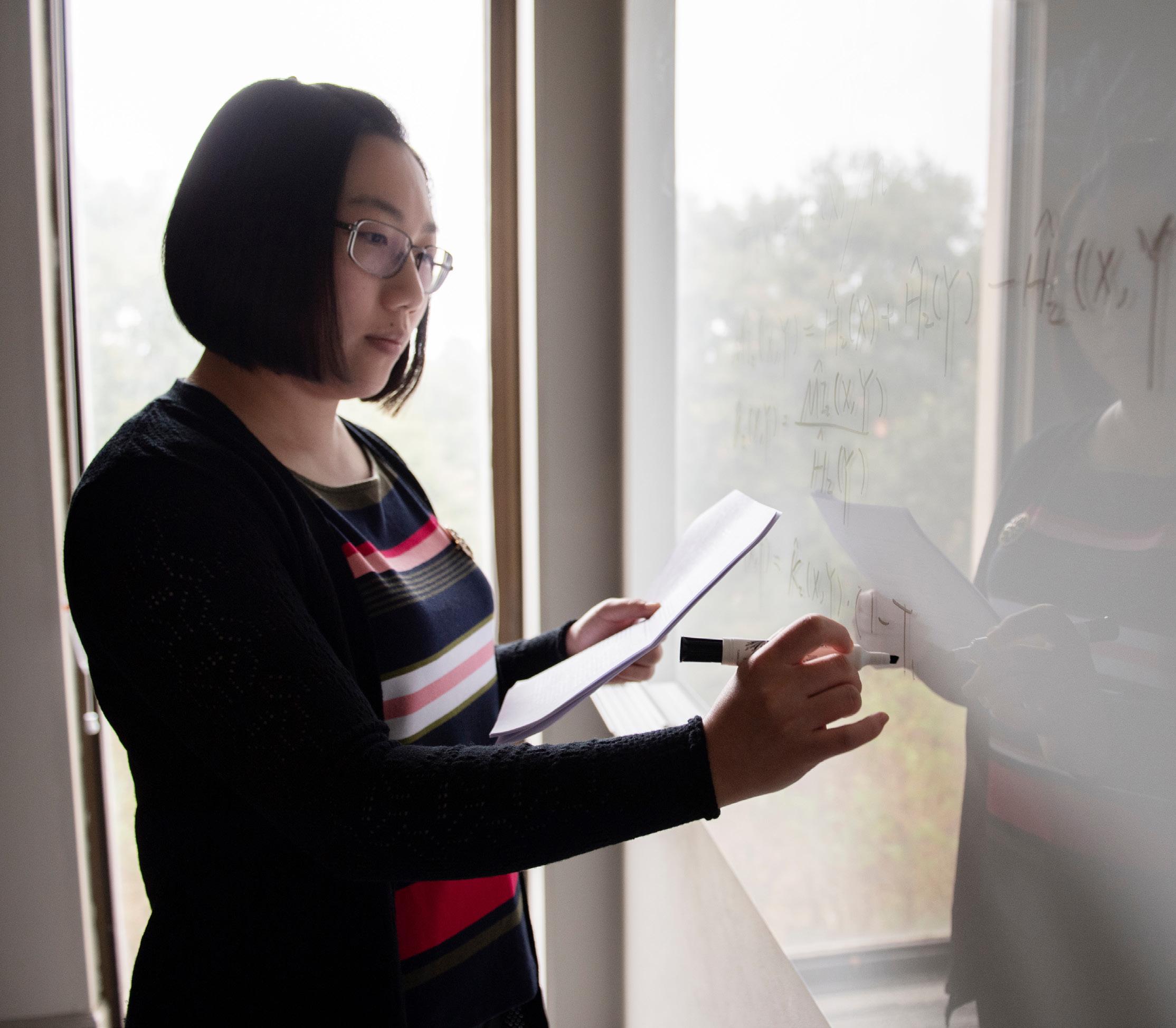
reading load and shorten researchers’ time for finding the things they need from publications,” Shi said.
An expert in data science and health informatics, Shi has a history of integrating cutting edge technologies like predictive modeling and machine learning to focus on healthcare related challenges.

Knowing she had the experience to address this issue, Shi found success for her project, “Developing Automatic Pipelines and Algorithms to Enable Rapid Learning of COVID-19 Publications,” by applying to and securing funding from the 2021 Faculty Seed Funding program—an initiative of MSU’s College of Arts and Sciences.

Shi is a part of the artificial intelligence community and has experience with Natural Language Processing, the science of using computer programs and algorithms to process and analyze large amounts of natural language data. She intends to utilize NLP technologies to develop a ready-to-use pipeline to obtain key knowledge from COVID-related literature while improving the accuracy and scalability of these systems for future needs.
“Obviously, the entire world is now focusing on COVID, and thousands of research papers are published each week,” she said. “I hope with such an automatic pipeline, researchers’ reading load could be significantly reduced. This is not the only effort focusing on knowledge extraction at this challenging time, but each project, including mine, is trying to solve the big problem from different aspects. Hopefully, we all together will make the sharing and understanding of COVID-related research more efficient.”
As the world transitions into the “Big Data” era—generating nearly inconceivable amounts of information through digital technology—Shi’s background in computing and information systems positions her as a forerunner in the management and processing of these data sets. Her project demonstrates the real-world applications of AI and machine learning to solve the most pressing issues of the time.
Shi earned her Ph.D. in computing and information systems/health informatics from the University of North Carolina, Charlotte, in 2019. She now serves as an assistant professor of statistics at MSU. An expert in fields such as data science, predictive modeling, machine learning, statistical analysis, and data discovery and learning, Shi focuses her research on transferring data to knowledge and generalization of health informatics approaches.
often link to climate change—reinforce the need for stable energy infrastructures. Increasingly active hurricane seasons, wildfires caused by extreme drought, unexpected rainfall and flooding across the world—and specifically the winter storm of February 2021 that affected much of the U.S. South—have demonstrated the need for technological capabilities to supply sufficient energy.
Mahesh K. Gangishetty, an MSU assistant professor with a joint appointment in the Department of Chemistry and Department of Physics and Astronomy, hopes his work with emerging materials utilizing solar energy and eco-friendly, lightemitting devices will help bolster energy supply.
“Existing infrastructure on the power grid system cannot survive extreme weather events like winter storms and floods, leading to the prolonged power outages that we often see,” Gangishetty said. “The robust alternatives would be having rooftop power supply units using solar panels. Solar energy can help prevent the occurrence of future calamities from climate change.”
Gangishetty specializes in understanding the light-matter interaction in materials such as lead halide perovskite and uses them in devices including solar cells and light-emitting diodes (LEDs).

Perovskites have become a promising candidate for highly efficient solar cells, light-emitting diodes and x-ray detectors, but they are notoriously unstable. Scientists believe more research is
“While these perovskites have amazing properties and great potential to be cheap and efficient materials for the next generation of solar cells and LEDs, their fragile structure is preventing them from entering the commercial market,” Gangishetty said. “Here at MSU we work on employing various metal ion impurities into the crystal lattice and stabilizing their crystal structure, and then building the devices.”
Gangishetty said he and other leading scientists around the world are in a constant academic race to unlock the potential of the technology.
“A recent space mission from NASA, in collaboration with the National Renewable Energy Laboratory, used perovskite solar cells, which is clearly a step forward and a great encouragement to the perovskite field. Unquestionably, this technology has a potential to occupy the commercial market one day in the near future,” Gangishetty said.
Stabilizing these materials is a crucial step in commercializing the technology, he said. Gangishetty’s research is playing a role in building efficient and stable devices.
His recent co-authored article in the Journal of the American Chemical Society, “Charge Carrier Localization in Doped Perovskite Nanocrystals Enhances Radiative Recombination,” focuses on understanding how Mn doping can enhance the stability and optical properties of perovskites.
His work with perovskites also has led Gangishetty to be considered a leading expert in the development of quantum dot
light-emitting diodes—or QLEDS—which will revolutionize the display possibilities of monitors, phones and TVs, all of which soon will use quantum dot technology.
“The LED display technology has grown tremendously in the last couple of decades,” said Gangishetty. “The field has grown from using massive picture tube displays to thin and flat lightweight LED screens. Undoubtedly, future lighting and display technology will be completely dominated by LEDs. The next generation displays will have high resolution, easily processable, flexible and cheap LEDs made up of quantum dots—often referred to as QLED TVs.”
His laboratory at MSU focuses on developing a wide range of optoelectronic materials and building devices for energy conversion applications and is home to his efforts to build a
world-class fabrication setup, constructing devices like solar cells, LEDs and NIR cameras.
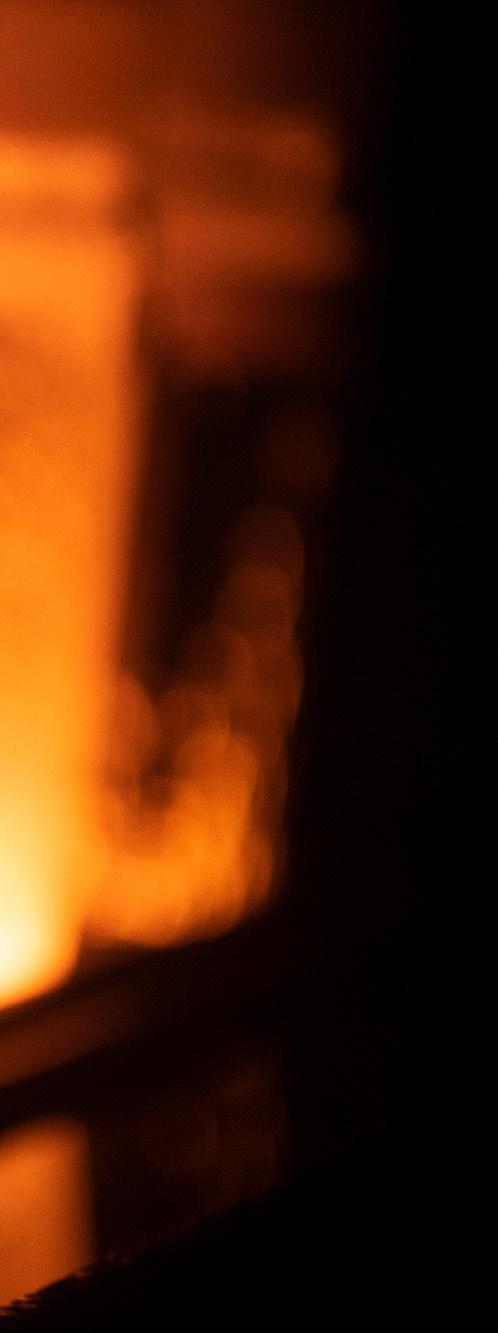
“The most exciting thing about my research is that we have an ability to study and engineer the materials and build devices in a way that they could have a direct impact on climate change and energy consumption—in other words, preventing extreme weather-event power calamities caused by climate change and building a clean and ubiquitous energy supply for future generations,” Gangishetty said. “We strongly believe that with the state-of-the-art fabrication facilities and infrastructures we are building at MSU, we have great potential to be a part of leading institutes that are targeting these energy-related problems.”
Gangishetty earned his 2010 master’s degree in chemistry from the Indian Institute of Technology and his 2017 Ph.D. in chemistry from the University of Saskatchewan, Canada. He served as a postdoctoral fellow at Harvard University’s Rowland Institute in 2020. He is an expert in perovskite materials synthesis, its inclusion in the fabrication of photovoltaic solar cells and light emitting diodes, and the spectroscopic characterization of the devices. Gangishetty is currently working to set up a fully functional device research laboratory as part of MSU’s Center for Emergent Molecular Optoelectronics. He is a co-inventor of three patents. The technology for one patent currently is being transformed into a startup company in Cambridge, Massachusetts. He has applied for energy funding from various institutes such as the U.S. Department of Energy, DARPA, the National Science Foundation and the U.S. Department of Defense, among others.
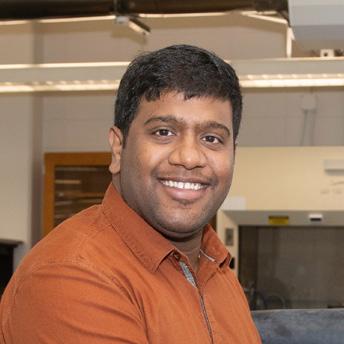
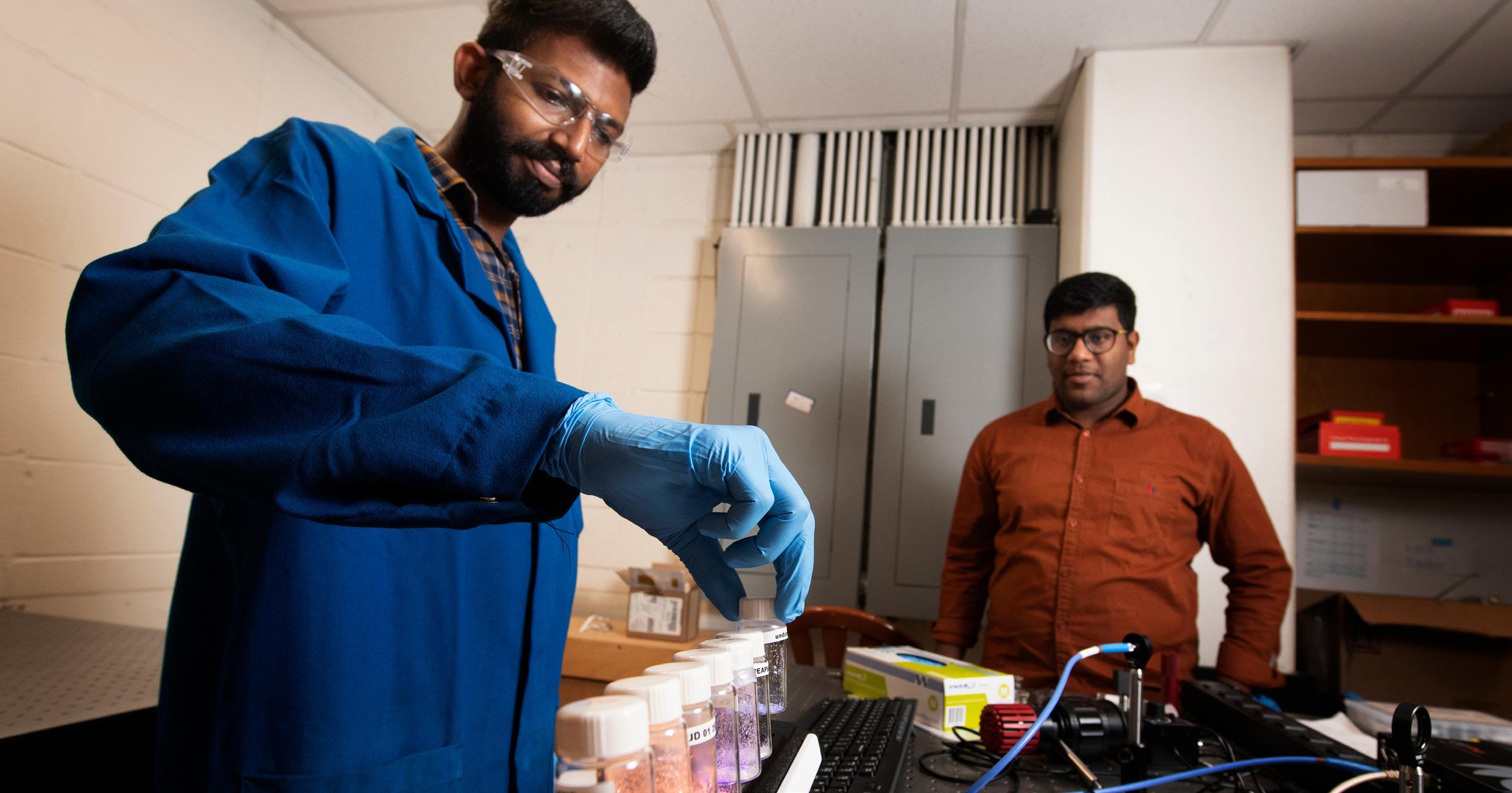
From “Beowulf” and “Hamlet” to “Charlotte’s Web” and “Harry Potter,” readers have frequently found life lessons in literature. But in this world of climate crisis, late-stage capitalism and world pandemics, what insights can literature really provide to modern readers?
“Literature resonates with us on such a deep level because it encompasses all facets of the human condition,” said Keith
By Sam KealhoferMoser, a professor in Mississippi State’s Department of Classical and Modern Languages and Literatures. “For instance, the Franco-Mauritian writer and 2008 Nobel Laureate in Literature J.M.G. Le Clézio is often described as a ‘painter’ of contemporary life who creates a poignant portrait of the modern world at the dawn of a new millennium.”
Moser joined MSU’s faculty in 2007
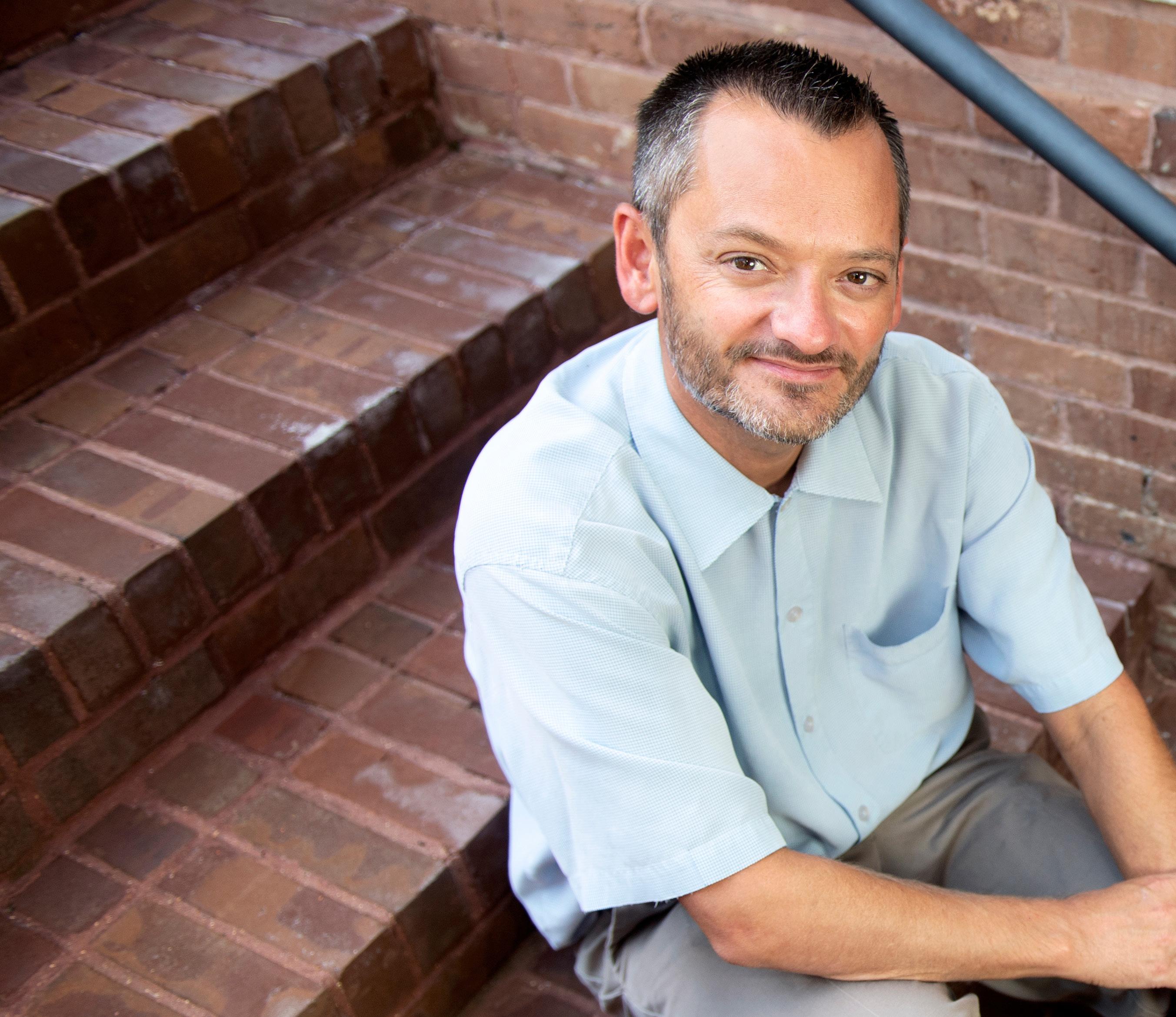
and has since published more than 100 major publications that incorporate themes today’s readers encounter—climate change, mass extinction, the media, fake news, “post-truth” metanarratives, poverty, immigration and many other new challenges that impact the modern era.
“People often ask me why I publish about so many current issues that global society has been forced to confront in the 21st century,”
Moser said. “For better or worse, I am haunted by manifestations of social and ecological injustice in all of their divergent forms.”
“Given that social and ecological injustice can never be eradicated in their entirety, I always feel compelled to write,” he continued. “It is almost like a summons that forces me to write that could be compared to someone knocking on your door who refuses to go away until you answer. As strange as it may initially sound, I am a scholar who can only write about things that move me.”
Recently, Moser served as co-editor of a 2020 volume of essays titled “The Metaphor of the Monster: Interdisciplinary Approaches to Understanding the Monstrous Other in Literature.” Along with researchers in fields such as animal ethics, gender studies, classical studies, philosophy and world literature, Moser offers a new application of monster studies through the lens of ecocriticism.
“Ecocriticism is an interdisciplinary branch of literary criticism that incorporates ecological concerns and explores various representations of the biosphere and our connection to it in literary works,” Moser said. “‘The Metaphor of the Monster’ fills a significant research gap because it is one of the first academic publications that weaves connections between ‘Monster Theory’ and ecocriticism, or environmental ethics in general.”
Moser said specifically, the rhetoric of monstrosity or the notion of the “savage beast” reinforces dichotomous thinking and misleading mental categories like “human” and “animal.”
“When a human or non-human entity is deemed a ‘monster,’ the doctrine of moral consideration no longer applies,” he said. “In the philosophical sense, anything is permissible.”
Moser’s original translation of Dominique
Lestel’s “A portrait of Fictional Characters as Darwinian Monsters” demonstrates how the collective imagination of monsters pervades human culture and can have vast impacts on the way people act and develop societies.
Moser said the “hegemonic purpose of the monsters that we have been conjuring up for countless millennia is to rid society of difference.”

He builds on this piece’s arguments in his essay “J.M.G. Le Clézio’s Defense of the Human and Other-than-human Victims of the Derridean ‘Monstrosity of the Unrecognizable’ in the Mauritian Saga Alma”—in which he reexamines the metaphor of the monster from an ecological perspective.
“The protagonist of the novel, Dominique ‘Dodo’ Felsen, was doomed to share the same tragic fate as the dodo bird because their unfamiliar forms marked them as monstrous,” Moser said. “Just as the protagonist is made an outcast because of his leprosy, the dodo bird’s unique appearance and mannerisms caused colonizers to see the bird as more of a strange curiosity than a normal animal. Their resulting cruelty would lead to the dodo bird’s extinction.”
In this regard, Moser said, “The monsters we conceive may be imaginary, but the deadly ramifications of dichotomous thinking are all too real. From an ecological perspective, the most destructive binary of all is the humananimal divide that appears to have set into motion a sixth mass extinction that could foreshadow the end of the human race.”

Moser said the evident humanistic goal of much of his research is “to bring the human and non-human monster out of the shadows and into the light of moral consideration.”
“While the problems today’s readers face may be more elusive than werewolves, vampires and mummies, they are no less dangerous,” he said. “And literature is still a good place to face them head on.”
Moser earned his master’s in French and Francophone literatures from Mississippi State University in 2002 and his Ph.D. in French literature with a minor in applied linguistics from the University of Tennessee in 2007. He then returned to Mississippi State as a faculty member in the Department of Classical and Modern Languages and Literatures. Moser is considered an eminent expert of J.M.G. Le Clézio’s fiction and Michel Serres’ philosophy. He is a prolific writer and has published on numerous topics, such as social justice, globalization, ecocriticism, environmental philosophy, biosemiotics, neoliberalism, diaspora studies, consumerism, material culture and popular culture. In 2019, Moser won the College of Arts and Sciences Faculty Research Award for his efforts.

History lies littered with recurring challenges—pandemics, political polarization, a steady stream of “unprecedented” news. In academia in 2021, a recurring challenge is how to teach and uncover voices that are often silenced or difficult to find. Research by a Mississippi State University faculty member now is helping to reveal these voices.
“It is interesting that when people see a woman talking about historical women, they sometimes assume she specializes in women’s and gender history. I consider myself a specialist in African American history, which, like any subfield, cannot be studied or taught without thinking about the experiences of women,” said Leigh Soares, an MSU assistant professor of history.
“Integral to the story of early U.S. history, to give just one example, is how the system of chattel slavery came to be defined and carried out through Black women’s bodies, and how Black women engaged in various forms of resistance,” Soares continued. “Because Black women’s voices are missing from so much of the traditional historical record, centering their experiences is also a powerful way to teach students how historians can use innovative source analysis and historical imagination to piece together a fuller picture of the past.”
An MSU faculty member since 2019, Soares’ specialization in African American history focuses on politics and education. She is working to reveal historical roots of ongoing disparities in higher education
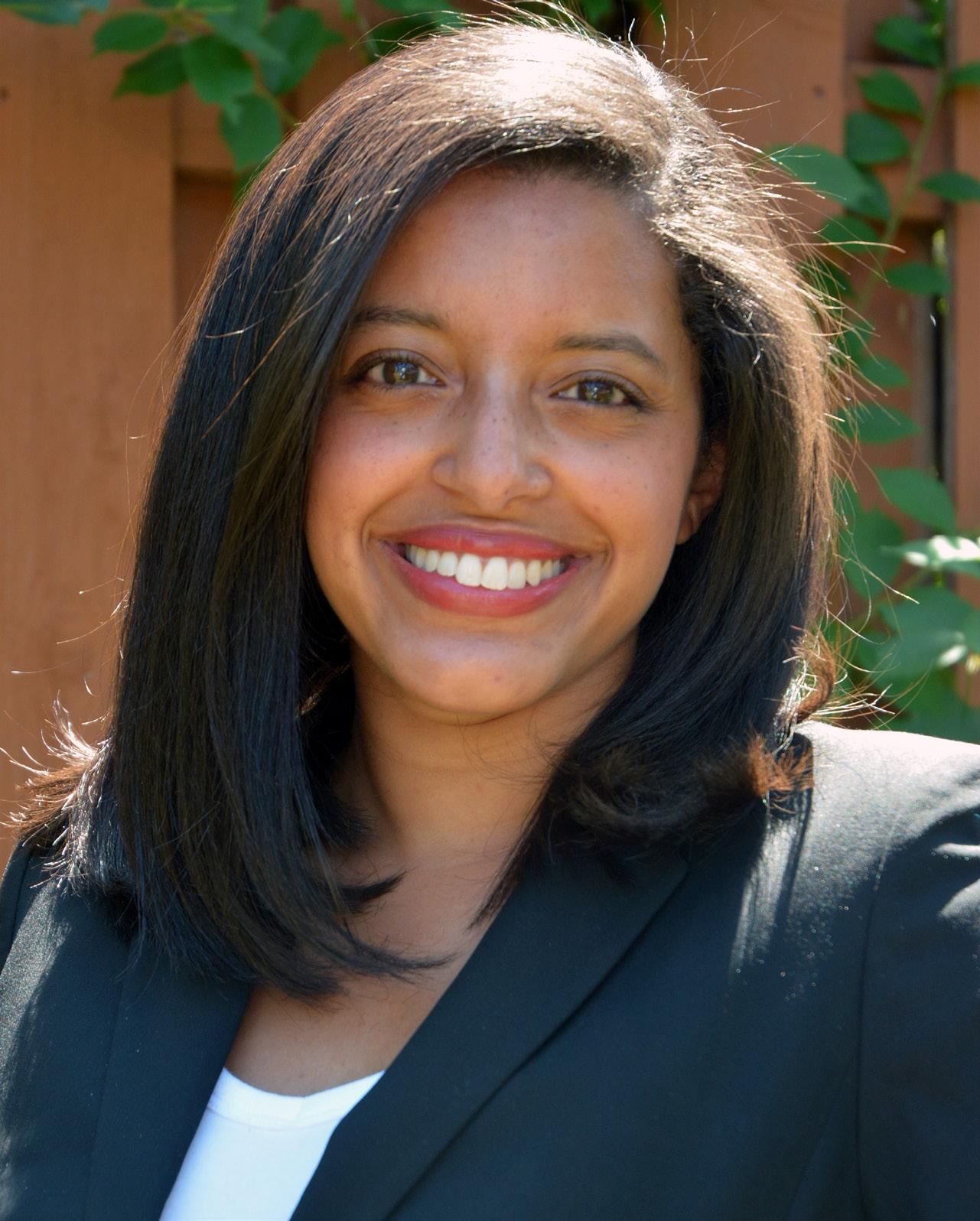
and currently is developing her first book, which examines how Black southerners used public Black colleges as sites of political engagement from Reconstruction to Jim Crow.
“I might not have pursued history but for the frequent storytelling that went on in my family, usually led by my maternal grandmother, whose own grandparents had experienced the transition from slavery to freedom during the Civil War era,” Soares said. “Hearing her talk about her experiences as a southern Black woman, our ancestors’ lives, and the Black institutions that loomed large in them shaped me and my scholarship in profound ways.”
Soares said as she delved deeper into her studies, she became captivated by the period of Reconstruction that followed the Civil War and the ways Black Americans navigated an era full of both “radical possibilities and violent hostility.”
“Eventually, that led me to investigate the relationship between 19th-century Black politics and institution building, particularly public higher education,” Soares said. “Historians have shown that for Black Americans, political activities, including voting and organizing, were communal responsibilities even when laws defined formal electoral politics as an exclusively male realm. Still, since state education administration and officeholding were reserved for men in the South into the 20th century, I have at times struggled to find ways to center Black women in my current research on early public Black colleges.”
Soares said public leadership— especially when it intersected with formal politics as in the case of
public colleges—was coded white and masculine.
“It was hard enough for Black men to get a toehold in that arena, so Black communities often supported men assuming public leadership roles in hopes that their success would uplift everyone,” she explained. “By drawing on interdisciplinary methodologies and unconventional sources, such as photographs in early college catalogs, I have been able to consider what we can learn from performances of gender and leadership on Black campuses.”
Soares said the experiences and perspectives of women have been crucial to the development of the humanities.
“Students are often surprised to learn that many concepts widely discussed today were championed by Black women long ago. Maria Stewart used her abolitionist speeches to lambast the racism embedded in American capitalism. Nineteenth-century intellectual Anna Julia Cooper wrote about the intersecting oppressions Black women faced. Mississippi civil rights activist Fannie Lou Hamer testified that rural, poor Black women were especially vulnerable to attempts by lawmakers and doctors to control women’s bodies,” Soares said. Uncovering the voices that shaped today’s landscape, Soares explained, requires acknowledging the efforts and contributions of all who have preceded modern scholars.
“Whether we are invested in history, philosophy, sociology, literature or the arts, we cannot offer a full accounting of our discipline and what it has to offer without acknowledging the past and present contributions of women, and specifically Black women.”
Leigh Soares joined MSU’s Department of History in 2019. She specializes in African American history with a focus on politics, education and the U.S. South. She earned a Ph.D. in history from Northwestern University in 2019, a master’s in history from the College of William and Mary in 2012 and bachelor’s in history from Duke University in 2010. From 201920, Soares served as an Africana Research Center Postdoctoral Fellow for the Richards Civil War Era Center at Pennsylvania State University. She was a finalist for the prestigious C. Vann Woodward Dissertation Prize in Southern History in 2020. Soares is a member of the American Historical Association, Organization of American Historians, and Association for the Study of African American Life and History.

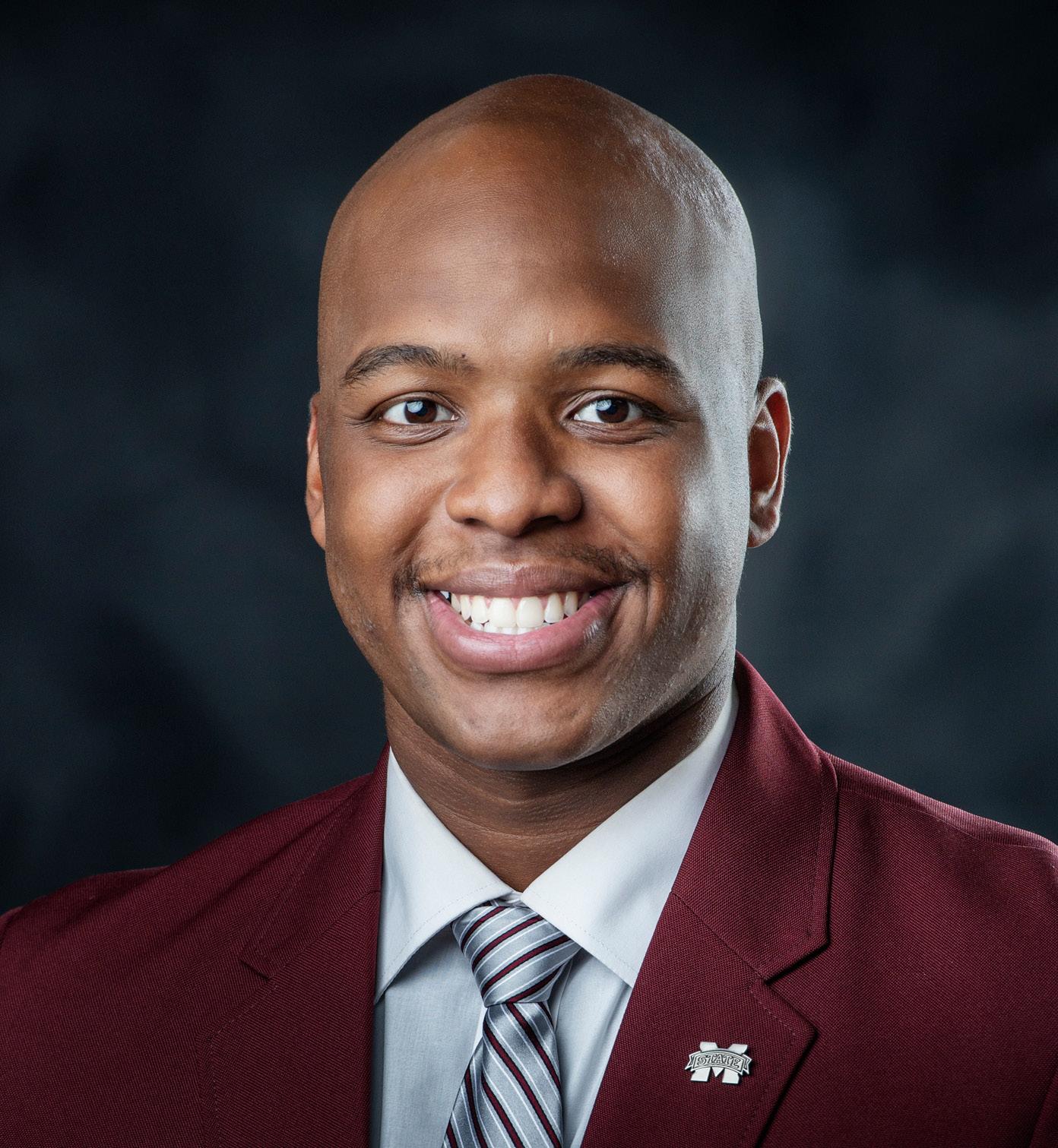
Although live theater productions have been limited the past two years because of COVID-19, Mississippi State theatre student Donovan Andrade did not let the slowdown stop his passion for the performing arts.
The senior communication/theatre and kinesiology/ health fitness studies double major, originally from Manama, Bahrain, had the “eye-opening” opportunity in Spring 2021 to direct the Theatre MSU play “Pipeline,” which he said further cultivated his skills in theater production.
“It taught me many things, but overall, an important point to stress would be patience. Patience was so valuable because as a director for this production, I had a vision of what I wanted, but I also wanted to incorporate my ensemble and their thoughts in certain areas. Having to communicate with all factions of theater as director also taught me that everyone has different schedules so working around that was a very challenging task,” Andrade said.
Having added the role of director to his list of experiences, Andrade was driven to learn more about his field from those who work on productions for the premier theater production company, Broadway.
Last year Andrade applied for and received the Broadway Stage Management Symposium student scholarship— provided specifically for stage managers of color and also selected by stage managers of color. The experience provides the opportunity for hands-on learning and connecting with stage managers from around the world. Andrade was one of five students chosen nationally to participate.
“I wanted to learn more about delegation from Broadway stage managers after directing ‘Pipeline’ because being in college, we are still students who have other commitments. I wanted to see how professionals in the field delegate tasks with each other,” he said.
During his four days attending the BSMS—which took place in a virtual format—“there were workshops that attendees could jump into and listen to speakers, there were lounge areas where people could just talk to one another between sessions, and there were two opportunities to watch Broadway shows alongside stage managers who called the shows and answered questions,” said Andrade.
This one-on-one engagement allowed him to find “invaluable” career mentors.
“Kenneth McGee left the biggest impression on me because we were able to have time to talk on a more personal level and sort of pick each other’s thoughts about theater
and what it means to be a stage manager. He also gave me sound advice that I will heed going into this upcoming school year for Theatre MSU. It was a mentor/mentee relationship that I am forever grateful for,” Andrade said.
He said the experience taught him that “time is of the essence, and not to focus too intently on certain details that would not affect the overall performance and communication of the play to the audience.”
Andrade plans to direct more plays for Theatre MSU this school year before graduating in May. His current career plans include his continued involvement in theater, as well as the rewarding prospect of sharing it with others.
“My time studying communication/theatre at MSU has further developed my interest in theater as a career field by allowing me to branch out to the many different fields of study such as stage management, directing, acting and running crew,” Andrade said. “It’s given me the opportunity to support and thrive and continuously find love for the arts.
“I am still set on finding my place in theater but first I would love to go into teaching. There are so many different avenues I can take, and I want to make sure that I still can have fun while working. After graduation, I am set on finding a graduate school to further my education. I see myself as an ever-evolving type of person and want to do exactly what I have done so far in college: act, stage manage, run crew and direct.”
While theater can sometimes be perceived as an art form that is only enjoyed by select or niche groups of people, Andrade feels strongly about making it more accessible.
“I think we need to see more things that truly make us think. Theater is a form of communication and people can use it to bring light into the times we live in. Making theater more accessible is easy. Cater to the audiences and know your crowd. Finding shows that are not as well-known as others can bring forth the interest of many different groups and communities.”
Avery K. Ferguson, a native of Mandeville, Louisiana, and is a second-year M.A. student from MSU’s Department of English. After graduation in May 2022, Ferguson hopes to work in either publishing or academic event planning for the humanities.
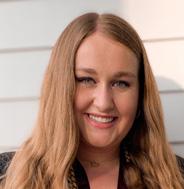
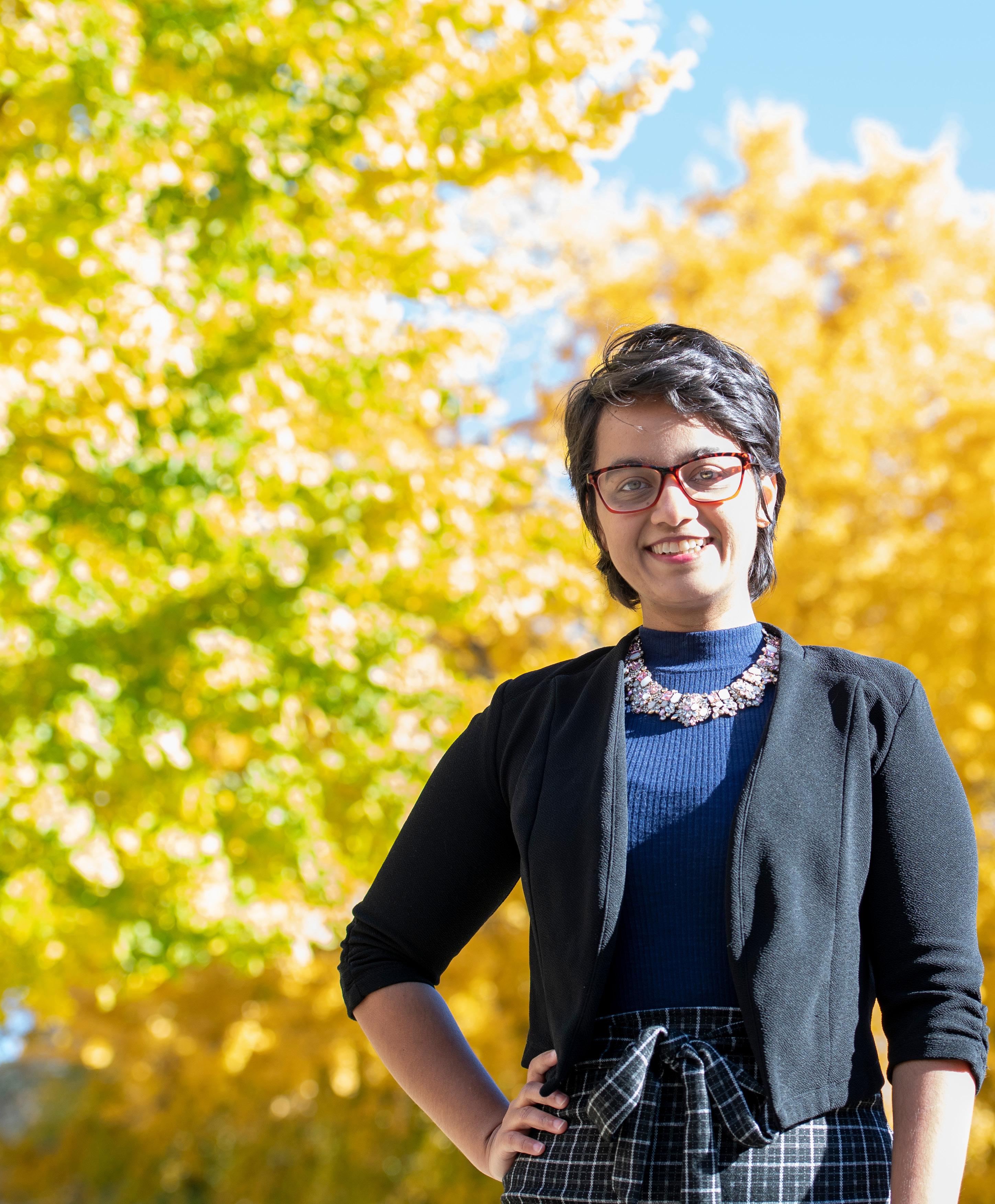 By Cameron Temple
By Cameron Temple
Now the field of digital humanities finds itself gaining attention, a move Dhanashree Thorat is helping lead at Mississippi State.
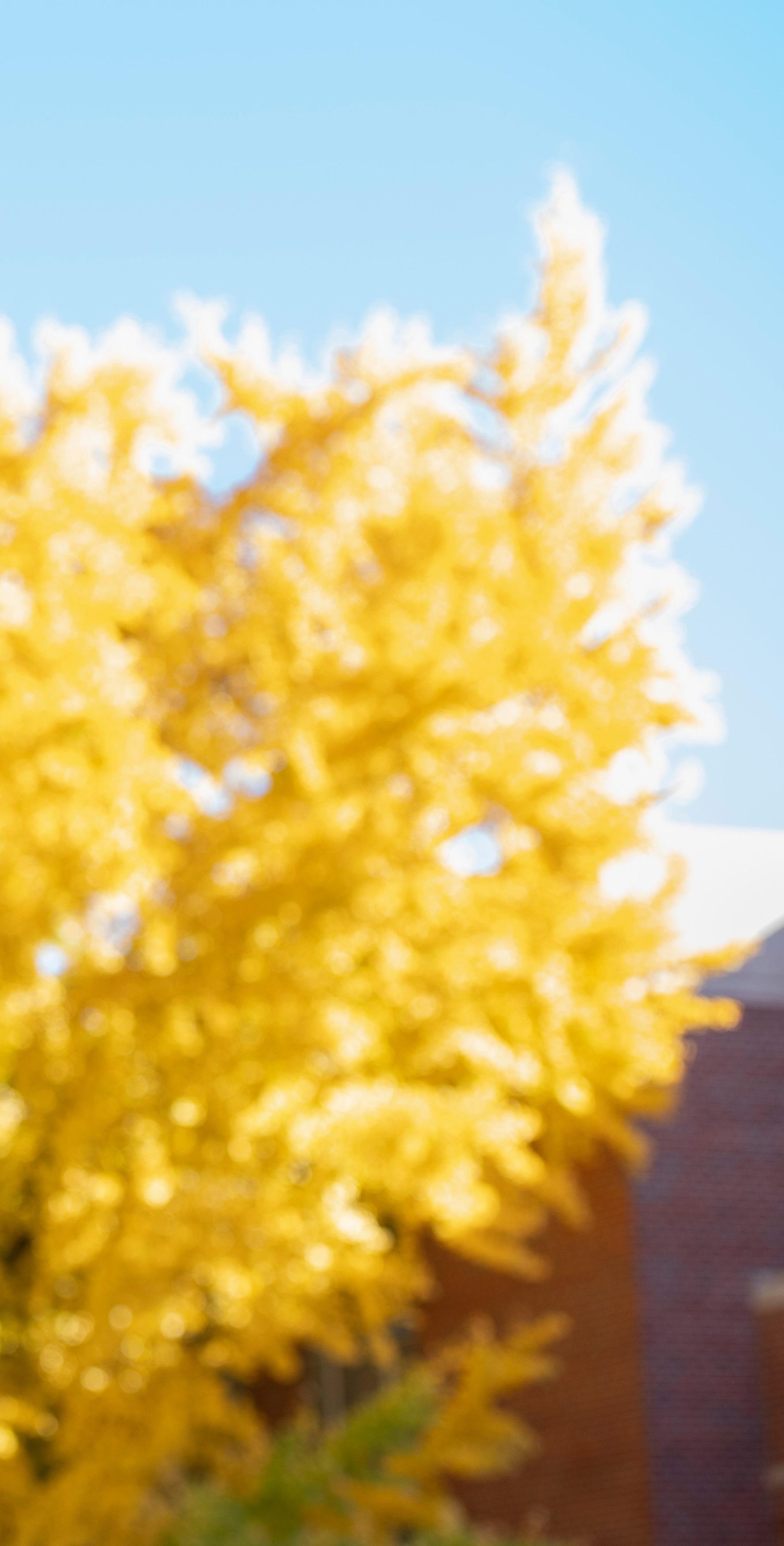
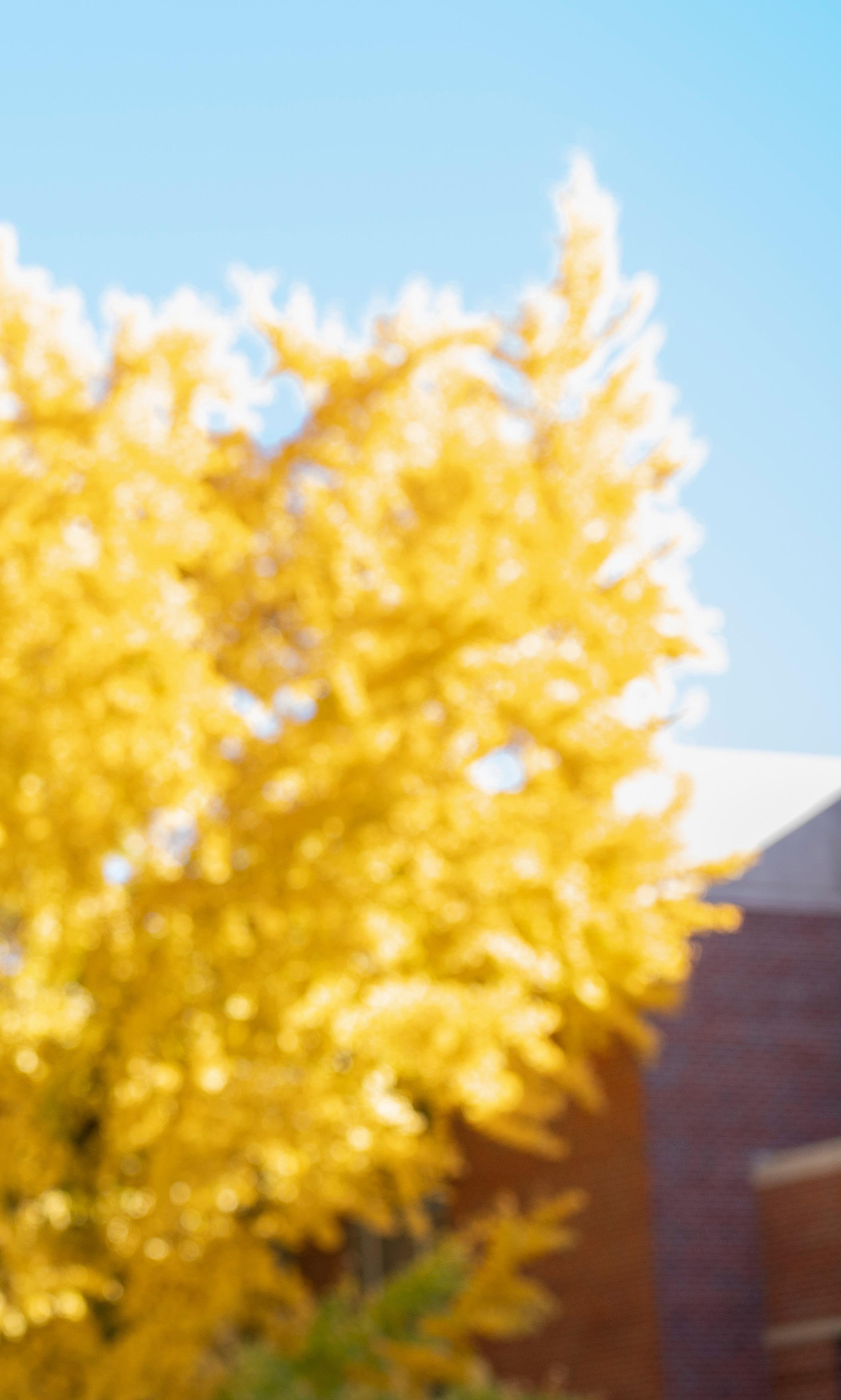
An assistant professor in MSU’s English department since 2019, Thorat said digital humanities is “a nexus of fields within which scholars use computing technologies to investigate the kinds of questions that are traditional to the humanities or ask traditional kinds of humanities-oriented questions about computing technologies,”—crediting colleague Kathleen Fitzpatrick at Michigan State for the definition.
“I am deeply invested in creating public scholarship which is community-oriented and accessible to broader audiences,” Thorat said. “Humanities research is valuable because it deepens our understanding of society and culture, and it should not be siloed behind paywalls where it is only accessible to a few people,” she added.
Through her work, Thorat explores the interaction between emerging technologies and research in the humanities, demonstrating “both can transform the other for the better.”
Technology in academic settings has been in the spotlight even more these last two years because of changes COVID-19 has necessitated.
Technology equips the humanities with powerful new tools and methods to better understand history and culture, Thorat said.
“Digital methods such as computational text analysis, digital mapping and data visualization are now part of the toolkit of humanities scholars. Likewise, the digital humanities’ themes of ‘open access and activism’ indicate promise to make emerging technologies, like the internet, more equitable and accessible, something crucial during times of increased online learning.
internet access to underserved countries in the Global South remain invested in “colonial modes” of development.
“Drawing on colonial maps and treatises, current state policies on data infrastructures and telecommunication, technical protocols on managing internet infrastructure, and other documents, I explore how colonial communication networks have shaped today’s undersea fiber-optic cable network,” Thorat said. “As these examples indicate, digital humanities covers a broad set of research agendas.”
Thorat said advances in computing technology have enabled new platforms, tools and practices to pursue humanities research. “These methods also draw on the unique affordances of digital modalities and enable scholars to do something they could not have pursued before. For example, students now are able to pursue new projects with digital mapping, which aids students in visualizing, studying and interacting with spatial data.”
After her introduction to the digital humanities while in graduate school at the University of Florida, Thorat realized she enjoyed the collaborative nature of the field. While many research fields consist of a single scholar working alone, Thorat said collaborative research is normalized within the digital humanities because digital projects pull on different forms of expertise.
“My own digital humanities research, which draws on media studies and postcolonial studies, examines internet infrastructure in the Global South,” Thorat explained. “Specifically, I am studying the colonial origins of the undersea cables which enable transcontinental internet networking. These cables are the reason why we can send emails internationally or do a Google search that might ping through many data centers before returning search results.”
Thorat said that despite considerable interest in remedying the global digital divide, new infrastructure projects intended to bring
One of Thorat’s projects—an Introduction to Digital Humanities textbook—is tailored for Indian audiences and includes peer review and feedback from other scholars.
Building on the collaborative nature of digital humanities in her own work, Thorat seeks “open access” work, using her projects to “explore community-based models for internet governance that are more equitable and responsive to local needs.”
Thorat also collaborates with students on digital humanities projects through her MultiEthnic U.S. Literature class. Before COVID-19,
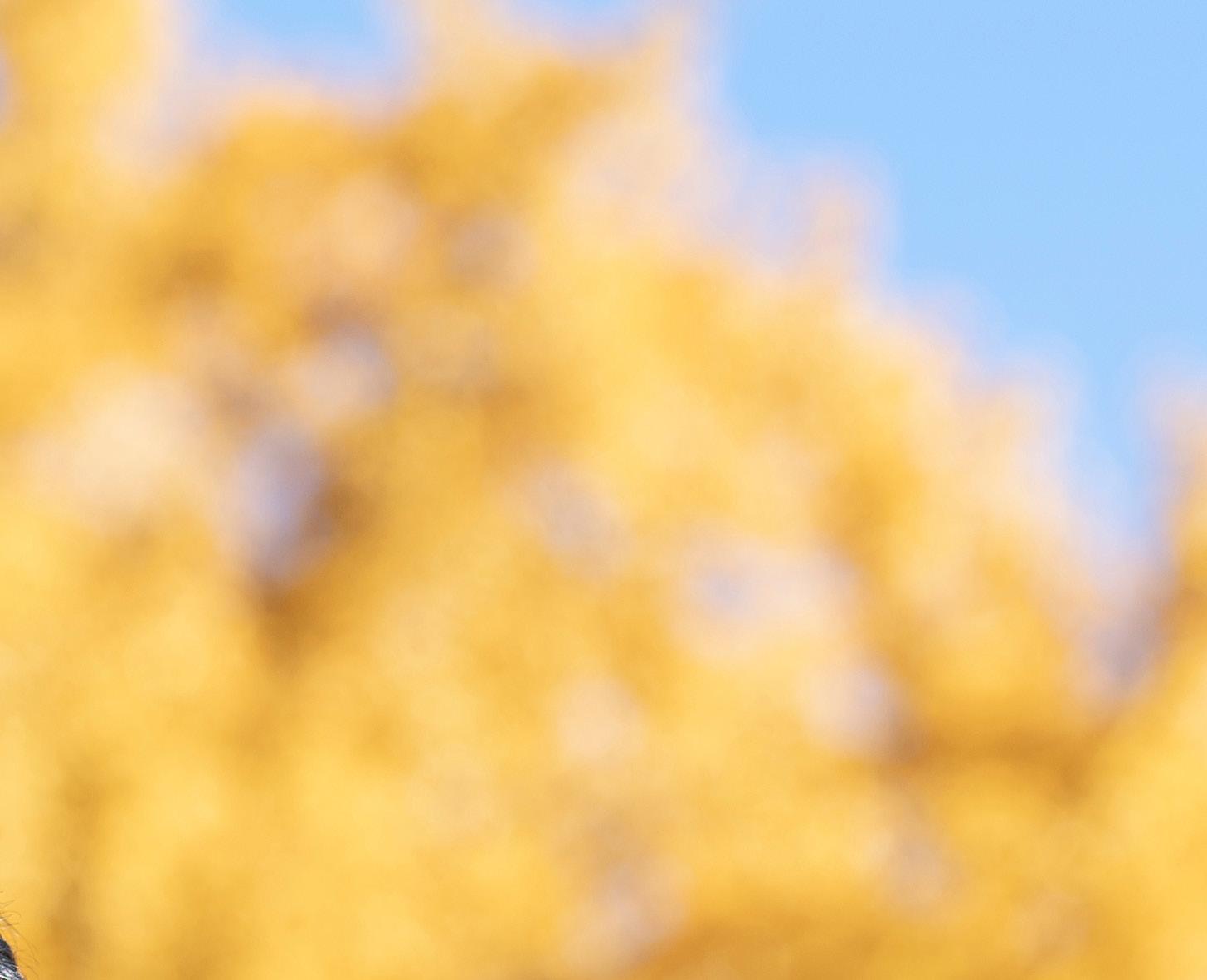
“I am deeply invested in creating public scholarship which is communityoriented and accessible to broader audiences,”
- Dhanashree Thorat
her students created print “zines”—selfpublished creative texts, like pamphlets or small magazines, intended for a small audience that highlight critical social issues not addressed in mainstream publications. Thorat’s students’ “zines” focused on Mississippi literary and historical figures and were showcased in MSU’s Mitchell Memorial Library. Although the pandemic has limited in-person projects, Thorat and her students have adapted to virtual learning, focusing on digital projects instead.
“In my last Gender Studies class,” said Thorat, “students wrote short essays exploring the life and legacy of two feminists, Yuri Kochiyama and Anne Moody, and we made a virtual exhibit where others can learn from their research. I enjoy working with students on digital projects and it is important for students to see how their writing and research skills can make an impact in the world.”
In addition to her work on campus, Thorat also works globally to ensure other schools have the same resources. She assists with the Center for Digital Humanities in Pune, India, to hold biennial winter schools and training opportunities for Indian scholars interested in learning about the digital humanities and their methods.

“The pandemic makes networking difficult, but I am beginning to consider what it means to do digital humanities specifically in Mississippi and in the U.S. South as an international scholar and a woman of color,” Thorat said. “I am eager to bridge the connections and networks I have built in India and my new community here. There are unique opportunities for conversations on race, caste and colonialism between these rich locations of the Global South and the U.S. South.”
Dhanashree Thorat situates her research at the intersection of Asian American studies, postcolonial studies, and digital humanities, and she examines how colonial and racial ideologies shape the technological imagination, specifically in technical infrastructures, platforms and policies. Her current work focuses on how Muslims use hashtag activism to intervene in public conversations about their racialized bodies. She completed her Ph.D. at the University of Florida in 2017 and was a postdoctoral researcher in digital humanities at the Institute for Digital Research in the Humanities, University of Kansas from 2017-2019.
ABOUT THE AUTHOR:
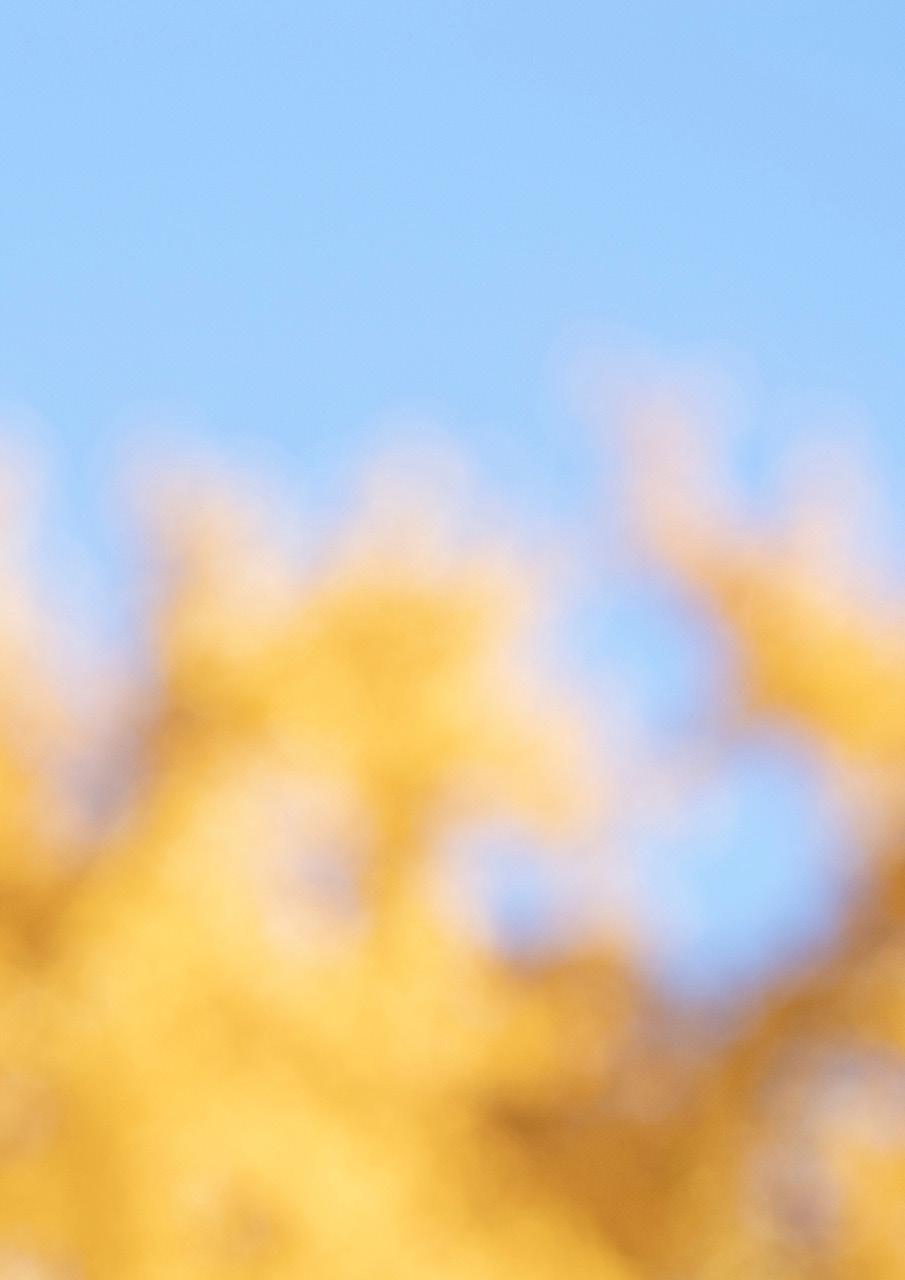
Cameron Temple is from Brookhaven, MS. She graduated with a Bachelor of Arts in English in May 2020 and will graduate with a Master of Arts in English in May 2022. Post-graduation, Temples hopes to become a community college instructor and eventually obtain a Ph.D.
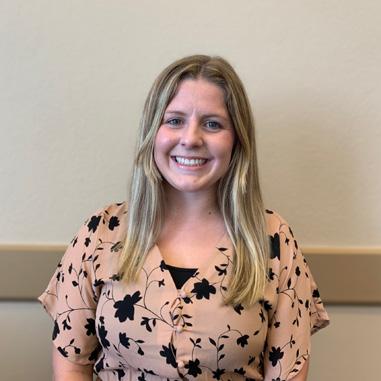
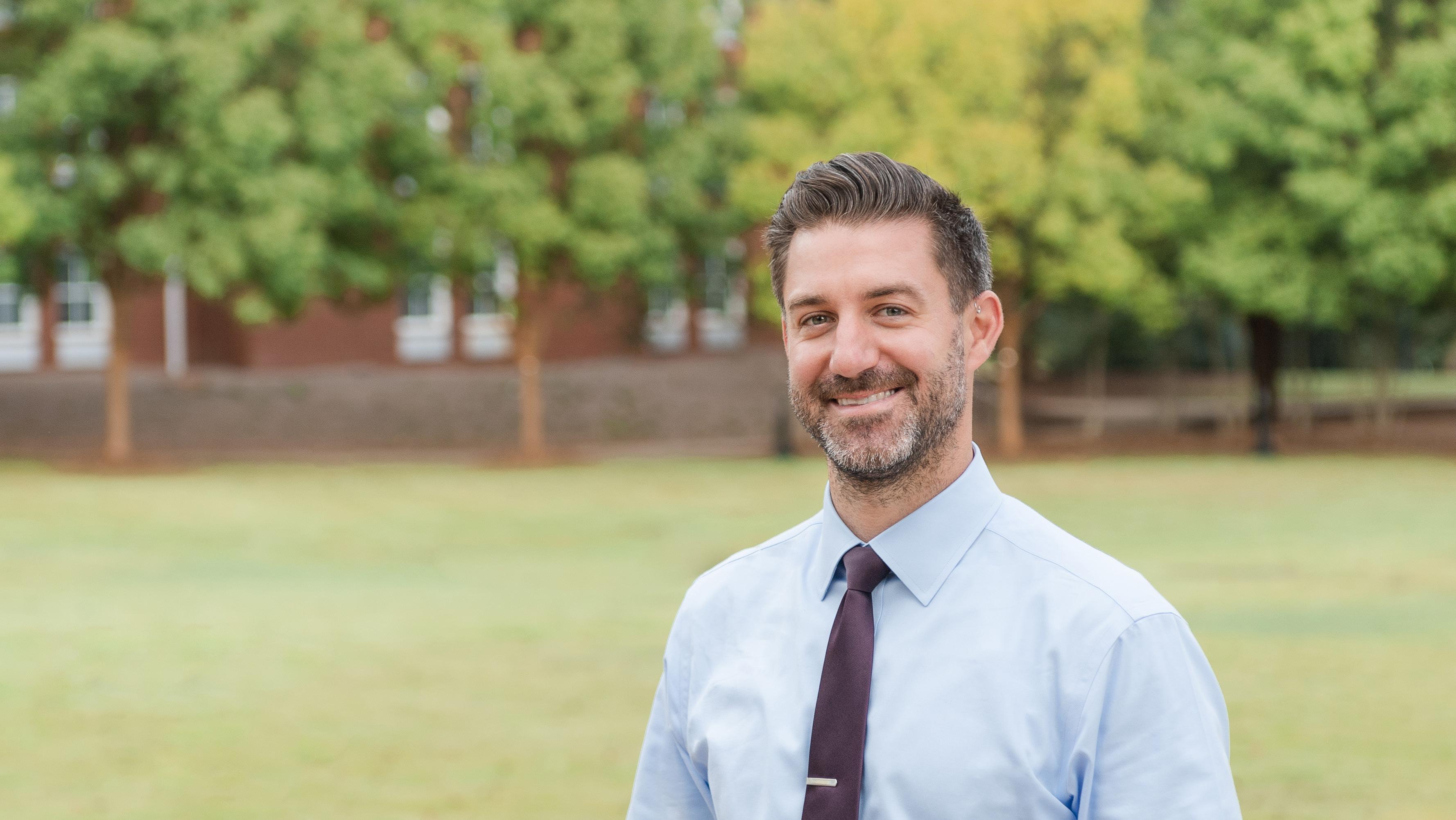 by Anthony Coffman
by Anthony Coffman
Satire: the use of humor, irony, exaggeration, or ridicule to expose and criticize people’s stupidity or vices, particularly in the context of contemporary politics and other topical issues; literary genre
(Oxford English dictionary, 2021).
and faculty fellow in the Judy and Bobby Shackouls Honors College, has offered a new interpretation of satire, shifting it from a literary genre to a rhetorical practice.
Vivier’s recently published article, “What Satire Does: Lessons from the English Renaissance for the Great Age of American Satire” published in the journal Genre: Forms of Discourse and Culture, compares contemporary American satirical works to those from the English Renaissance. His findings demonstrate the similarities he found in satire across time suggesting satire should be viewed as a rhetorical genre.
“The easiest way to understand rhetoric is the art of persuasion,” he explained. “There are other ways that word has been used over the past couple of hundred years, but if we think about rhetoric in terms of persuasion, then we can understand the ways in which satirical texts are trying to act on us. They are trying to make us ‘think’ a particular way rather than ‘act’ in a particular way.”
Satire is pervasive in American culture, from television shows, talk shows, satirical magazines, social media and everything in between. By examining what satire does— both intentionally and unintentionally— Eric Vivier, associate professor of English
“There is evidence of uses of satire in ancient Irish, ancient Arabian, ancient Greek and ancient Asian cultures. It’s one of the uses of art. It is a fundamental way we use expression. As much as we use creative expression to celebrate the beautiful, we also use creative expression to belittle and debase the ugly or unacceptable,” Vivier said.
Vivier said satire is overt in its attempts to persuade an audience. “Creative expression doesn’t seem to always have an overt political purpose, but satire does, and that’s the thing that I really want people that read my essay to understand—these texts are trying to accomplish something. They are written by people who have particular political views and goals. The danger of thinking about satire as a literary genre is to think of it in this inert sense.
“For a long time, particularly in American literary criticism, the idea was ‘art for art’s sake.’ It was literature that had no social
purpose and existed in its own aesthetic realm. I don’t think that is true for satire. People are trying to accomplish some kind of social or political goal, and they’re using creative expression to try and accomplish that goal.”
Vivier said he has always been interested in humor, noting contemporary satire focuses on humor.
“So much of American humor within the last 30 years has taken an ironic, and in many instances, a satirical turn. I really liked The Onion [satirical newspaper] when I was in high school. It became an online thing in the late ‘90s. I came across it and thought, what is this thing? This is so funny!”
Vivier’s comparisons of satire from the early modern era to contemporary works now have culminated in his recent journal publication, a paper Vivier has deemed his “manifesto,” one that offers a new definition of satire by showing the ways the same dynamics from the 1590s and early 1600s are happening today. It also explores the beginnings of pushback against “the great age of American satire.”
Vivier said many satirists are “surprised” at the pushback they receive for their art.
“That’s why in so many satirical texts you see para-texts, like introductions or comments in the margins, where satirists have written remarks to defend themselves. Sometimes you can see satirists genuinely frustrated by the negative reaction they get for doing something they thought they should do.
“Always in the back of my mind, there seems to be this looming question of ‘is satire a good thing or a bad thing?’ When I started working on satire, I was pretty convinced it was a good thing, and for a long time, I was trying to show that satire was productive. I think throughout time I have become more, or at least equally, interested in the opposite question about the ways it’s not productive.
“I think it’s going a step too far to say satire shouldn’t appear. If you ban satire, you’re going to find more satire. It’s always going to be there, but I think its popularity is going to ebb and flow.”
Because of its polarizing effect, Vivier said consumers should always view satire through a critical lens. Not doing so poses two dangers, he said.
“The reader may overestimate how successful a satirical attack convinces society at large, causing the reader not to realize how popular that target may still be to others. Also, the reader may underestimate how much the satirical attack is influencing their own beliefs.”
While studying abroad this past summer with honors students in Oxford, England, Vivier taught a class called English Satire and Its Discontents. He said the students seemed enthusiastic about the topic “because it’s funny and makes us laugh, and it can make us critical of things that we should be critical about.”
“It can grab someone’s attention and make people engage with an argument in the way a lecture or sermon or a political speech can’t because there’s something about creative expression that we respond to in a different way. Satire can be effective, but if someone is going to produce it they need to be critical about what they are doing.
Noting that politics have always existed in satire, Vivier points to the contemporary satire of Jon Stewart and Stephen Colbert, which has a more liberal slant, but also the 18th-century satire of Alexander Pope and Jonathan Swift, which leaned in a conservative direction.
“The benefit of doing this trans-historical work is that you can see that satire is a tool that can be used in a variety of ways,” Vivier said. “I think satirists almost always are convinced they are doing something right— that they are defending a good cause.”
Vivier earned his Ph.D. in 2014 and his master’s degree in 2007, both from the University of Wisconsin-Madison. He earned his bachelor’s degree in 2005 from Duke University.
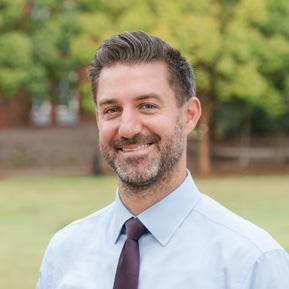
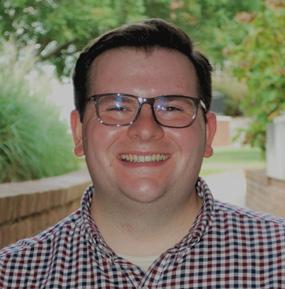
At MSU, he specializes in early modern English literature, with a particular focus on satire. He teaches classes on Shakespeare, early British literature, and the honors “Quest” classes— freshman/sophomore seminars in the liberal arts. He is also the faculty director for The Streetcar, MSU’s undergraduate creative arts journal and is writing a book about early modern English satire. He was awarded the College of Arts and Sciences Teaching Award in the Humanities for 2019.
ABOUT THE AUTHOR:
Anthony Coffman is originally from central Illinois and has been living in Mississippi for six years. He received his bachelor’s degree from MSU in secondary education with an concentration in English and is currently pursuing a master’s degree in English with a creative writing concentration. He plans to graduate in the Spring 2022 and afterwards teach high school and write fiction.
2018 article in the journal Advances of Archaeological Practice came out that surveyed archaeologists across the southeastern U.S. The findings revealed that 66% of the participants have either experienced sexual harassment or witnessed reportable offenses. That number is far above the national average of sexual harassment and assault. Thus, further research is necessary to understand why sexual assault and harassment is so prevalent in archaeology.”
“The other reason I feel this research is necessary, which is on a more personal level, is that being a member of LGBTQ community I have also experienced and witnessed sexual harassment and assault throughout my career,” Lambert said. “This needs to change and that is what we will do with this research.”
Lambert said he sees offensive behaviors being normalized during undergraduate field schools.
“Undergraduate field schools are usually students’ first experiences being in the field in a group, with many they do not know and in an area with which they are not familiar. This can create a climate where sexual assault and harassment can occur.”
For his research project—funded by a three-year $300,000 grant from the National Science Foundation’s Division of Undergraduate Education—Lambert said he wanted first to understand the issues in various field school settings, working to develop a set of best practices so field directors and students can create and maintain a safe and inclusive field school.
“Our research results have direct applications—applications that other archaeologists or anyone who runs a field school could implement in order to create a more supportive environment for their students,” said Lambert. “The beauty of our research is that it has multiple applications that crosscut many STEM disciplines.”
Assistant Professor Shawn P. Lambert is halfway through a three-year research study into preventing sexual harassment
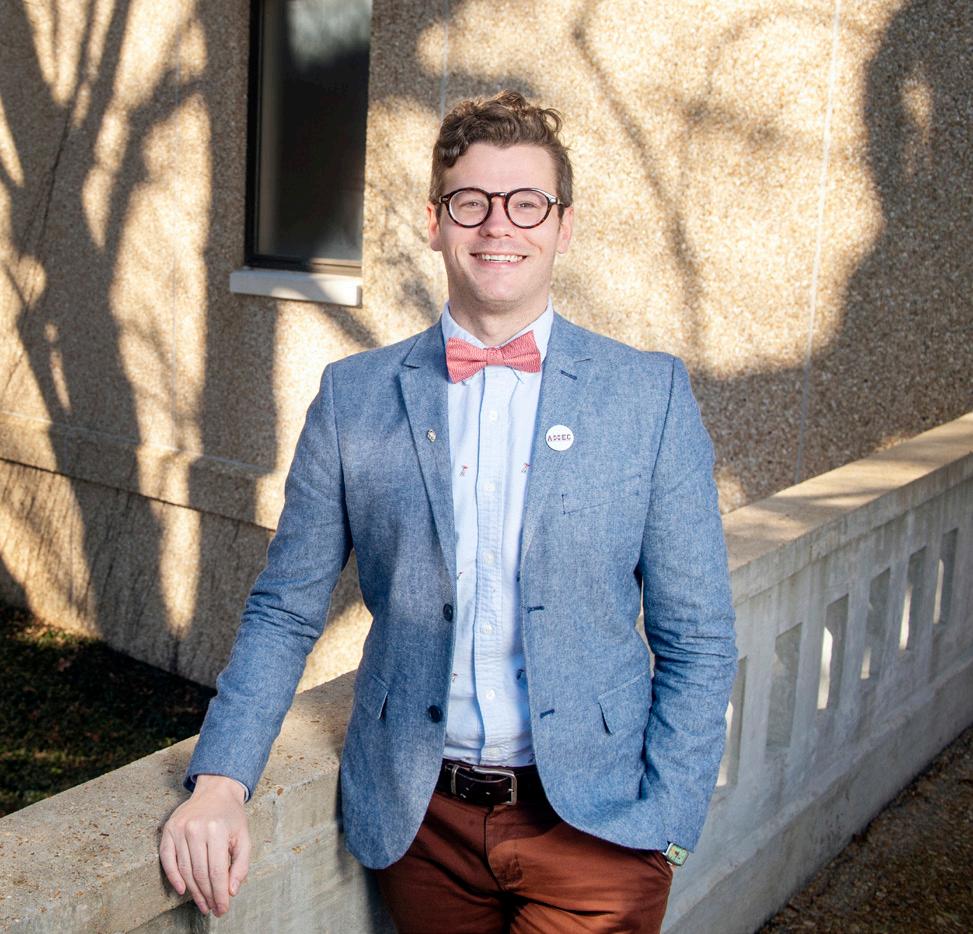
“in the field”—both in the general field of archaeology— and in the literal field to which he and his students travel for excavation projects.
“There are two primary reasons why I feel this research is necessary, not just in archaeology, but in all disciplines that have a field school component in the curriculum,” Lambert said.
“First, I did not realize the pervasiveness of sexual harassment and assault in archaeological field school until a
Researchers joining Lambert in the study include faculty from the University of Arkansas; Southern Illinois University Edwardsville STEM Center; and the Arkansas Archeological Survey–Southern Arkansas University Research Station. All are members of the Southeastern Archaeological Conference.
Lambert said the collaborating universities are placed strategically around the Southeast to facilitate the success of the program. “Ultimately, our team hopes to understand the critical components to develop a set of evidenced-based best practices that people in our field and beyond can utilize to prevent sexual harassment and assault,” Lambert said.
Sexual harassment is more likely to happen “in the field,” Lambert explained, rather than in the classroom because “the classroom is usually a much more familiar environment to students and they usually have a better understanding of the
MSU’s Lambert using $300,000 NSF grant to help prevent sexual harassment ‘in the field’
codes of conduct in an on-campus setting.”
To date, Lambert has measured archaeological self-efficacy and sense of belonging among students before and after participation in an archaeological field school using modified, validated instruments.
“Our findings suggest that students enter field school with a preestablished sense of confidence in their abilities to do archaeology, as well as a sense that they belong in archaeology. Among our respondents, students show growth in these two measures from pre- to post-participation.”
Lambert said the findings suggest that archaeological educators should consider creating more intentional interventions to strengthen students’ self-efficacy and sense of belonging in archaeology prior to their field school experience.
“Such interventions could position students for greater success earlier in their educational careers.”
Lambert’s research already has been featured in two peerreviewed articles in the journal Advances in Archaeological Practice. The research also was featured in Science Magazine, has been the focus of numerous webinars, and has been presented at several conferences such as the Society of American Archaeology, Southeastern Archaeological Conference, and the Society of Historical Archaeology.
How to make the field a safer, more inclusive environment is “the million-dollar question,” said Lambert. “Addressing these issues is something that we are still working on.
Field directors interested in the project can find more information at www.siuestemcenter.org/safe-field-schools or email safefieldschools@gmail.com.
A Tuscaloosa, Alabama native, Lambert joined the MSU family in 2019. He received his Ph.D. in 2017 and master’s degree in 2013, both in anthropology, from the University of Oklahoma. He earned his bachelor’s degree from the University of Alabama in 2011.

His primary research focuses on the early Mississippian period (ca. A.D. 800–1200). Lambert specializes in remote sensing and the analysis of ceramics, including design style, trace elemental analysis, and iconography to seek detailed histories of development, transformation, ritual integration, and movement of communities and interaction networks.
He has participated in recent projects across the Southeast that focus on Indigenous archaeology—using the power of archaeology to collaborate and help answer important questions from an Indigenous perspective that values their histories, lived experiences, and cultural heritage.
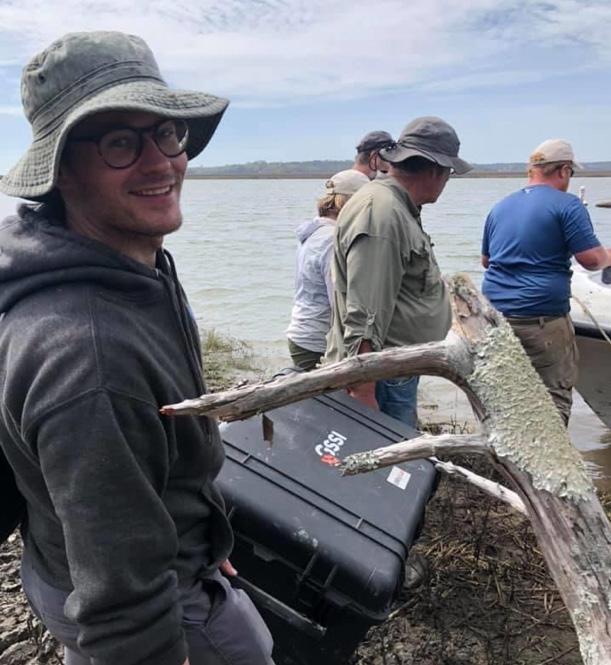
With two years of the pandemic to review and study, Mississippi State Department of Political Science and Public Administration Assistant Professor Julius Nukpezah is focusing current research on the plight of the homeless and how the pandemic has spotlighted concerns for vulnerable groups.
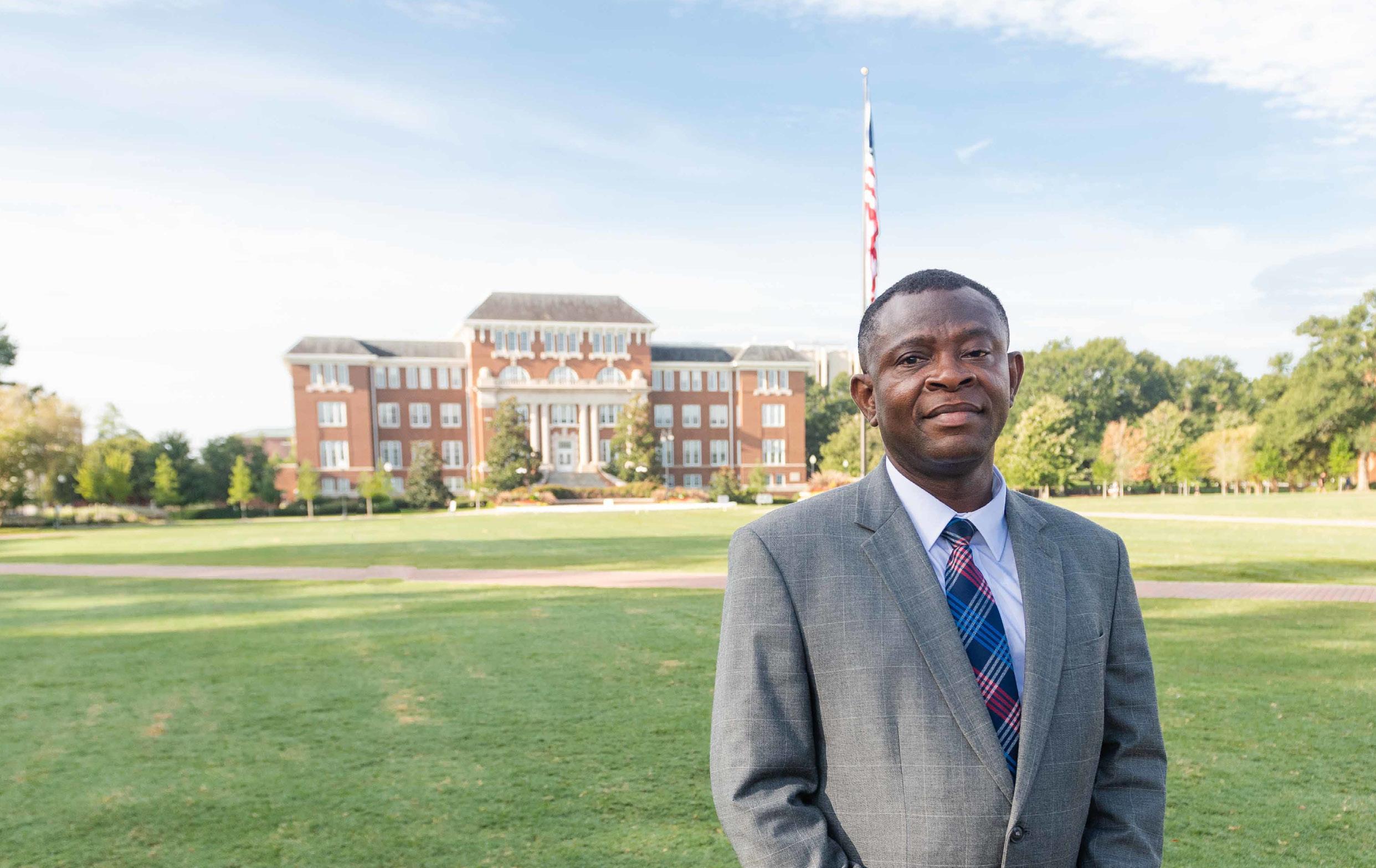
“Though COVID-19 has impacted society and prompted scholars to start investigating how to respond to the pandemic, little to no attention is being given to the plight of the homeless. Given my interest in special populations, Dr. Abraham Benavides, from the University of North Texas, and I have teamed up to investigate the challenges the homeless face and offer suggestions on how to address problems,” said Nukpezah.
In addition to investigating state and local government financial management, Nukpezah studies groups that are
vulnerable and are adversely impacted by social, economic and traumatic events. This group includes children, women, single parent families, people with disabilities, minority groups, immigrants, the poor and homeless.
Nukpezah’s current research with his UNT colleague is focused on Dallas, Texas, as a case study. Their work seeks to:
—Draw attention to the challenges the homeless face in society, especially with the ongoing pandemic.
—Assert that subsidiarity principle—the principle that a central authority should perform only those tasks which cannot be performed at a more local level—should be a framework for responding to the crisis the homeless face, and that there should be a concerted effort by all levels of government.
—Report about what cities are doing across the U.S. to combat the challenges.
—Illustrate how federal, state and local governments can work
together to address local challenges faced by the homeless.
Nukpezah’s research into the plight of the homeless amid COVID-19 has been published in a special issue of the peer-reviewed journal American Review of Public Administration. For more, visit https://journals.sagepub.com/doi/ full/10.1177/0275074020942062.
Using subsidiarity principle as the context, Nukpezah’s research reviews the role of the U.S. Department of Housing and Urban Development and its Continuum of Care program, as well as the role of the Centers for Disease Control and Prevention during public health emergencies.
His paper also was presented at the Conference on Minority Public Administrators last year.
Nukpezah said his research suggests all levels of government should work together to “allocate responsibility where it would yield the most efficient result,” meaning local government should handle local affairs if they know best how to address the concerns, turning to state and federal support only when those groups can provide assistance a local municipality does not have resources to offer.
“Public administrators should learn from other cities in addressing homelessness,” Nukpezah said. “For instance, Dallas, Texas, has a different homeless population than Starkville, Mississippi. If our local homeless population swells, it would be wise to look to a larger city to see how they handle the problems rather than reinvent the wheel. Thus, the Dallas, Texas, case study informs my current research on how small states such as Mississippi can address the challenges that homelessness presents.
“Political Science and Public Administration is about what governments do, why they do what they do, and if the actions of government make any difference,” said Nukpezah, who works diligently with his current students to
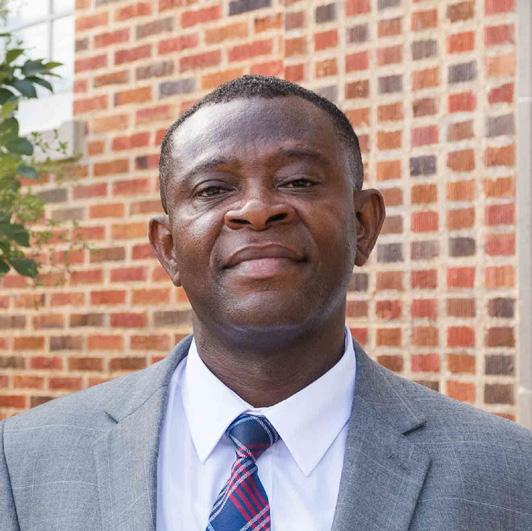
ensure they are well-equipped to help their communities in the future.
Nukpezah teaches in the graduate public policy and administration program and helps students understand “that government affects every aspect of our lives, from trash collection, utility provision, and provision of public goods such as road and street lighting.”
“We also teach professionals to become competent public managers who promote public interests and espouse public values,” he said. “Our doctoral students become faculty members who then work to impact society through research and teaching.”
Nukpezah currently is involved in two research projects totaling more than $1.5 million with funds from the U.S. Agency for International Development and the U.S. Department of Agriculture. His work examines avenues for empowering the youth and women in Africa and to increase access of agricultural produce from African countries to developed country markets like the U.S.
“We are interested in financial and economic resilience for vulnerable groups and communities,” said Nukpezah, whose expertise is found in the more than 40 journal articles, book chapters, policy and media articles, and technical reports he has published based on research designed to inform government policy decisions.
“I am excited that my research and teaching contribute to improving society. I help prepare public management professionals for public service careers, and also I train doctoral students to become scholars and researchers, helping prepare them to lead through traumatic events.”
For more information about MSU’s Department of Political Science and Public Administration, visit www.pspa. msstate.edu.
Nukpezah began a career in public service in his home country, Ghana, where he was a senior policy advisor at the Ghana Ministry of Food and Agriculture and coordinated a youth program in agriculture. His Ghana agriculture program was a collaboration with several international agencies active in rural economic development, including the countries of Japan, Germany, China, India, the Netherlands, the U.S. and multiple African countries. In 2011, he accepted a teaching and research fellowship position at the University of North Texas where he earned a Ph.D. in public administration and financial management. He joined MSU’s faculty in 2016. His research focuses on state and local government management and finance. He examines the intersection between poverty alleviation policies and rural economic development. In 2020, Nukpezah was named a Dean’s Eminent Scholar in the social and behavioral sciences for the College of Arts and Sciences. He was named the Outstanding Graduate Professor in his department in 2018.
Mississippi State Professor Michael E. Brown, a longtime faculty member in the university’s Department of Geosciences, has been named the inaugural recipient of the Dr. Charles L. Wax Endowed Climatology Faculty Fellowship—the first fund of its kind for the College of Arts and Sciences.
Endowed in December 2020 with a $100,000 gift from former MSU student Bruce Thomas—who today is the chief meteorologist for the News-Press Gazette TV station in Saint Joseph, Missouri, and a consultant for Weather2020—the fellowship is named in honor of Professor Emeritus Charles L. Wax, a former geosciences department head and faculty mentor for both Thomas and Brown. Thomas also was named an MSU Alumni Fellow.
One in three of today’s on-air broadcast meteorologists is a graduate of MSU’s nationally recognized broadcast meteorology program,
which Wax helped establish. In 1979, the Starkville native created and taught the first program course, Introduction to Meteorology, and he continued until his 2013 retirement after 35 years of service.
MSU Provost and Executive Vice President David Shaw, College of Arts and Sciences Dean Rick Travis and Department of Geosciences Department Head John Rodgers selected Brown as the inaugural recipient of the prestigious award.
“It is an extraordinary honor to be the first recipient of the Dr. Charles Wax Endowed Climatology Faculty Fellowship,” Brown said. “Dr. Wax was a pillar in our department and, to this day, I consider him a close friend and mentor. I don’t believe there is any award that could mean more to me than this one with his name on it. The fact that Bruce Thomas was compelled to provide the support to endow this award is a testament to the bond that Dr. Wax created with
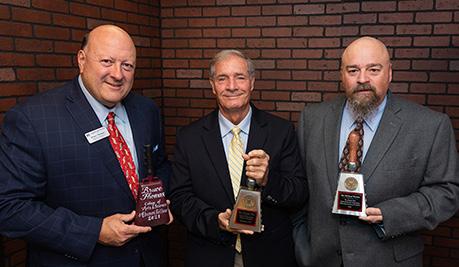
his students and colleagues. Mr. Thomas and Dr. Wax are two exceptional men, and I am honored to be linked to them through this award.”
A native of Sherrard, Illinois, Brown is Mississippi’s state climatologist, serving local and state government entities while also participating in research to enhance the safety of Mississippians.
In 2010, Brown and then-state climatologist Wax developed a hazard mitigation plan for the university, still in use today by MSU and other public universities and colleges. During severe weather events, Brown works with MSU’s Crisis Action Team to ensure warnings and safety information are shared with the community. He also frequently monitors the weather for university athletic events.
Brown trains the next generation of weather professionals in his MSU radar meteorology, mesoscale meteorology, advanced mesoscale meteorology and field methods/storm chasing courses.
He earned his Ph.D. from the University of North Carolina at Chapel Hill in 2000, master’s from MSU in 1995, and bachelor’s from Western Illinois University in 1991. Brown joined MSU’s faculty in 1999.
The geosciences department also provides an operational meteorology program, which today regularly places graduates with the National Weather Service, private consulting firms, military branches and educational programs. Kenneth Graham, current director of the National Hurricane Center, is a 1994 graduate of MSU’s meteorology program.
MSU’s Department of Geosciences teaches more than one-third of the university’s distance learning credit hours and is the only educational entity in the state that combines climatologists, geographers, geologists, geospatial experts and meteorologists in one department. For more information, visit www. geosciences.msstate.edu.
The Dr. Charles L. Wax Endowed Climatology Faculty Fellowship is an open fund with the MSU Foundation. To contribute to the fellowship fund, contact Sara Frederic, director of development for the College of Arts and Sciences, at 662-325-3240 or email sfrederic@foundation.msstate.edu.
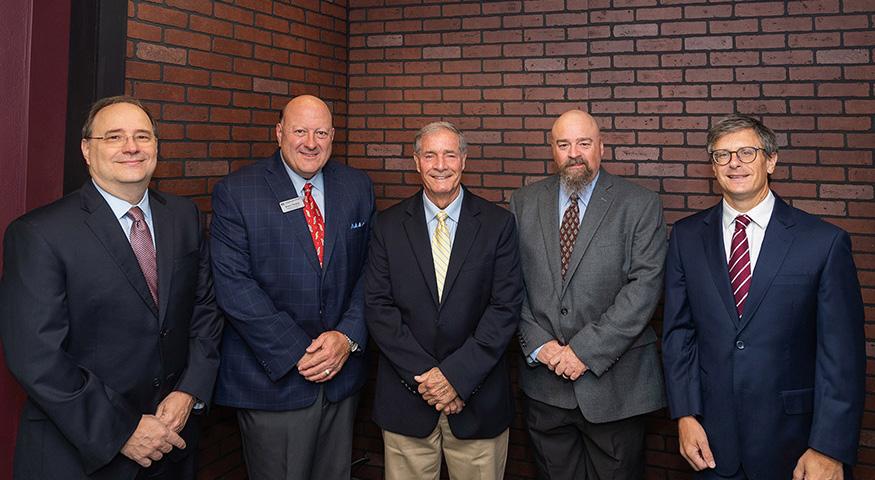
“The climate of the human heart has grown cold to nature,” said Tonya H. Hays, an award-winning playwright and Mississippi State communication faculty member. “The health of our oceans is in peril. All life has been born from the all-embracing mother sea and we live on islands surrounded by the sea. We must recognize the damage that we have done to the oceans and protect them. Human life depends on the health of the oceans.”
Hays’s passion for marine life and a collaboration with the Northern Gulf Institute led to an original MSU musical production this past fall highlighting the dangers marine animals face from plastic pollution, oil spills and climate change. Hays’s
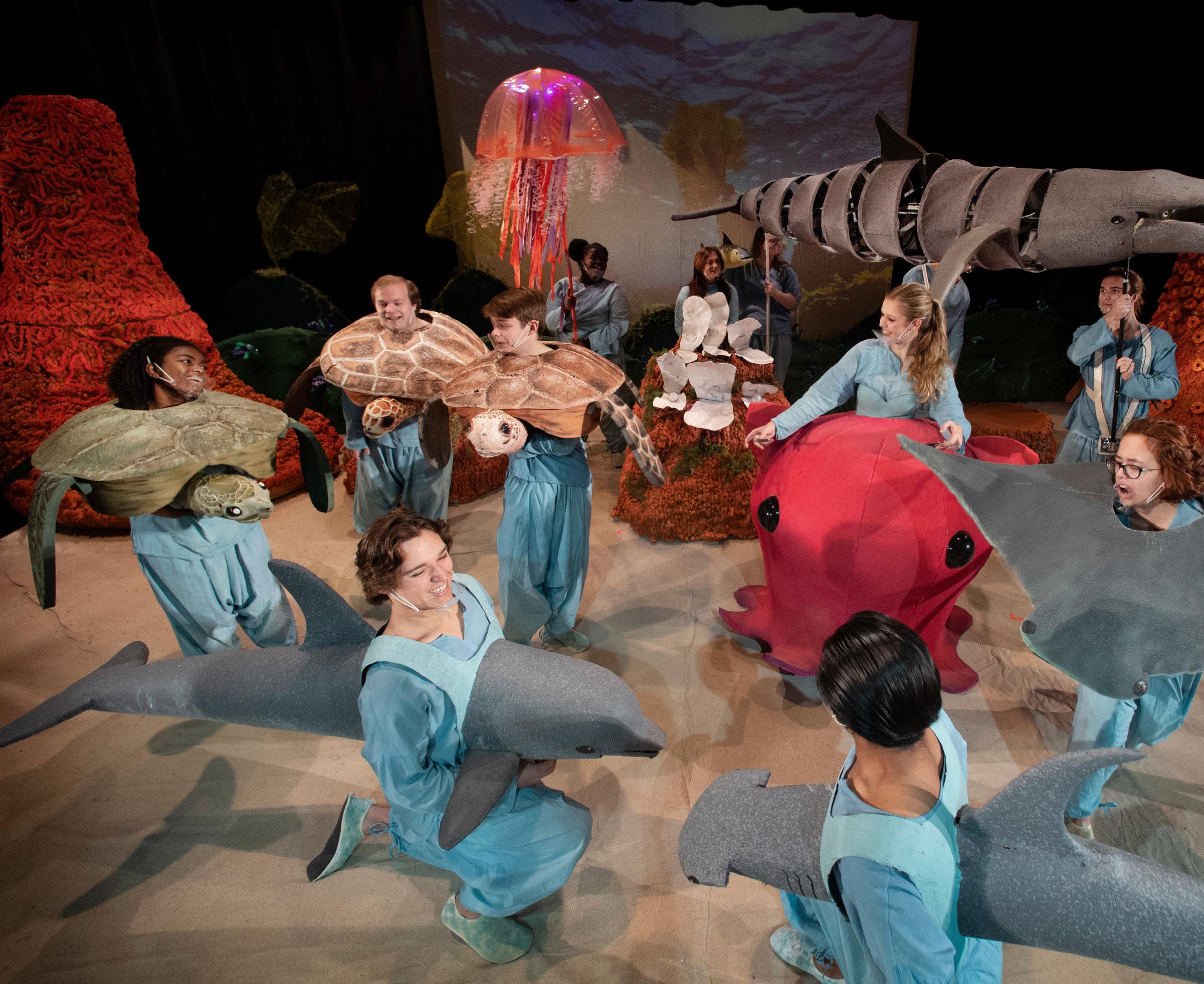
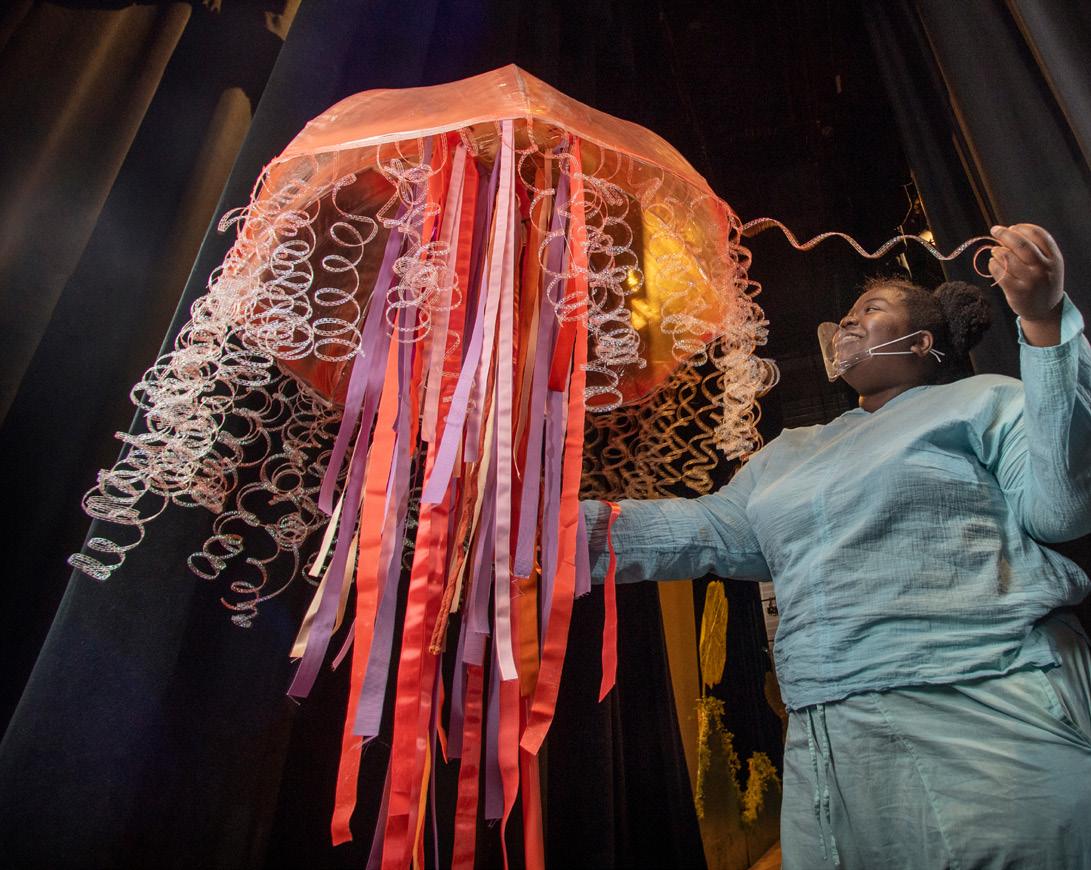
original work offered ways the audience—from young to old— can help turn the tide on ocean pollution.
Written by Hays—along with Jonathan Harris, the Northern Gulf Institute education and outreach director and university marine scientist—the musical play held in MSU’s McComas Hall, “Banner—A Sea Turtle Saga,” follows the tale of a green sea turtle named Banner and his sea-creature friends as they adventure through the ocean.
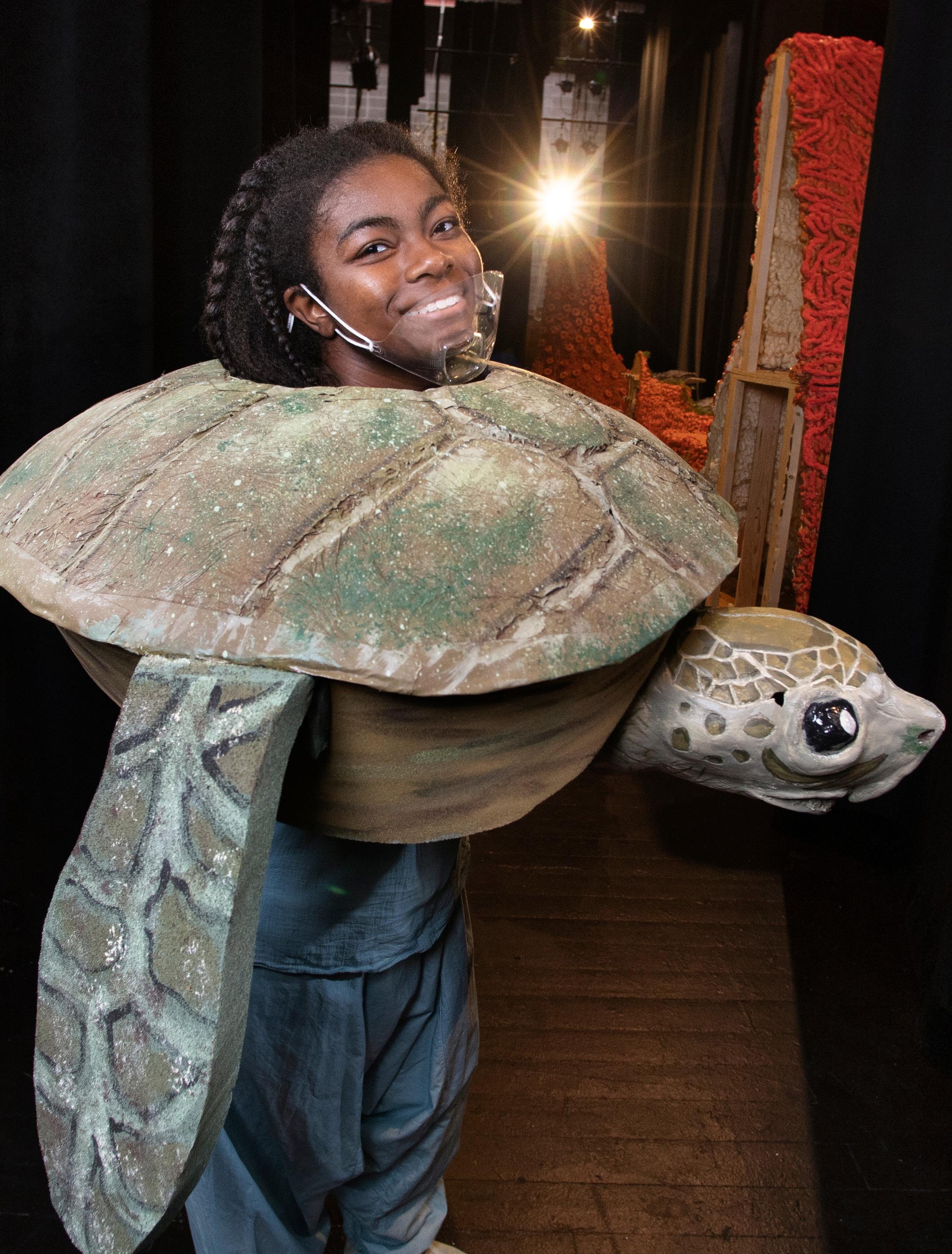
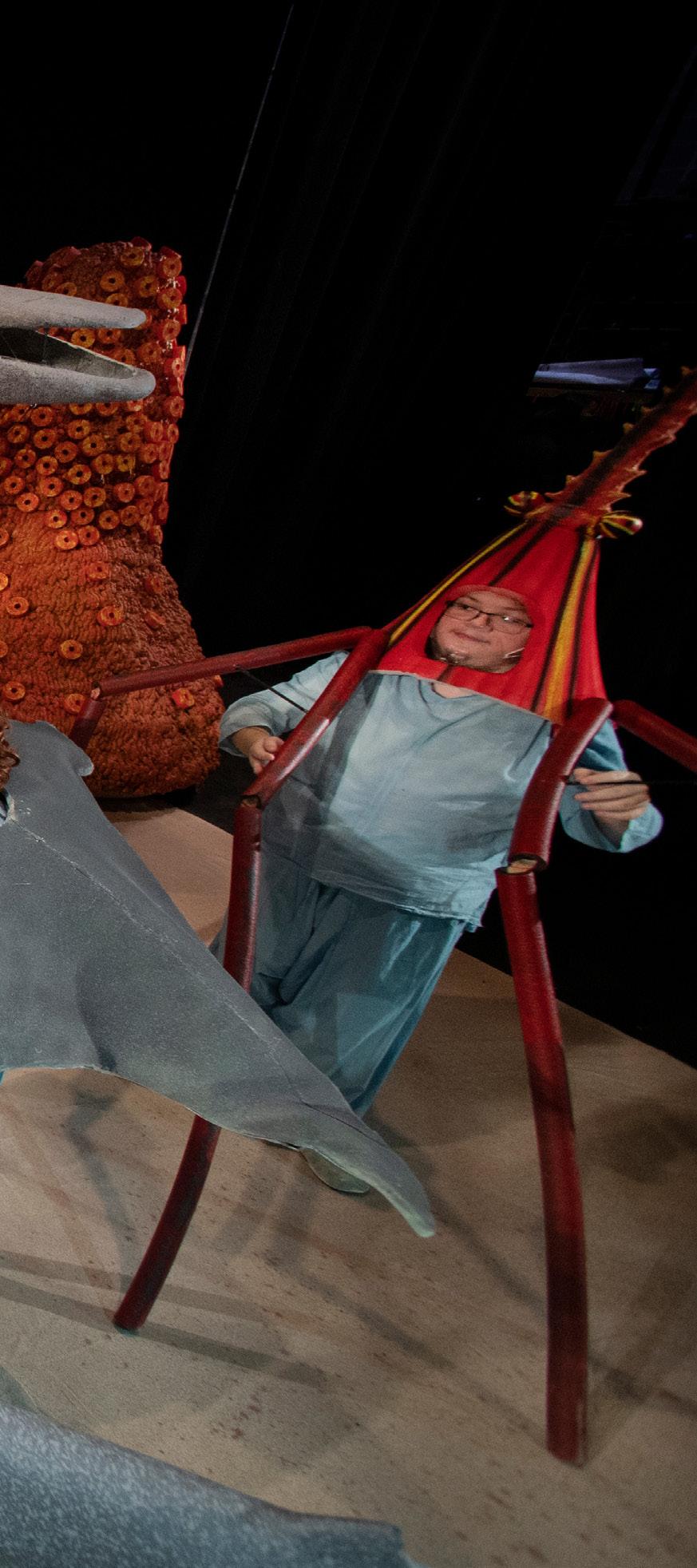
“Throughout the school performances, it was obvious the children loved the sea creatures,” Hays said. “They were very engaged with releasing the sea turtles and sending them back
out into the ocean. The immersive nature of the show had the audiences involved in creating a hurricane, experiencing a theatrical oil spill and chanting ‘rescue, rehab, release.’”
Hays said the audiences enjoyed the original music created by Curtis McMurtry, Diana Burgess and Aubrey Hays, all professional musicians, singers and composers in Austin, Texas, who wrote the songs and recorded all the tracks.
Costumes were designed by Melanie Harris, an MSU communication instructor, and Tim Baker, a guest artist invited to MSU’s campus in the fall. Baker is a professional sculptor, propmaker and special effects artist who has
worked with Marvel Studios and Universal Orlando on multiple film projects.
Hays said Baker is “an amazing artist” who has created puppets and designed for film and theme parks across the world.
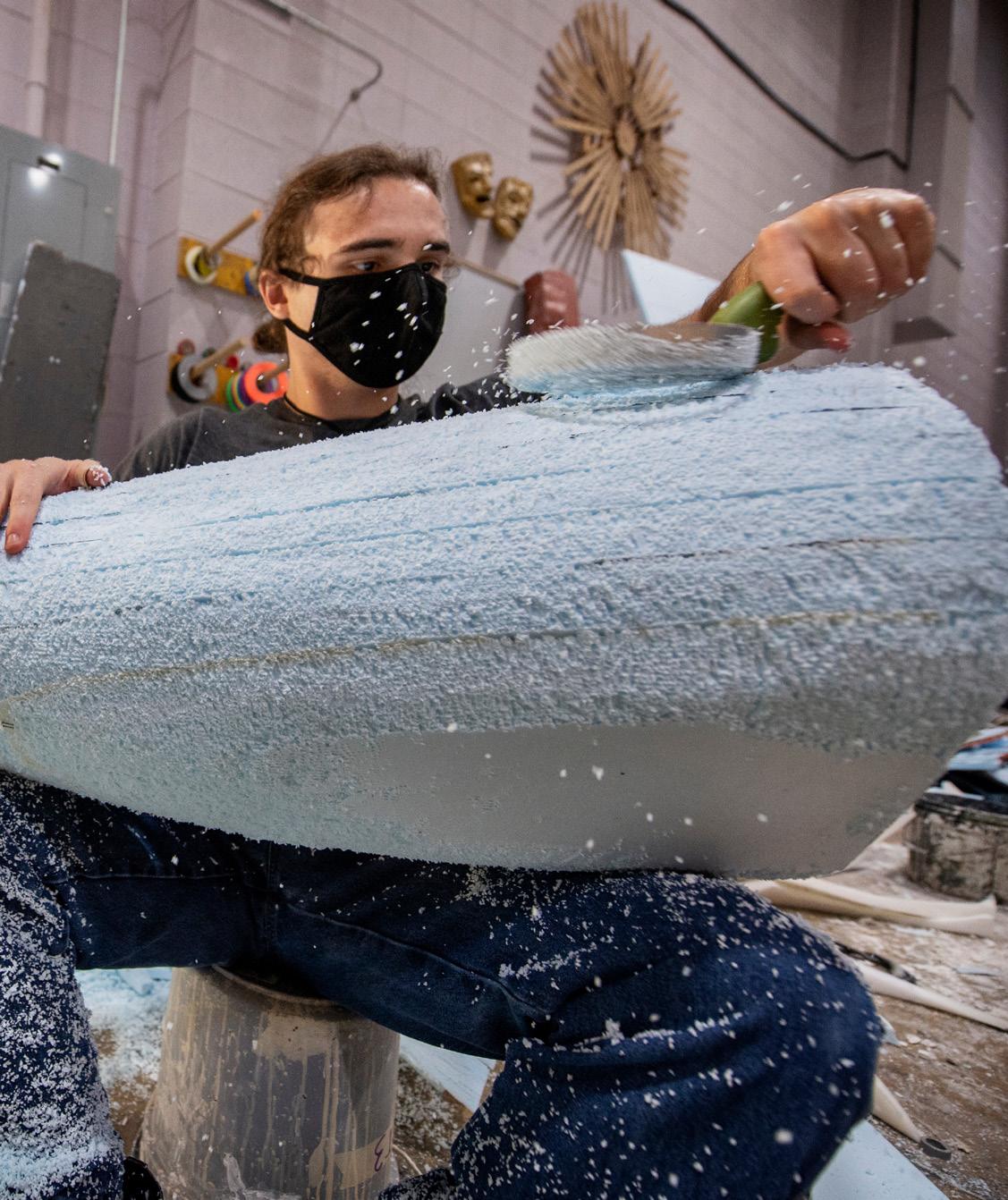
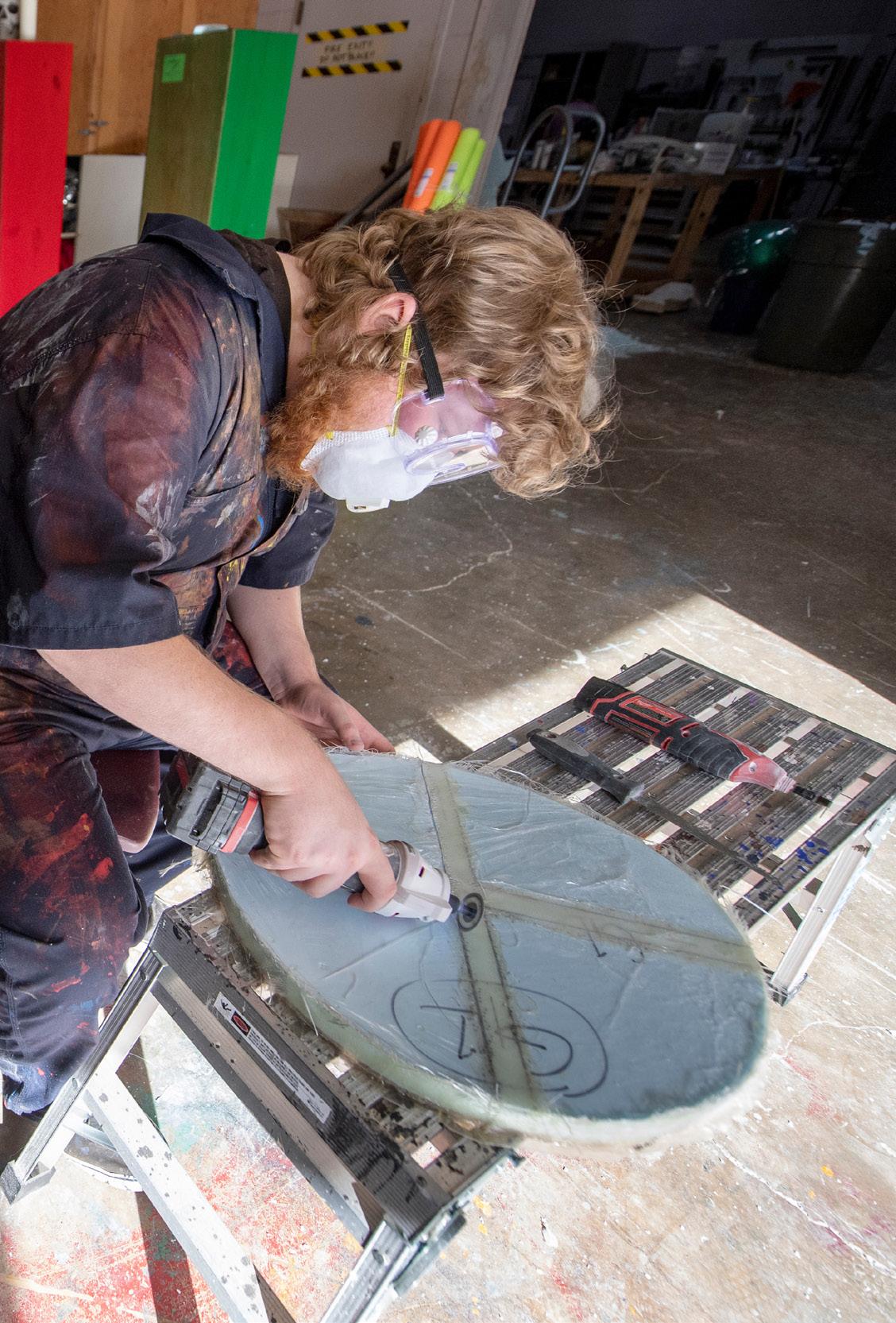
“Tim communicated with us for several months and sent proposed designs for the puppets,” Hays said. “He came in and watched a rehearsal and altered some of his original designs. He wanted to showcase the talents of our students through the puppets. Tim coached the students on puppet movement as well. Faculty and students all worked day and night in the shop with Tim crafting the puppets. His passion, patience and enthusiasm were inspirational. Melanie masterminded the jellyfish, oysters and seagulls while Tim masterminded the shark, whale, dolphin, crab, turtles, ray and octopus.”
Hays said, “Faculty members Matt Webb and Jesse Wade worked closely with Tim as well, ensuring that the puppets could interact easily with the set. The challenges of presenting the show in McComas and then taking it on the road to the Mississippi Aquarium were handled adeptly by faculty and students.”
MSU’s Northern Gulf Institute provided funding for the ensemble to participate in a late November presentation at the Mississippi Aquarium in Gulfport and at the Southeastern Theater Conference Fringe Festival in Memphis in spring 2022. NGI aims to inform and engage students, the public, and stakeholders about protecting the Gulf of Mexico ecosystem by relaying research findings in an understandable and accessible manner.
“Jonathan Harris and I have worked on another very successful and award-winning project with NGI in the past—‘Hello Opportunity.’ So when he suggested we do a play about the health of our oceans focusing on marine life in the Gulf of Mexico, I jumped at the chance. Melanie, John and I toured the Mississippi Aquarium and we were all captivated by Banner, a green sea turtle that is a resident there, who became the inspiration for our production.”
Hays, originally from Albuquerque, New Mexico, has been an MSU faculty member since 2020. She has a bachelor’s degree in theatre education from Oklahoma Baptist University and a Master’s of Fine Arts in Theater from Texas Christian University.
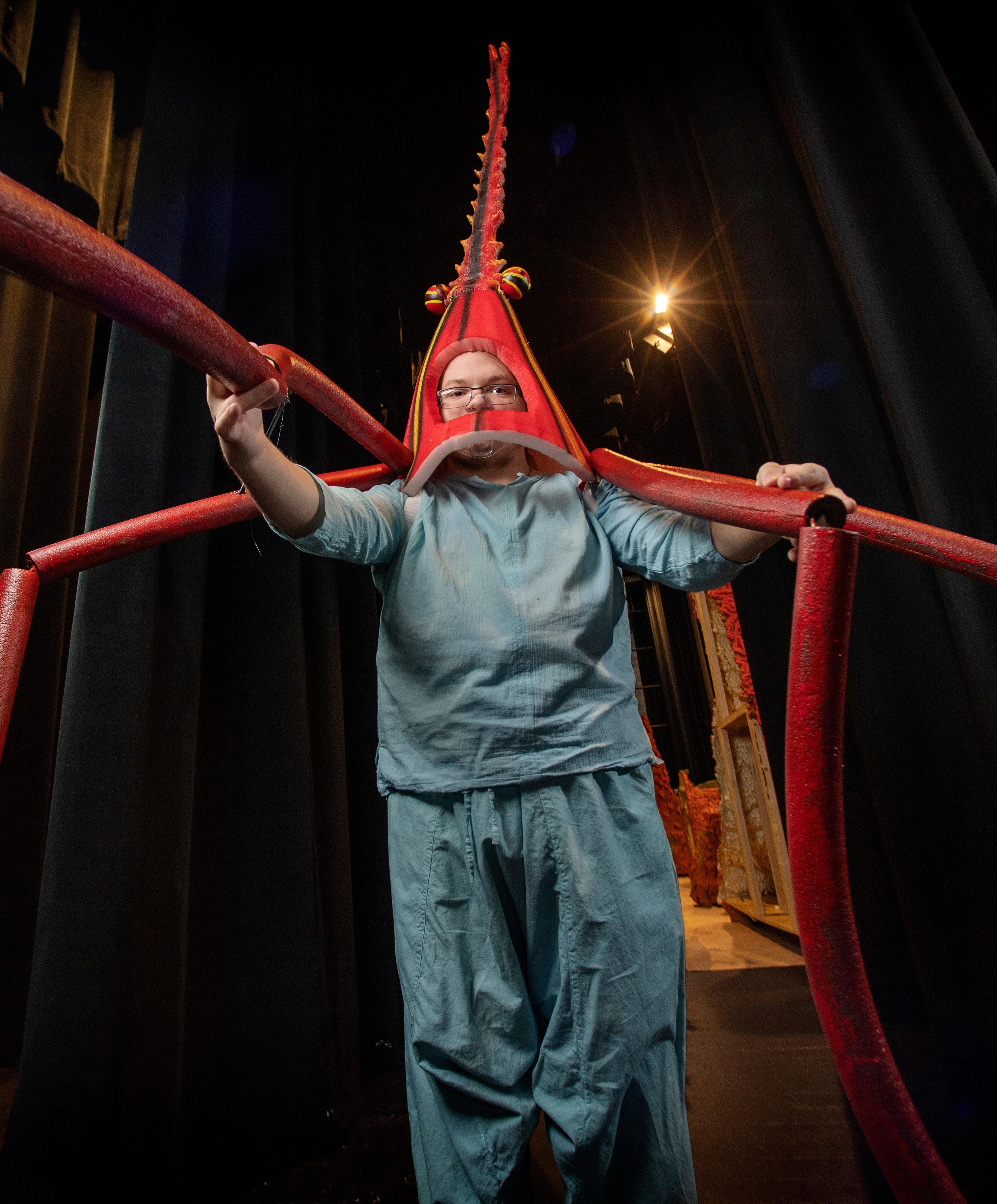 Chris Clemons, Junior
Chris Clemons, Junior
For decades, Ph.D. graduates at Mississippi State University have enjoyed special recognition at commencement— being “hooded” by their major professor, which signifies a successful completion of their graduate program.
But when all in-person MSU graduation ceremonies for spring 2020 were canceled and transitioned to virtual events because of COVID-19, the College of Arts and Sciences devised a system to recognize doctoral students for their academic achievements, albeit in a new format.
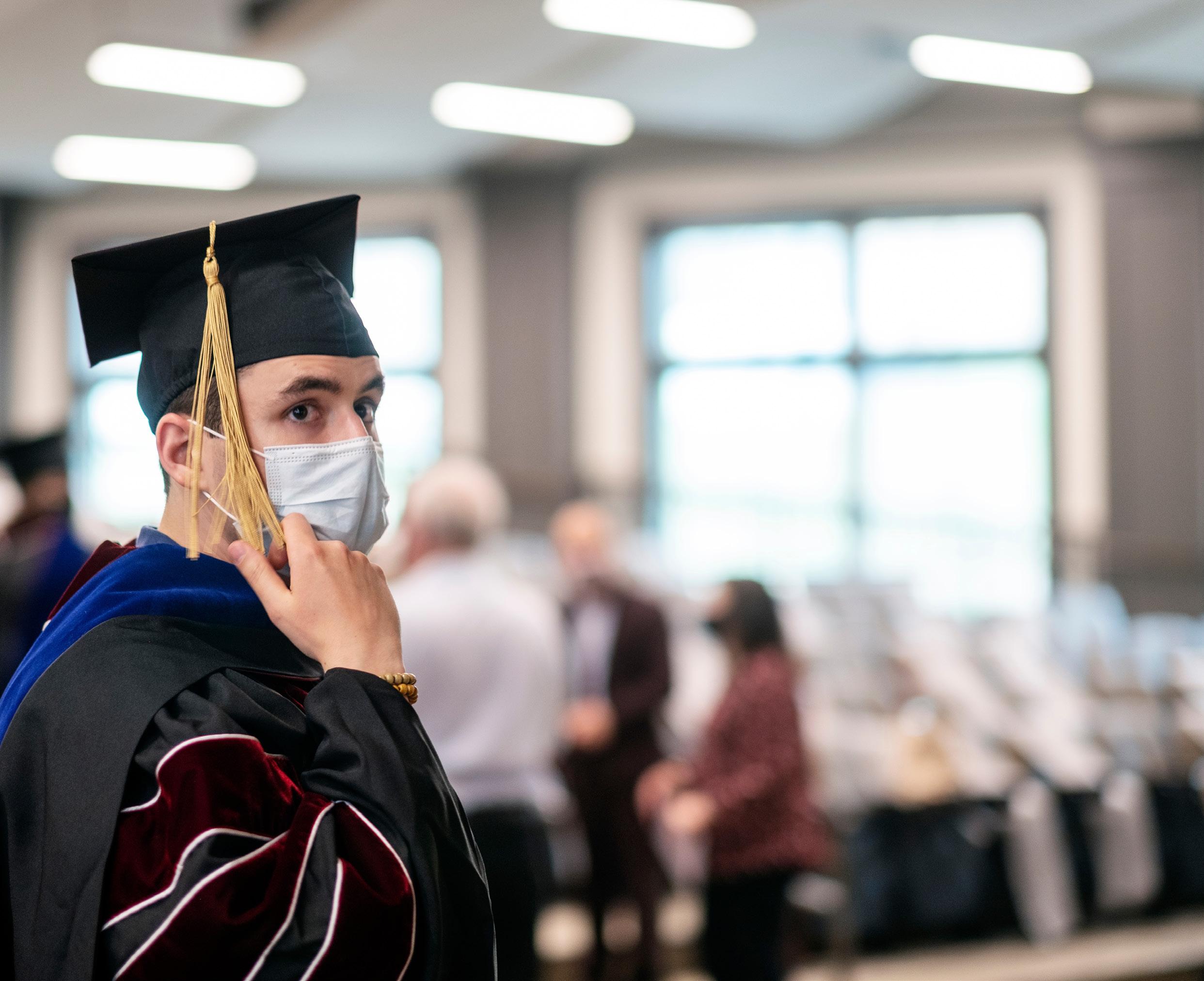
“Given that the public hooding component for the doctoral
students had been canceled for the spring 2020 graduation, we felt something else should be done,” said Rick Travis, dean of the College of Arts and Sciences. “We understood the enormity of completing all of the requirements for the Ph.D., especially the dissertation that often dominates the life of a doctoral student. We wanted to make sure that the students and their families had an opportunity to publicly celebrate the completion of this process.”
What began as a pivot, forced by COVID, became a new tradition—one of intimacy that allowed families the
opportunity to bask in the achievements of Ph.D. candidates.
In the fall of 2020, the College of Arts and Sciences hosted a private hooding ceremony for these candidates, their immediate families, graduate faculty and administration to celebrate the college’s spring, summer and fall 2020 doctoral graduates.
Travis, along with the college’s associate deans and graduate faculty, donned full academic regalia for the ceremony held in the large auditorium at MSU’s Old Main Academic Center. Each student received an introduction from the associate dean, their major professor was identified, and the title of their dissertation was announced.
One by one, the students came to a platform and were hooded by the dean and their major professor, while families cheered them on.
“The candidates were deeply appreciative of the ceremony and the public opportunity for them to receive this recognition in front of their families,” Travis said. “The families also were very grateful for the opportunity to attend and then to be included in photographs in front of the MSU seal. As one parent put it, ‘This picture becomes the long-term prompt that helps us remember this day.’”
Although campus graduation ceremonies began returning to a more normal format last year, the College of Arts and Sciences continued the private hooding ceremony for spring 2021 Ph.D. graduates—finding the intimate ceremony well suited for students and faculty alike.
“Certainly, the candidates and their families enjoyed the ceremony, and we enjoyed our ability to spend more time on stage celebrating each individual,” Travis said. “I know that the achievement of the individual is often not possible without the support of the family.”
“Additionally, the achievement is not possible without the support of the faculty who have guided the student,” he continued. “It was meaningful to me to be able to recognize the major professors and department heads. I know the work they put in and the ceremony provides us a way to thank them for their efforts.”
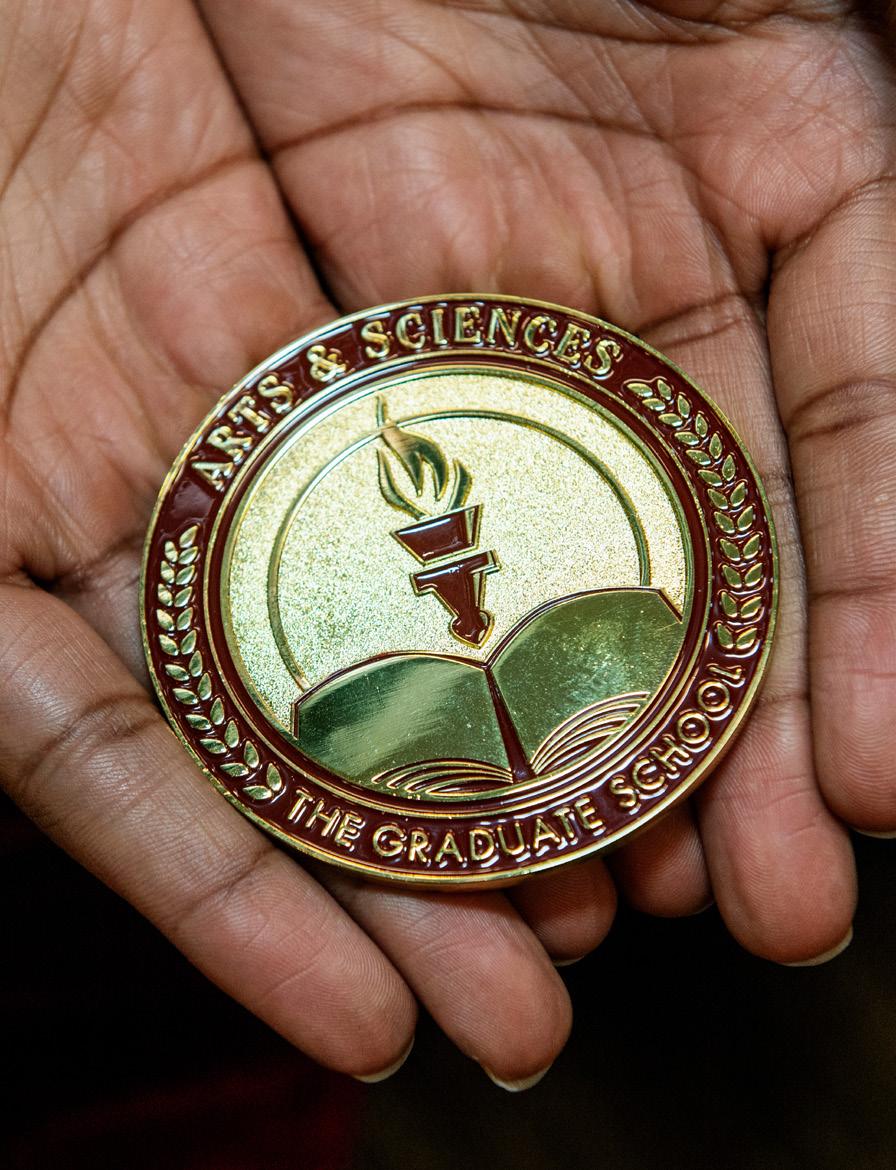
Building on the success of intimate doctoral hooding ceremonies, MSU’s Graduate School this year developed a university-wide doctoral hooding ceremony for all Ph.D. candidates, separate from MSU’s main commencement ceremonies.
Held at The Mill in December, the event included a reception hosted by the Graduate School and the Office of the Registrar.
Peter Ryan, executive vice provost for academic affairs and dean of the Graduate School, said this ceremony provided the chance to recognize achievements of doctoral students and their major professors.”
“The deans of all the colleges were on board with hosting the event to recognize our doctoral candidates,” he said.
Mississippi State University offers the Doctor of Philosophy (Ph.D.) and the Doctor of Education (Ed.D.), as well as the Doctor of Veterinary Medicine (DVM). These degrees represent the highest academic qualification that can be earned in the U.S. educational system.
Ashley Weaver, 49, isn’t new to Mississippi State. In fact, she first enrolled as a transfer student in the fall of 1992. In 1995, the fifth-year senior was burned out on her studies, about to get married and ready to head west for a new adventure.

With only two classes remaining to obtain her degree, Weaver set her sights on Colorado with the intent of taking those last two classes by correspondence. Those plans didn’t pan out.
“No web classes—you got the textbook, answered questions, and ‘snail-mailed’ your work in. Can you even imagine?” Weaver joked.
Then, life happened. Weaver married in 1996 and children soon followed. She and her husband of 25 years, Clint, are parents to three daughters, ages 20, 17 and 15. Her oldest is currently a communication major at Mississippi State.
Weaver has moved all over the West to Colorado, Wyoming, Texas, Oregon, and now Nevada, living on ranches with her horse-trainer husband and family.
“We homeschool and live on a 400,000-acre ranch in northern Nevada. The nearest town—and where I grab my mail—is an hour and 20 minutes away with 40 miles of dirt road,” Weaver said.
With her oldest child away at college, Weaver decided to apply to MSU and learn what she needed to finish her own degree. Finding out there was an online option was “a godsend,” she said.
In 2021 she enrolled in the newest MSU Online degree program—a bachelor of arts in communication with a concentration in public relations.
“I want to finish what I started,” Weaver said. “To check that off my list and know that I completed it. And maybe a small part is because my daughter is a junior at State and I don’t want her to earn her degree before I earn mine!” Weaver said.
Beyond her tongue-in-cheek competition to finish her degree before her daughter, Weaver is ready to enjoy the sense of accomplishment and credibility that comes with finally receiving her diploma.
For more about MSU Online, visit online.msstate.edu.

Mississippi State graduate student Jeremy Chase, a 20-year veteran of the U.S. Navy, relocated his family from the Pacific Northwest to the Naval Air Station Meridian in 2009. Five years later, he retired from the military at the age of 43 and began a new career as a college student.
When Chase retired in 2013, he planned to work on the flight line at the naval air station. Yet while waiting to fill out his discharge paperwork at the Veteran’s Administration in Jackson, he had an epiphany.
“I overheard several veterans talking about their past and showing pictures to one another and then they mentioned how difficult it was to find a therapist or counselor they liked at the VA. And it hit me—I could help them,” he said. “I’ve
always been a people person, and I could relate to them and understood the terminology. I realized right then maybe one day I could work with veterans, particularly those with posttraumatic stress disorder.”
With a plan in place, Chase got to work.
“I’ll be honest, when we moved from Seattle to Meridian, I never imagined we would have access to both a community college and a university like Mississippi State all in the same town. It has been a real blessing to our entire family,” he said.
When his son Tyler Chase graduated from Russell Christian Academy in 2017, instead of enlisting in the armed forces immediately, he took his dad’s advice and decided to earn a college degree first. While Tyler finished his associate degree
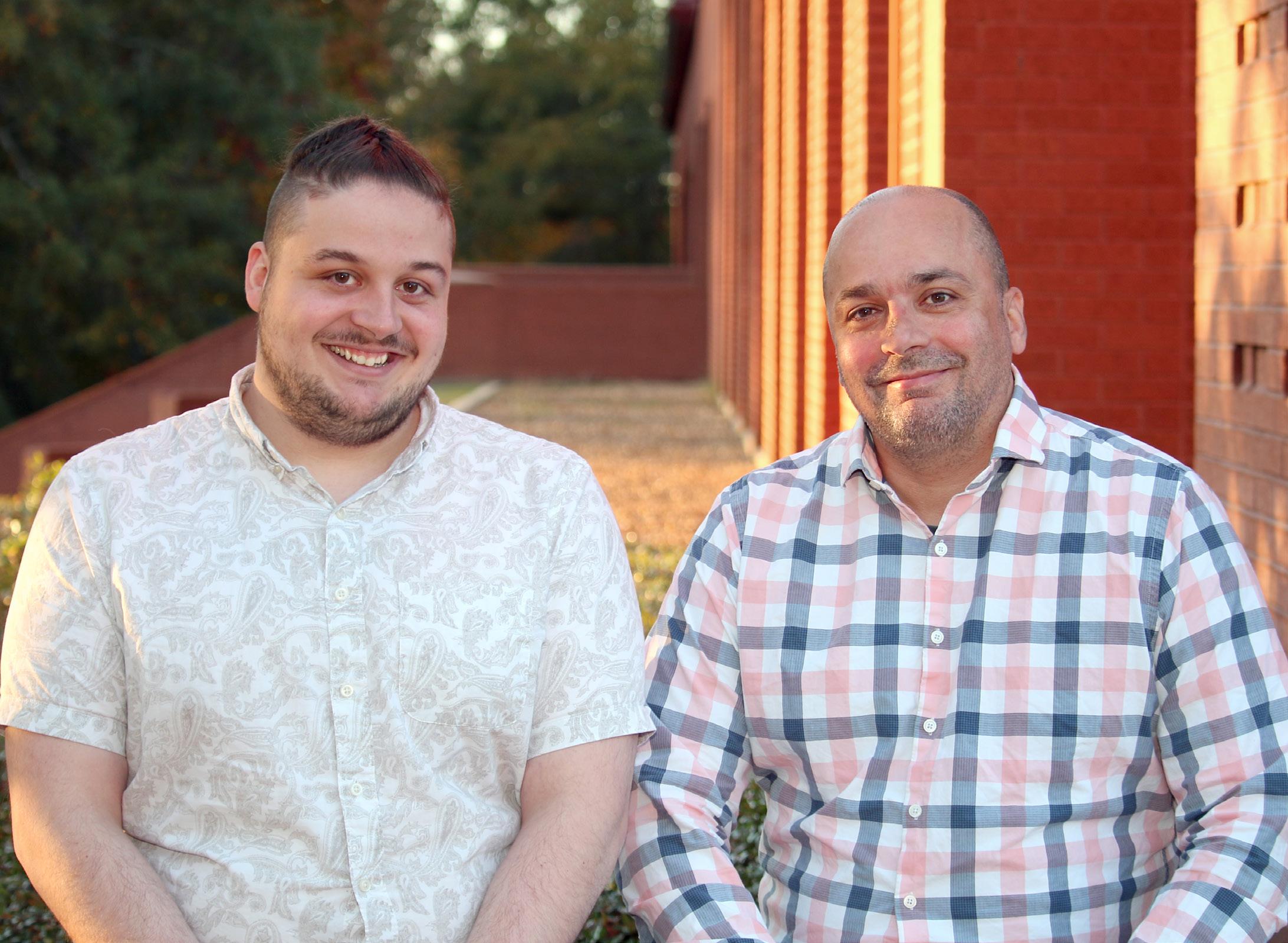
at Meridian Community College, his dad began taking classes across the street at MSU-Meridian.
The transition from career military to full-time student certainly wasn’t an easy one for the elder Chase, but he noted everyone at MSU-Meridian, from staff to faculty, was willing to help him every step of the way.
“Ms. Lynda Gist, who works with veterans, was a tremendous help right from the start,” he said. “When I was an undergraduate psychology major, I remember sitting down with Rod Wilson, associate professor of psychology, and I shared how I wanted to work with veterans one day. He immediately pulled up the VA website and began looking at the various jobs listed and pointed out the ones he thought would be a good fit. He was a good sounding board and encouraged me to go after my dream.”
When Tyler arrived on the MSU-Meridian campus a semester later, he opted to major in history.
“I chose history not only because I love the subject, but also I thought a history degree would offer greater flexibility for my future,” he said, adding that he plans to either apply to officer candidate school after graduation or take the law school admissions test and apply to law school.
“Either way, I believe my degree will help get me where I want to go,” he said.
While military life may have separated the two often when he was younger, father and son now had the unique opportunity to go to college together.

Two months into Tyler’s first semester at MSUMeridian, COVID hit.
“While my dad had an entire semester with face-toface classes, that wasn’t my experience,” he said. “It was rough, but we felt the university did the best it could under the circumstances, and we were able to make it through.”
Since history and psychology both fall under the Division of Arts and Sciences, the pair did have a few classes together, resulting in some friendly competition.
“We couldn’t help but compete somewhat, and that isn’t necessarily a bad thing,” Jeremy said. “But we discovered early on we could not study together.”
“Our study habits are definitely different,” Tyler agreed. “I have to have some form of noise when I study, like maybe a TV show or movie in the background, but my dad likes complete silence.”
Though neither father nor son is certain what his educational journey would look like without MSUMeridian, both know they are eager to move on to the next chapter.
“As a kid, my sister and I were used to moving and hitting the reset button in a new place every few years, and I feel like that’s going to serve me well in the future. I’m ready for the next step,” Tyler said.
Jeremy said he too is proud to be at this stage in his academic and professional career paths. Along with being a full-time student working toward a master’s degree in clinical mental health at MSU-Meridian, he is working full time as a behavioral health technician at East Mississippi State Hospital, where he will complete his practicum before graduating.
“This has been a long journey, and while there have been some setbacks along the way, I kept moving forward,” he said. “I feel like my goal is within reach, and I just need to keep going a little while longer.”
MSU-Meridian primarily serves east Mississippi and west Alabama. Learn more at www.meridian. msstate.edu.
MSU is Mississippi’s leading university, available online at www.msstate.edu.
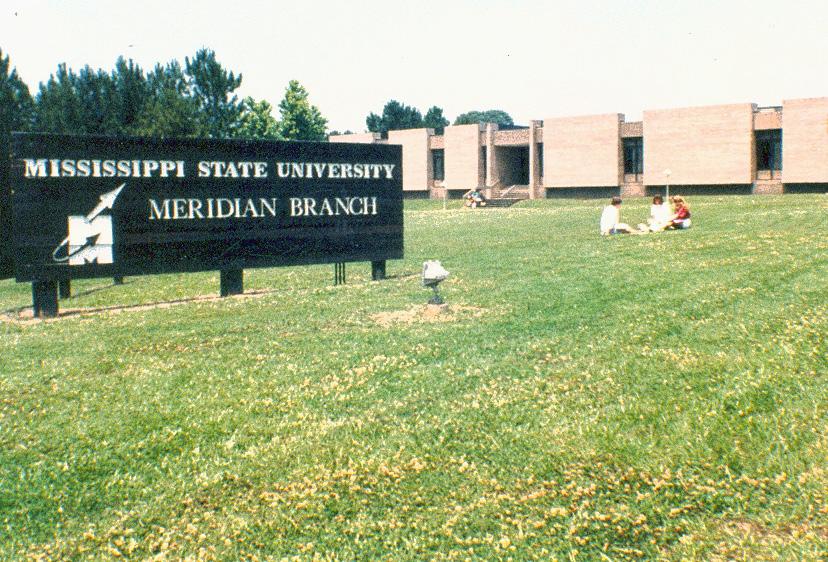
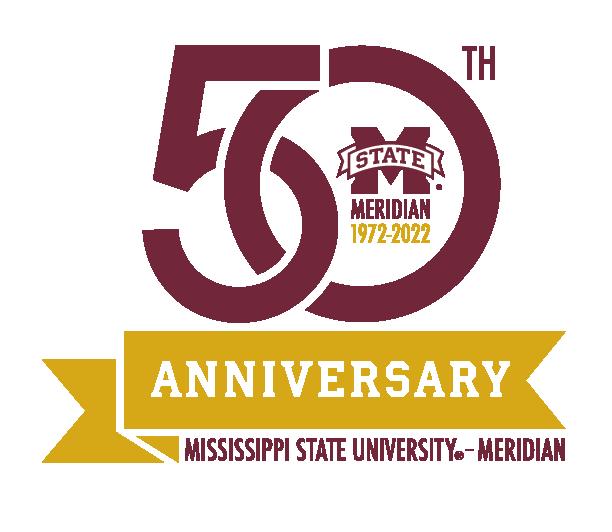
The Fulbright U.S. Student Program is the U.S. government’s flagship international exchange program. It is devoted to increasing mutual understanding between citizens of the U.S. and other countries through open communication and long-term cooperative relationships.
As a Fulbright Scholar, Allen—a native of McCalla, Alabama, and a spring 2020 microbiology graduate—arrived in Taiwan in September 2021 to expand her knowledge of Chinese language and traditional Chinese medicine while pursuing a master’s degree in global health at National Taiwan University. She aspires to attend medical school to “help others on multiple fronts.”
“I want to help people get the diagnosis and the treatment they need, and I also want to use what I learn about health policy through my master’s program to improve health care policy and law in the U.S.,” she said.
Allen attributes her successful Fulbright application to support she received from David Hoffman, director of the Shackouls Honors College’s Office of Prestigious External Scholarships.
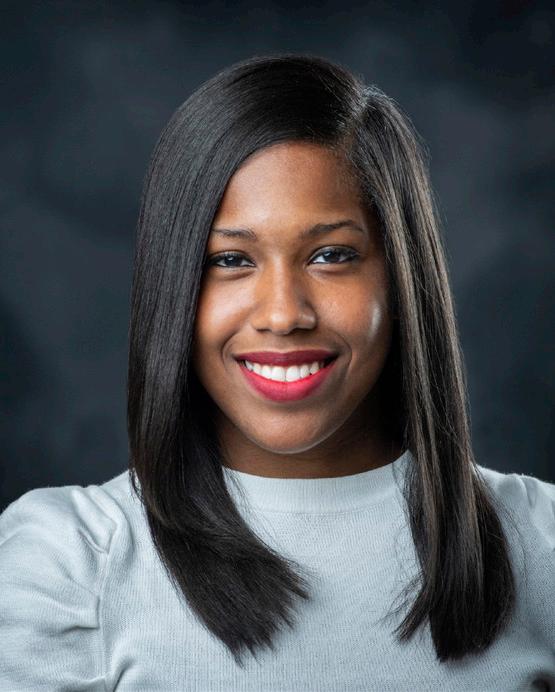
“His advice has helped me become confident enough to speak up about who I am, my experiences and challenges as an African American female and a first-generation college student, and also helped me openly express my goals no matter how unique and out of the ordinary,” Allen said. “He is genuinely one of those professors who cares about his students and helps out in any way he can. He also has what I call, ‘the eye.’ He can see your strengths
and weaknesses in your application and your story/narrative as an individual. He is also very patient and works with you through every step of the application.”
Hoffman said the Honors College is equally proud of Allen for representing Mississippi State on a global level.
“It was such a pleasure to work with Donielle on her Fulbright application. She took advantage of opportunities to study abroad, developed language abilities and engaged in laboratory research that enabled her to stand out from other applicants,” said Hoffman, also an associate professor in MSU’s Department of Anthropology and Middle Eastern Cultures.
Learn more about MSU’s Shackouls Honors College and the Office of Prestigious External Scholarships at www.honors.msstate.edu and the College of Arts and Sciences at www. cas.msstate.edu.
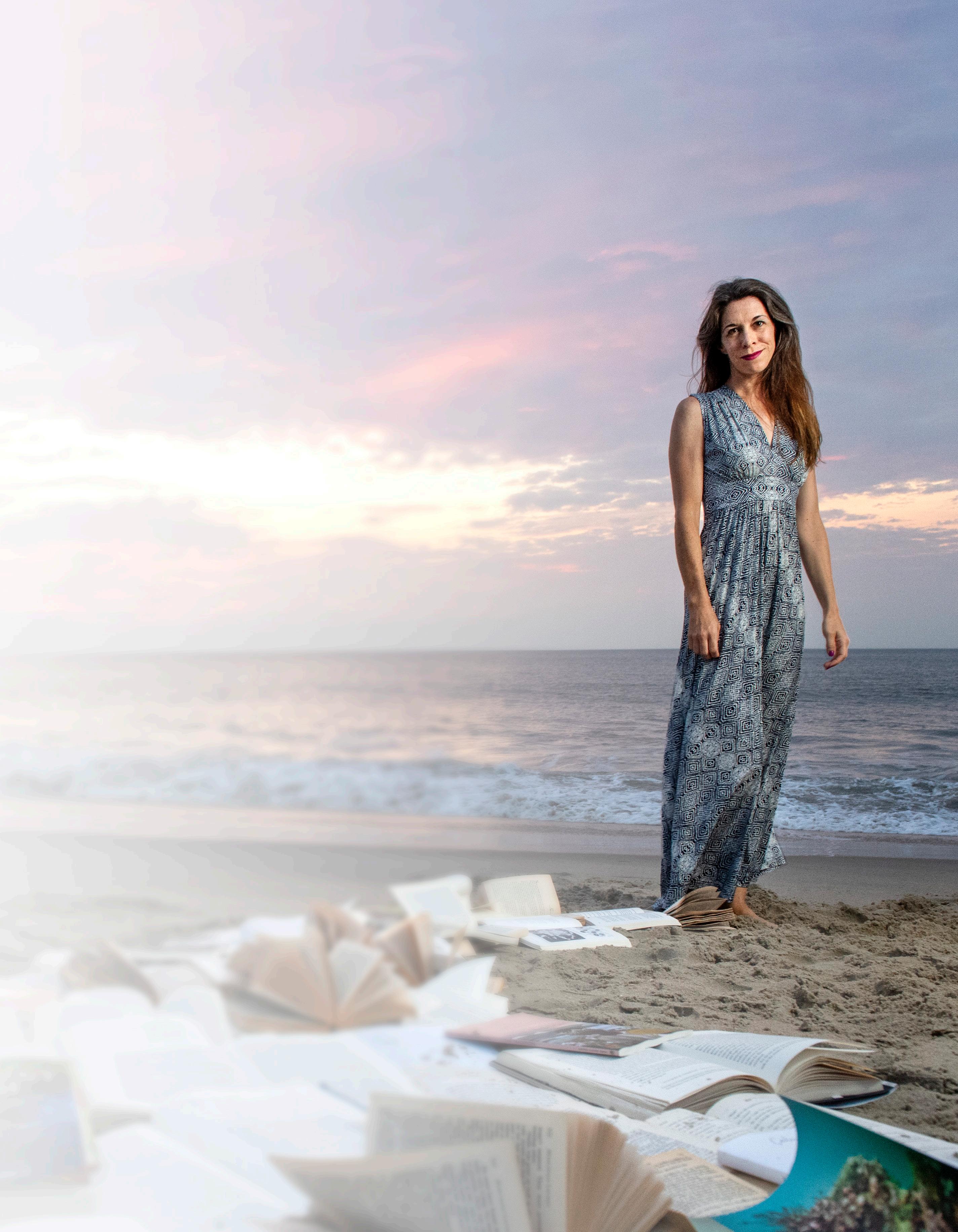
At Mississippi State University, we believe our state’s rich literary landscape is a magnificent work in progress. That’s why we’re thrilled that one of our own — College of Arts & Sciences English Professor Catherine Pierce — is the new Poet Laureate of Mississippi. Recently named to a four-year term, Catherine is already connecting with people across the state, engaging them in the many ways poetry can be an active and enriching part of their lives. It’s the same passion she’s shared with her poetry and creative writing students at MSU since 2007. Congratulations, Catherine, on this outstanding honor. We look forward to the many amazing things you will do in the days ahead as Poet Laureate.
WWW.MSSTATE.EDU
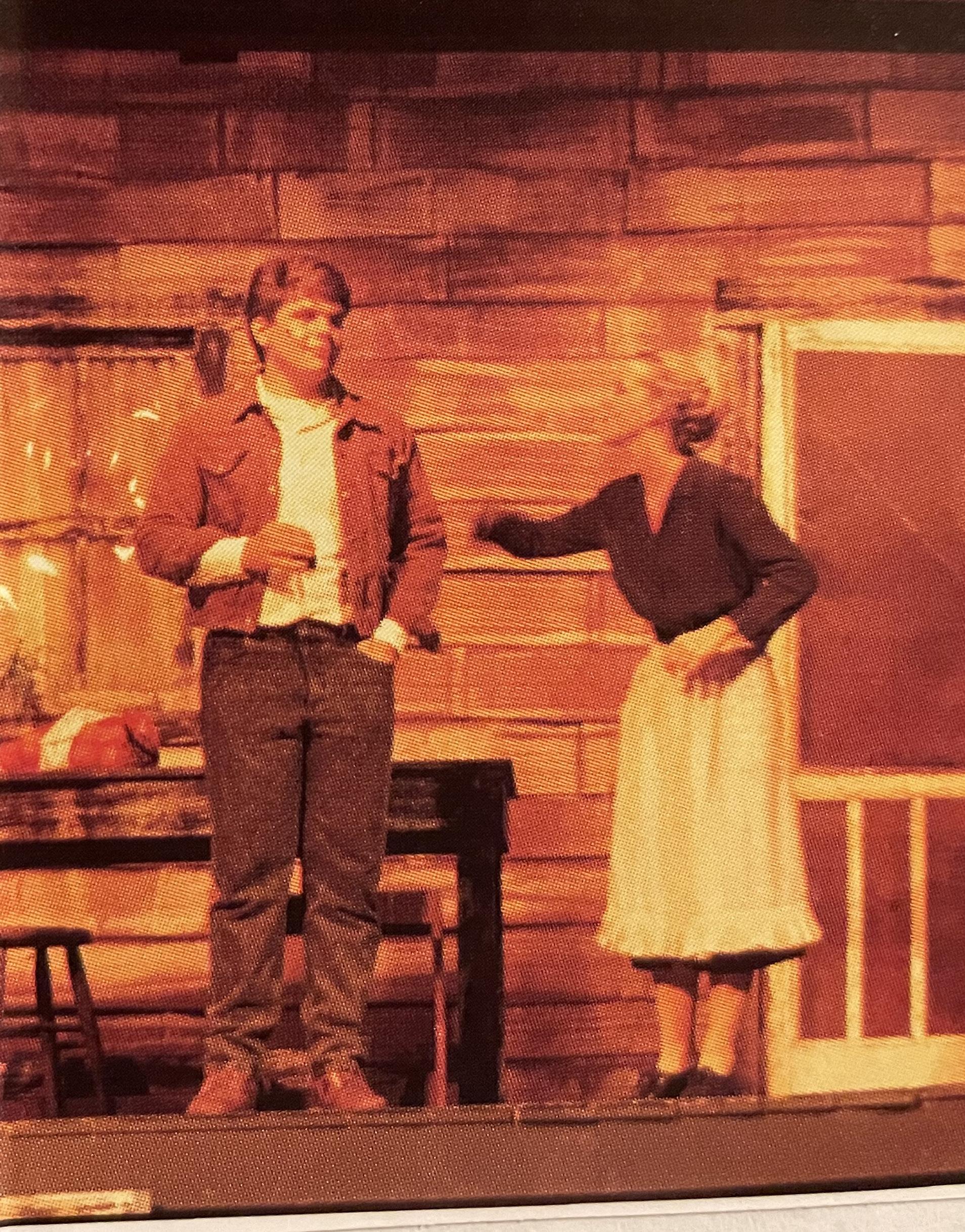 By Ashleigh Lee, communications specialist, MSU Foundation
By Ashleigh Lee, communications specialist, MSU Foundation
Myna Dickerson Sowell’s love for theater stems from a single question asked by her father when she was nine years old—“Would you like to try out for a local community theater production?”
By saying yes, Sowell began a life-long involvement in acting, communication and theater. Her participation in high school theater led her to competitions on campus at Mississippi State with her high school troupe, leading to a love for the maroon and white university.
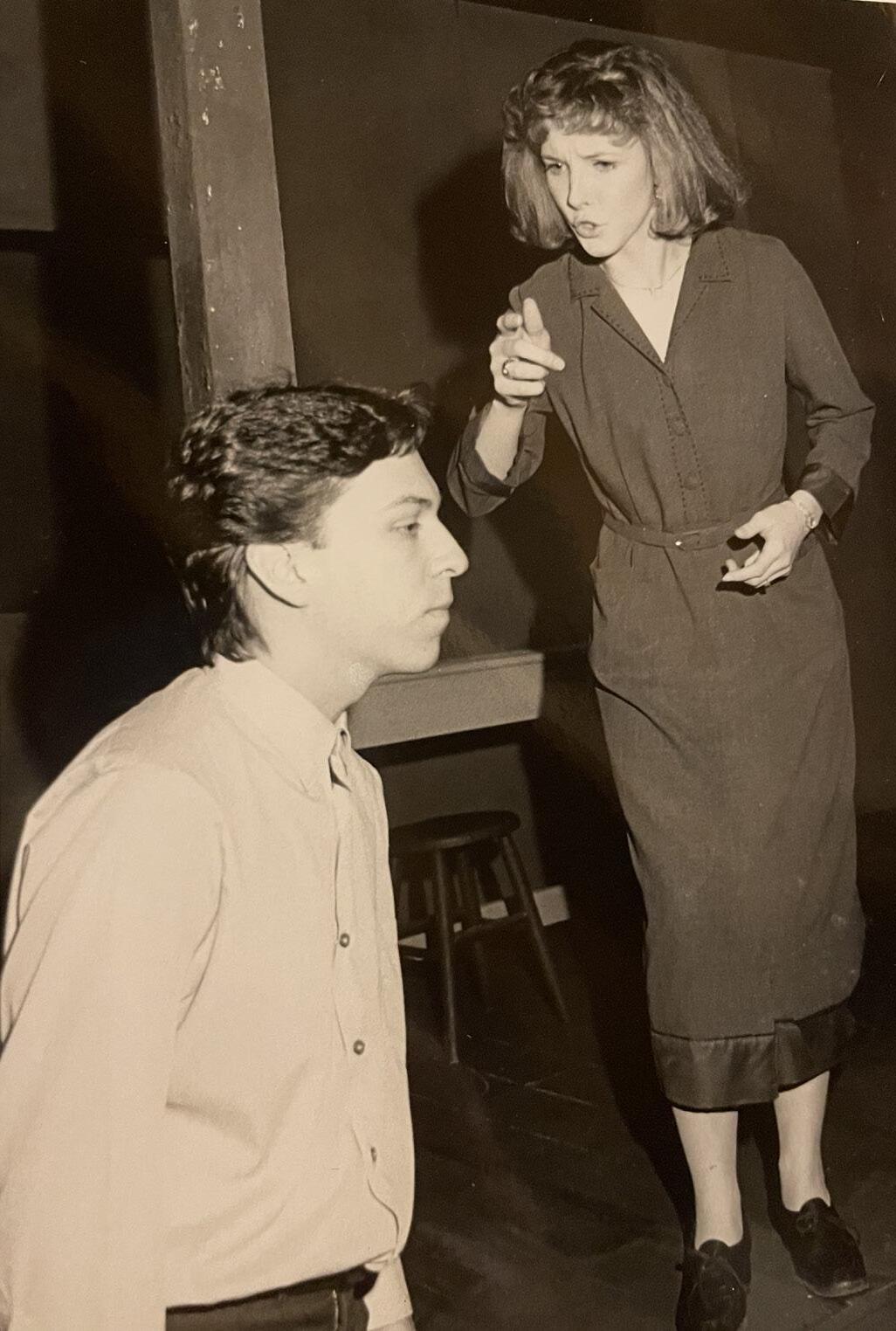
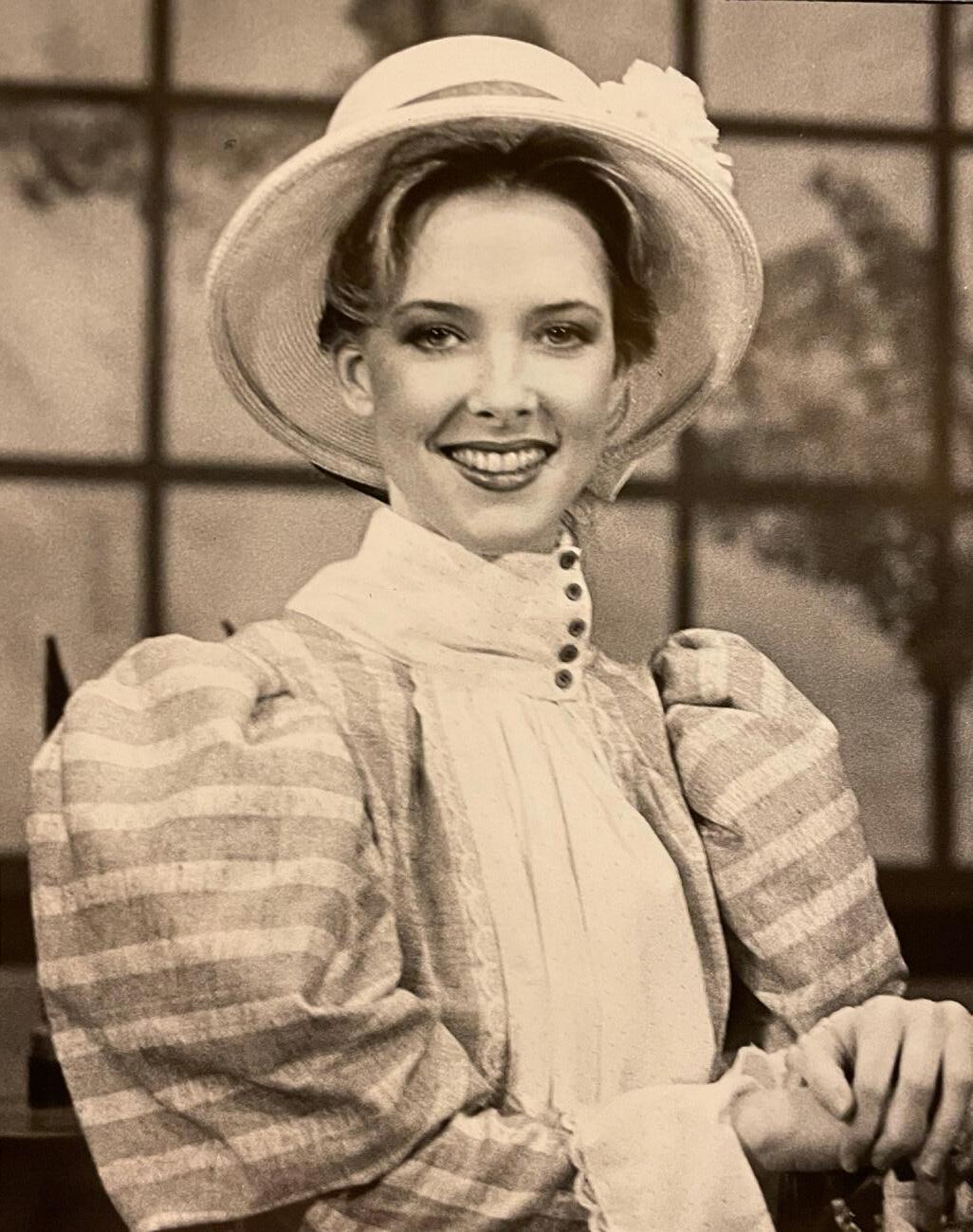
The Greenville native graduated from MSU in 1991 with her bachelor’s in communication, following in the footsteps of her father, David, a 1964 MSU graduate. Her Bulldog heritage and experiences with theater competitions put Sowell in a position to thrive academically—and eventually professionally—while exercising creativity and practicality. She works to instill these characteristics and love for Mississippi State with her daughters, Ann Morgan and Alena Read.
“The memories created at Mississippi State and in theater are so special,” Sowell said. “I experienced a range of classes that taught me classical work, technical skills, communication methods and so much more. I tell my children all the time that you cannot go through life thinking that you won’t have to speak and that no one will look at you. You must learn how to properly and efficiently express yourself.”

Today, Sowell works at Vanderbilt University Medical Center as a standardized patient. In this role, she uses her acting background, interpersonal skills and empathy to help medical students practice real-life diagnostics and communication simulations. The students get to apply their knowledge while practicing patient interaction and treatment.
“It’s not just being an actor on a stage, it’s about the lifelesson skills that I learned in the department that set me up for success,” she said. “I now get to work with these medical students to practice a range of conversations and give them feedback. In these situations, there is no room for misunderstandings. Interpersonal skills and nonverbal cues all enhance good communication.”
When COVID-19 began shutting down in-person events around the world, Sowell and her husband, John, knew that they wanted to help struggling creative outlets. The John and Myna Dickerson Sowell Endowed Theatre Fund for Excellence was established to help Theatre MSU and students with various needs, like production upgrades, travel support and equipment enhancements. Sowell wanted to see Theatre MSU and its students thrive, especially in difficult times.
“People often look to art and artists to help get us through slumps,” Sowell said. “We need storytelling, music, plays and movies. Anything that can take us away from our current reality, even if it’s for a little bit. Not only did I want to donate to keep arts alive due to my strong belief in giving back and strong desire to see theater stay afloat during a pandemic, but I also believe that the arts are an excellent vehicle for the expression of social commentary.”

Their gift was able to fund two student-directed shows during the spring 2021 semester: “Pipeline,” a story detailing the school-to-prison pipeline and a mother wanting to give her son a future without forgetting the community that shaped him, and “Red,” a play about artist Mark Rothko and his challenges with ambition and vulnerability. Both plays portrayed social commentary that Sowell believes is vital for
students to experience first-hand through the performing arts.
“There needs to be more stories told on the stage,” she said. “We need empathy, common ground and education. The stage is a perfectly marvelous place for that to take place. You never know how broadening the horizons of audience members might manifest itself. Someone might aspire to be a painter after watching a play or decide to be a writer or teacher. Helping keep the arts alive provides outlets to throngs of people who might not otherwise be exposed or realized.”
Sowell hopes her gifts will continue to inspire student performers and communicators as they discover their passions and get real-world experience. No matter where they end up after graduation, she knows that Theatre MSU provides a solid foundation for them to thrive in their future careers.
“My hope is that when people think of premier theater programs, Mississippi State is on their short lists,” she said. “I can’t wait to see how this program evolves and the work the students will do.”
For more information on creating endowed scholarships for Theatre MSU in the College of Arts and Sciences, contact Sara Frederic, director of development, at 662-325-3240 or sfrederic@foundation.msstate.edu.
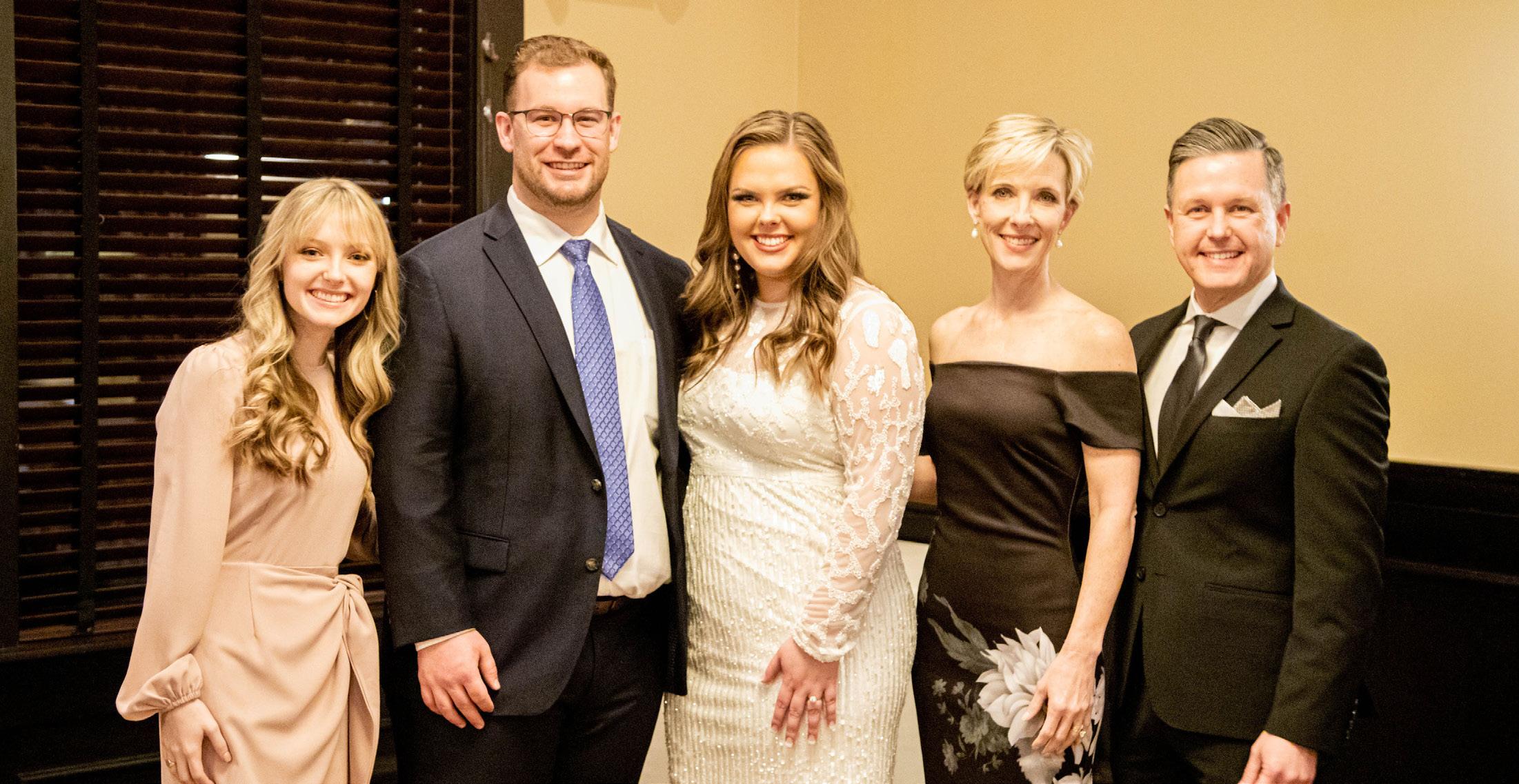
Mississippi State’s College of Arts and Sciences is announcing four new recipients of the Dean’s Eminent Scholar Awards honoring “exceptionally meritorious faculty who have achieved national recognition and enhanced the quality and stature of academic programs.”
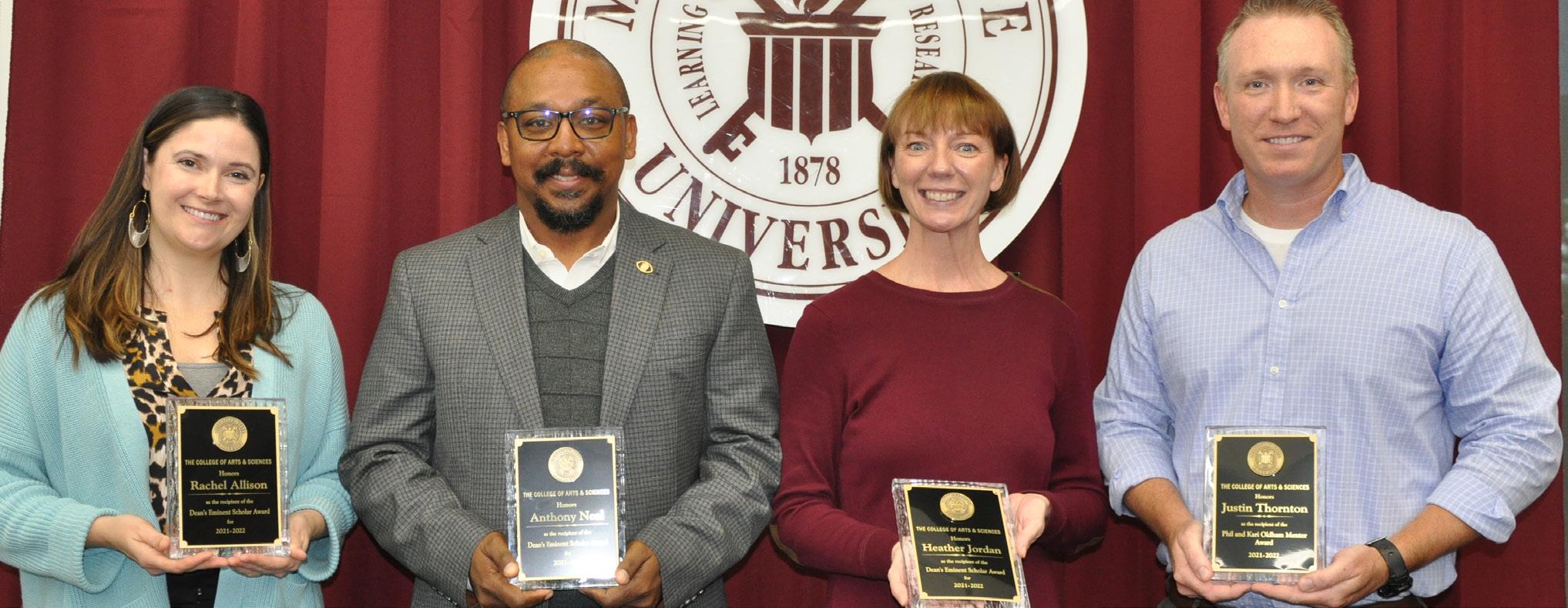
“These faculty members have made excellent contributions to their academic disciplines, and thus to society, through their innovative and internationally recognized scholarship. I’m proud to present awards to these worthy faculty members,” said College of Arts and Sciences Dean Rick Travis during the recent college fall faculty meeting.
Rachel Allison, assistant professor of sociology, is this year’s Gary Meyers Dean’s Eminent Scholar. Head of the Department of Sociology Nicole Rader said, “We are so proud of Dr. Allison’s accomplishments which have elevated our research stature and contributed to the national and international reputation of Mississippi State. Her many accomplishments include publishing a monograph with Oxford University Press, publishing in leading journals like Gender & Society, and she was the first recipient of the Russell-Sage Foundation Grant Award. She is a top-notch researcher in the sociology department.”
Anthony Neal, associate professor of philosophy and religion, is the Beverly B. and Gordon W. Gulmon Dean’s Eminent Scholar. “Through an impressive number of books, papers and presentations, Dr. Neal has developed a compelling account of what he calls the ‘Modern Era of the African American Freedom Struggle’ that not only draws upon neglected theorists like Howard Thurman and Huey Newton, but also develops an original account of what it is to experience this struggle for freedom,” said Robert Thompson, head of the Department of Philosophy and Religion. “Dr. Neal’s outstanding research has gained the attention of scholars working in philosophy and religious studies. In so doing, he has become an important ambassador for the department and MSU.”
Heather Jordan, associate professor of biological sciences, is the Sanderson Dean’s Eminent Scholar. “Dr. Jordan’s work is
remarkable in its diversity, from fieldwork in Africa tracking the ecology of bacterial water-borne human pathogens to exploring the potential for the use of insects as feedstock,” said Angus Dawe, head of the Department of Biological Sciences. “These seemingly unconnected areas are joined by microbiology, and her work is rapidly becoming transformative in how we think about disease as well as how microbes in the gut of insects can affect the potential of sustainable agriculture systems. Her productivity and stature as a researcher nationally and internationally mean this award is fully deserved.”
Justin Thornton, associate professor of biological sciences, is the recipient of the Phil and Kari Oldham Faculty Mentor Award. “In terms of comments, with 10 years in the department Dr. Thornton has established himself as an outstanding mentor and role model for undergraduate and graduate students,” Dawe said. “This is best illustrated by the subsequent success of his mentees. His graduate students have gone on to prestigious postdoctoral programs with one, Lindsey Burcham, recently accepting a tenure track faculty position in the microbiology department at the University of Tennessee in Knoxville. Undergraduates trained in his laboratory also have gone on to health-profession programs all over the country. These successes are what sets Dr. Thornton apart as someone known for setting a high bar, but doing so in a supportive and inclusive environment that allows students to flourish.”
As Mississippi State University’s largest and most diverse academic college, the College of Arts & Sciences seeks to faithfully and accurately represent the wide-ranging interests and concerns of its students.
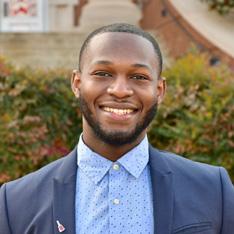
The College of Arts & Sciences Ambassadors (CASA), comprised of undergraduate representatives from the college’s 14 academic departments, seek to serve that purpose as a connection between the students in the college and the college’s administration.
CASA represents the College of Arts & Sciences to current and prospective students. Serving alongside representatives from their home departments, the ambassadors assist at recruitment events to relay how they have discovered their path to success through the College of Arts & Sciences. Our students serve as mentors to incoming students by staying in contact with prospective students, helping them discover future opportunities as Mississippi State Bulldogs.
First row: Breelyn
Davenport, Kyle Barron, Zoie Henson, Anna
Pounds, Jehlian Wright, Lauren Arceneaux, Maggie
Roberson, Lauren Adams
Second row: Megan Hanna, Kathryn Slaughter, Macy McDaniel, Anahi
Altamirano, Javad A’arabi, Ginni Gray, Cameron

Mayers, Ainsley Gordon
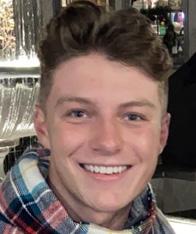

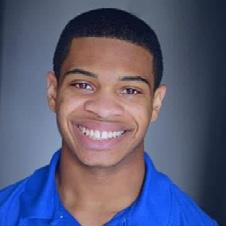
Third row: Haley Palmer, Nicole Sallis, Jacob Woods, Lauren Moore, Abby
Oosterling, Max Pinson, Mary Katherine Miller, Maeve Rigney
Fourth row: Alexia Balderas, MacKenzie Paul, Yuliya
Gluhova, Carly Ferrell, James Feduccia, Gabbi
Ferreri, Kyra Brown, Paige Perryman
Ambassadors for the College of Arts and Sciences represent some of the best students within the College, something they continually prove each year. For the Fall 2021 semester, the ambassadors were able to help recruit at in-person preview events held for prospective students—something they were not able to do last fall. Seeing all of them interacting with prospective students and their parents made me proud. These ambassadors truly care about the College of Arts and Sciences and enjoy showcasing the awesome opportunities they experience themselves at the university. The returning and new members have been able to interact fully with each other, sharing stories, encouraging each other, and just having fun together. Serving as the advisor to the student ambassadors is one of the most rewarding parts of my career.
Fifth row: Teri Anna Jackson, Gavin Kirkpatrick, Sarah Johns, Erin Bailey, Peyton Gardner, Maggie Shepherd, Katie Garrett
Manor, Haylie Lloyd
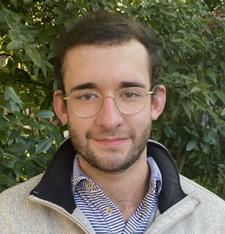
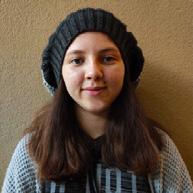 Hannah Bateman, Admissions Coordinator, College of Arts and Sciences Mississippi State University
Hannah Bateman, Admissions Coordinator, College of Arts and Sciences Mississippi State University
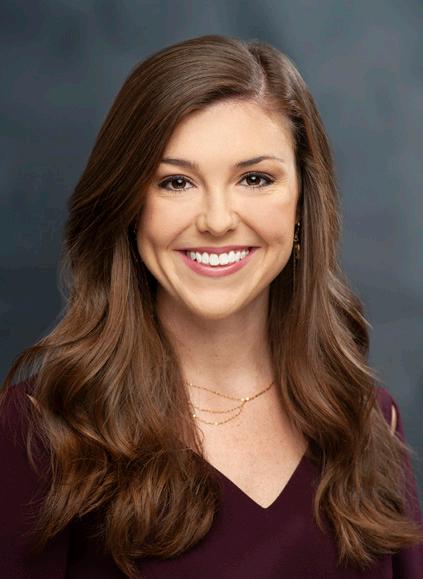
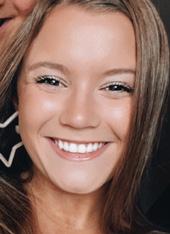
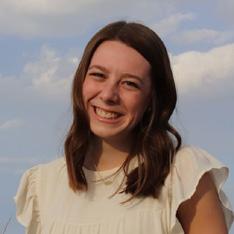


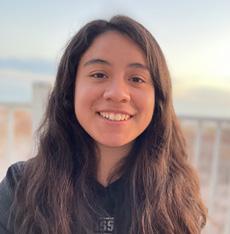
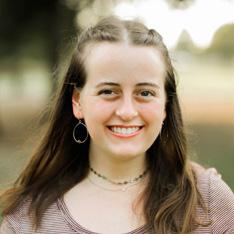
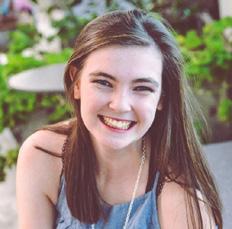

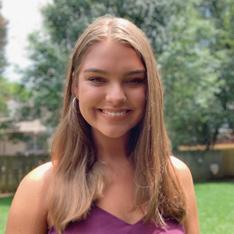
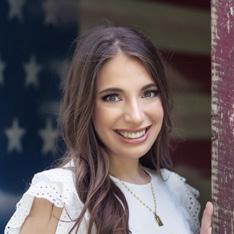
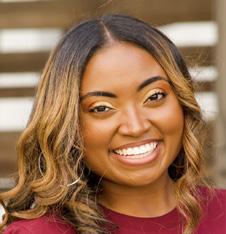

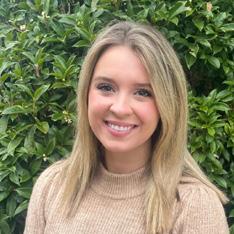

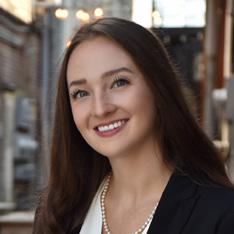
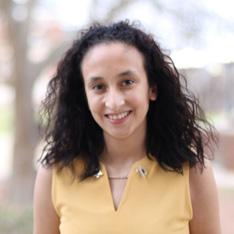
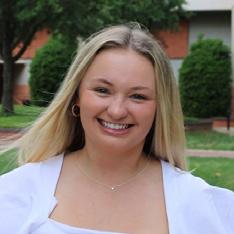
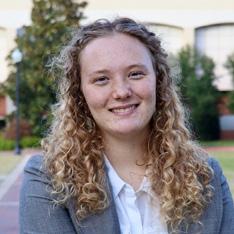
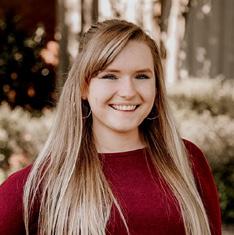
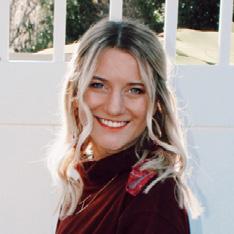
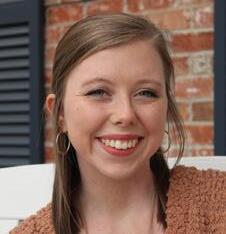
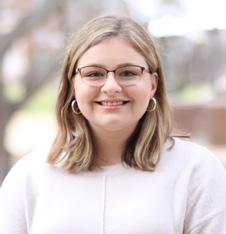
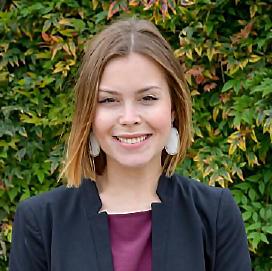
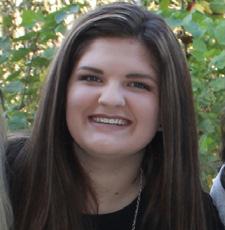
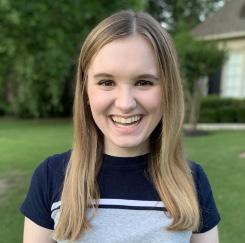


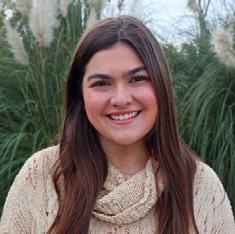
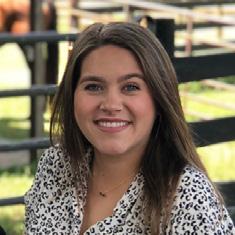
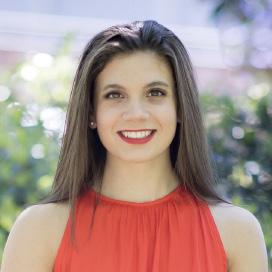
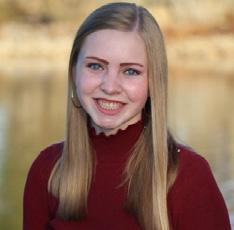
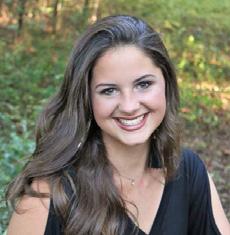

The Gamma of Mississippi chapter of The Phi Beta Kappa Society at Mississippi State University inducted more than 100 students in 2020 and 2021.
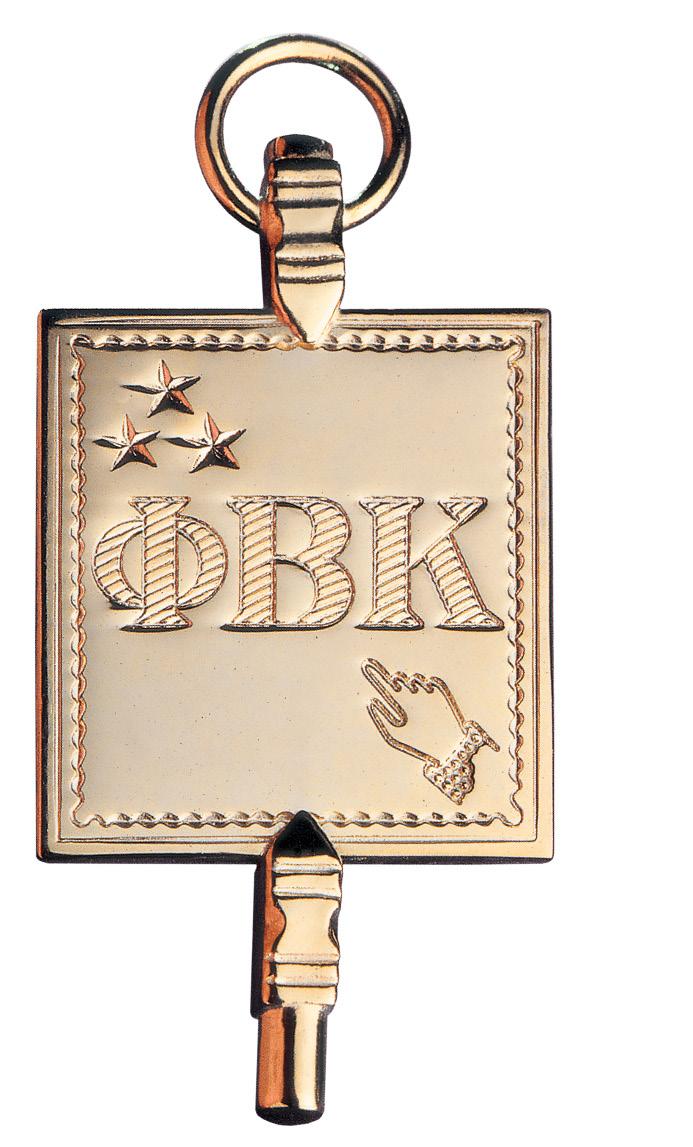
Selected for their extraordinary academic achievement in the arts and sciences, Phi Beta Kappa inductees are among the top 10 percent of their graduating class who have completed a broad range of liberal arts and sciences coursework, including foreign language study and mathematics.
The Phi Beta Kappa Society, founded on Dec. 5, 1776, is the nation’s most prestigious academic honor society. It has chapters at 290 colleges and universities in the United States, 50 alumni associations, and more than half a million members worldwide. Noteworthy members include 17 U.S. presidents, 41 U.S. Supreme Court justices and more than 140 Nobel laureates.
MSU’s PBK chapter was installed in 2019, an occasion MSU President Mark E. Keenum called “the culmination of years of dedicated work on the part of so many scholars on this campus, past and present.” Among criteria are the university’s educational rigor in the arts and sciences, governance structure, faculty excellence, demonstrated commitment to academic freedom, and institutional dedication to liberal arts education.
The mission of The Phi Beta Kappa Society is to champion education in the liberal arts and sciences, foster freedom of thought, and recognize academic excellence. For more information, visit www.pbk.org.
2020 Phi Beta Kappa, Gamma of Mississippi Chapter student inductees (by hometown):
Allison Park, Pennsylvania—Julia
Concolino, French/Marketing
Athens, Alabama—Rebecca Van
Pamel, English
Baldwyn—Dawn Jackson, Spanish/ Business Economics
Bartlett, Tennessee—Julia CanfieldPhillips, Spanish/Marketing
Belmont—Hannah Dunlap, Psychology
Blue Mountain—Taylor Ward, Mathematics
Brandon—Semaj Martin-Redd, Political Science; and Megan
Walker, Chemistry/History
Brookhaven—Mackenzie Jackson, English; and Cameron Temple, English
Chelsea, Alabama—Morgan Gay, Communication
Clinton—Kayla Sartin, Anthropology and Classics
Columbus—Randa Byars, Communication
Cordova, Tennessee—Sara
Pritchard, Communication
Corona, California—Sara
Lizariturry Setien, Psychology
Crawford—Lacee Johnson, Asian Studies
Dubberly, Louisiana—Anna Tucker, English/Philosophy
Franklin, Tennessee—Charlotte Corr, Communication
Gulfport—Tarah Burrows, English; and Desiree Goodfellow, Anthropology
Hattiesburg—Elizabeth Lucas, Biological Sciences
Hernando—Cassidy Doss, Biological Sciences
Hoover, Alabama—Emily Couch, Mathematics
Horn Lake—Stephanie Nigrinis, French/Marketing
Jackson—Emily Box, Communication; and Jessica Davis, Mathematics
Johns Creek, Georgia—Leigh
Taylor, French
Lake Cormorant—Rebekah
Grisham, English
Lynn Haven, Florida—Melissa Cole, Spanish/Marketing
Madison, Alabama—James Moore, Spanish/Finance
Madison—Cameron Peets, Biological Sciences; and Laura Turner, Spanish/Management
Mandeville, Louisiana—Jennifer Casey, Spanish/Economics
Marion, Arkansas—Andrea Beyer, Chemical Engineering
Martin, Tennessee—William Dickens, Spanish/Finance
McGehee, Arkansas—Abby Miles, Biological Sciences
Memphis, Tennessee—Samuel Nieman, Biological Sciences
Mount Juliet, Tennessee—Dylan Bufkin, English
Muscle Shoals, Alabama—Joshua Aldridge, Biological Sciences
Nashville, Tennessee—Mary
Boring, Spanish/Finance
Nesbit—Hannah Phillips, English
Starkville—Eun Bea Kim, Psychology; Martial Aime Kemdje Noumbi, Spanish/Marketing; and Jihyun Shin, Sociology
Sumrall—Emily Jeanmard, Political Science
Taylorsville—Kimberlyn Ivy, English Tupelo—Vesil Dao, Psychology
Webb, Alabama—Colby Collins, Mathematics/Finance
2021 Phi Beta Kappa, Gamma of Mississippi Chapter student inductees (by hometown):
Acworth, Georgia—Tara
Hambrick, Chemistry/Psychology
Alabaster, Alabama—Lindsey
Downs, English
Bay Saint Louis—Dimetri Lyons, Communicaiton
Birmingham, Alabama—Reagan Clark, Political Science/Foreign
Language
Blue Springs—Audra Myers,
Communication
Bogue Chitto—Julianna Mills, Chemistry
Brandon—Estefania Armendariz, Chemistry; Jonathan Bailey, Political Science/Communication; Madison Land, Biological Sciences; and Roselynn Nelson, Mathematics/Electrical Engineering
Caruthersville, Missouri—Ellen Currie, Communication
Coldwater—Ryan Ware, Spanish/ Finance
Collierville, Tennessee—David Rook, Anthropology; and Elizabeth Zabielski, Biological Sciences
Corinth—Benjamin Spencer, Mathematics
Diamondhead—Abby Guy, Political Science/Spanish
Falkville, Alabama—Emma
Anders, English
Gulfport—Flora Dedeaux, Communication
Hernando—Melissa Wages, Political Science
Huntsville, Alabama—Hanna Blankenship, Spanish/ Communication
Jackson—Camille Grady, Spanish
Jackson, Missouri—Allyson Jansen, Spanish/Finance
Jasper, Alabama—Dorothy Higgs, English
Joint Base Elmendorf-Richardson, Alaska—Majesty Henry, Communication
Lithia Springs, Georgia—Matthew Cline, Political Science
Long Beach—Katherine
Rorabaugh, Mathematics
Lucedale—Reagan Sumrall, English
Madison—Christopher Friedrich, Spanish/Finance;Caitlyn Klauser, Spanish/Finance; Maeve Rigney, English/Political Science; and Rachel Russell, Spanish/Marketing
Mantee—Reagan Poston, English
Marietta, Georgia—Brianna
Laverty, French/Marketing
Marion, Arkansas—Norman
Hunter, Anthropology/Biological Sciences
Memphis, Tennessee—Madison
Erwin, Criminology
Meridian—Sophia Calderon, Communication
Mooreville—Hunter Roberts, Spanish/Finance
Nashville, Tennessee—Gernie
Batey, Biological Sciences
Ocean Springs—Dylan Mayne, Political Science/Spanish
Olive Branch—Lauren Adams, English
Ontario, Canada—Ashton Porter, French/Political Science
Petal—Mallory Nicholson, German/Business Administration
Picayune—Taylor Ladner, Microbiology/Biochemistry
Slidell, Louisiana—Emily Bouchereau, Spanish/Marketing
Starkville—John Dickerson, Spanish/Business Economics; Hannah Richardson, English; and Cheyenne Tucker, German/ Business Administration
Summit—Laura Olive, Chemistry
Tupelo—Katlyn Grimes, Mathematics/Physics; Emberly Jackson, Biological Sciences; and Ross Weeden, Spanish/Finance
Tylertown—Py’Necious Cowart, Communication
Vienna, Virginia—Emily Tucker, Microbiology/Biochemistry
Washington, New Jersey—Justin Vence, Criminology
Windermere, Florida—Sinclair Keyes, French/Business Administration
For a list of 2022 inductees, please check www.msstate.edu this summer.
The College of Arts and Sciences Dean’s Executive Advisory Board member Randall “Kirk” Reid unexpectedly passed away at the age of 58, leaving a lasting legacy at his alma mater, Mississippi State University.
Reid knew at an early age that he was destined for a career in the medical field. After receiving his bachelor’s degree in general science in 1985 from Mississippi State University, he continued his education at the University of Mississippi Medical Center where he earned his medical degree in 1990. His medical career began at the University of Texas Medical Branch at Galveston where he completed his postgraduate training in medicine and anesthesiology.
Reid’s accomplished career in anesthesiology included twenty-one years with Jackson Anesthesia Associates where he served multiple terms as president of the group. Through his vision and dedication to the field, he was named the vice chair for clinical services within the Department of Anesthesiology and was chief of the medical staff at the University of Mississippi Medical Center.
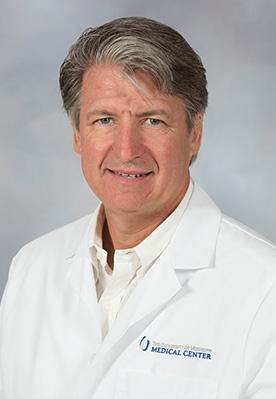
Reid also served as an appointed member to the College of Arts and Sciences Dean’s Executive Advisory Board and
was an integral part of the Doctor Dawgs program. Doctor Dawgs is a compilation of elite healthcare professionals throughout Mississippi and beyond who are invested in ensuring all MSU students pursuing a career in healthcare are informed about their opportunities and resources available at MSU, helping these students become viable candidates for their healthcare profession of choice.
“Kirk was a wonderful friend and supporter of the college and was so dedicated to the Doctor Dawgs program. His enthusiasm regarding educating students, whether at MSU or UMMC, was a joy. Given his administrative role at UMMC, I especially enjoyed comparing ideas regarding on how best to meet the needs of students,” said Dr. Rick Travis, dean of the College of Arts and Sciences.
Reid was passionate about teaching aspiring healthcare workers, recently allowing Christopher B. Robinson, a senior biological engineering major from Brookhaven, to shadow him at work.
“I had the pleasure to shadow Dr. Reid for three days in the operating room at UMMC during winter break,” Robinson said. “Shadowing Dr. Reid was an amazing opportunity because he was so clearly
respected and well-liked by everyone in the OR which ensured we got to see all the ‘coolest cases.’ That was something that instantly stood out when I

first met him—how invested he was in not only our academic success, but also ensuring we discovered our passions. As a mentor, Dr. Reid offered an honest perspective of the medical profession while also expressing sincere pride and encouragement as I progressed on my path to a career in medicine. His kind, open personality and guidance will be missed,” Robinson said.
Dr. Mary Celeste Reese, director of the health professions resource center, said Reid was always willing to help improve processes, provide direction and was always supportive with any need to help a student succeed.
“He was inquisitive, enthusiastic and determined to provide any student sent his way with the optimal shadowing experience and it always went well beyond that,” Reese said. “He was a natural leader and teacher, he was always quick to let a premedical student shadow him, visit with the medical residents to provide direction and encouragement, and thrived on making
everything he pursued the absolute best it could be.”
Sara J. Frederic, the College’s director of development, said, “I had the opportunity to meet Kirk in May of 2018. From that first visit I knew he was going to make a tremendous impact on the College of Arts and Sciences Dean’s Executive Advisory Board and on the Doctor Dawgs group.”
“Kirk’s compassion, dedication and joy was evident in his career and the organizations he served, but he never missed an opportunity to talk about where the foundation of his success and happiness was built upon. It was always special to hear him dote on his wife of 33-years, Mitcie, who is a 1987 alumna from MSU with a bachelor’s degree in professional accounting. He also never missed an opportunity to proudly tell me about his three children who were all destined for greatness and will be difference-makers in this world,” said Frederic.
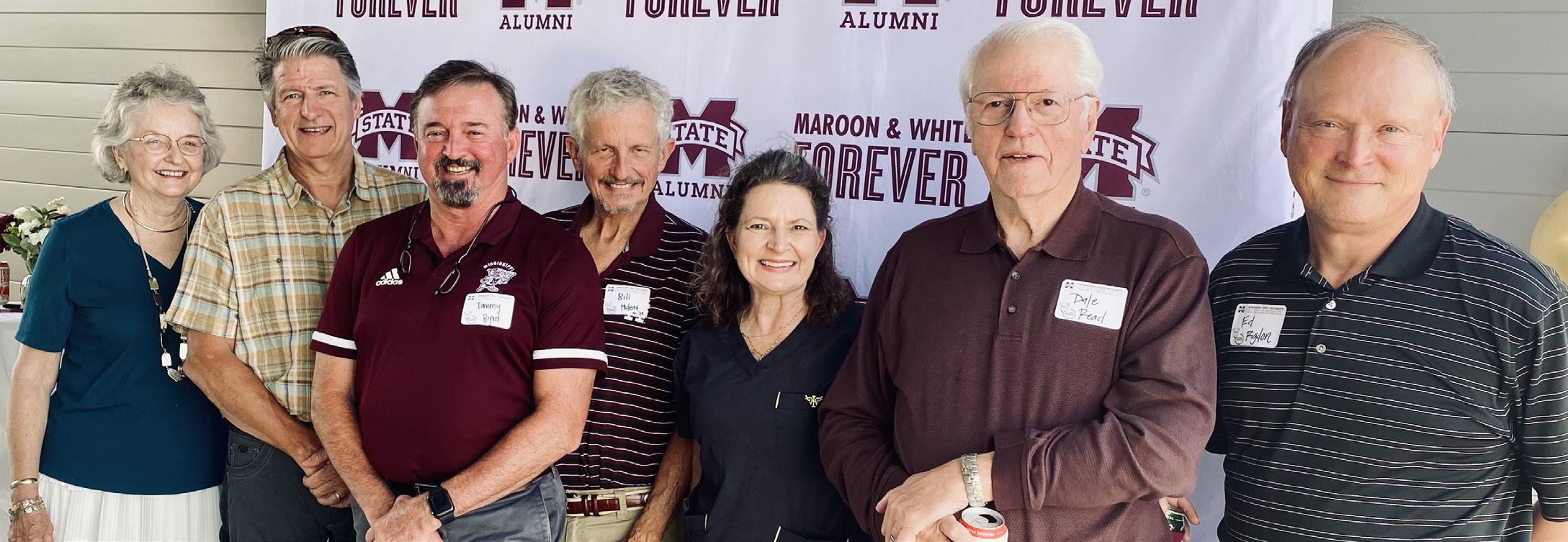
“When I look back, knowing his medical school dream resonated as a teenager, it made him the ultimate

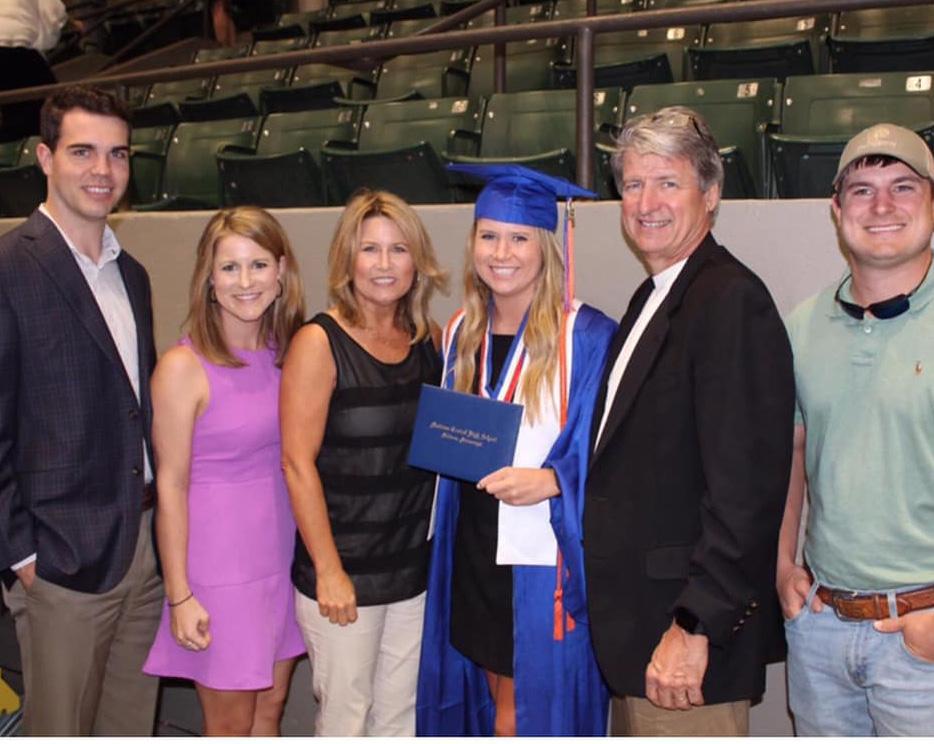

cheerleader to all those interested in pursuing their healthcare dreams. Watching him at our Doctor Dawgs recruitment events—encouraging prospective students, sharing the perfect words of wisdom with the current medical students, or providing an opportunity to shadow or visit with him—he gave the perfect advice because he himself lived through and experienced it,” Frederic said.
“His legacy will carry on forever throughout this entire university for the differences he made through his countless acts of service to our students, encouragement he gave our faculty and staff at advisory board meetings, his willingness to support the Doctor Dawgs Excellence Fund and Program which continues to assist those who have the same medical dreams he shared come to fruition. The difference Kirk Reid made throughout this university and in this world is immeasurable,” Frederic said.
The mission of the College of Arts and Sciences Dean’s Executive Advisory Board is to provide leadership and support to the Dean by utilizing individual skills, financial resources, teamwork, and diversity to strengthen the academic infrastructure, faculty, and facilities of the College and University.
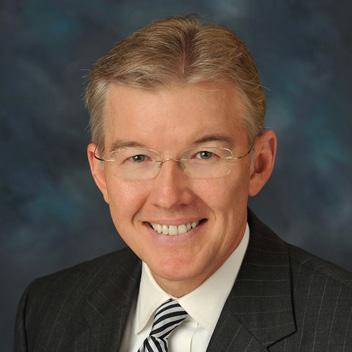
Because of COVID-19, a 2021-2022 group photo was not taken. Tommie Cardin and
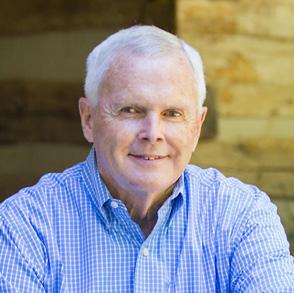
also are members of the Dean’s Executive Advisory Board.
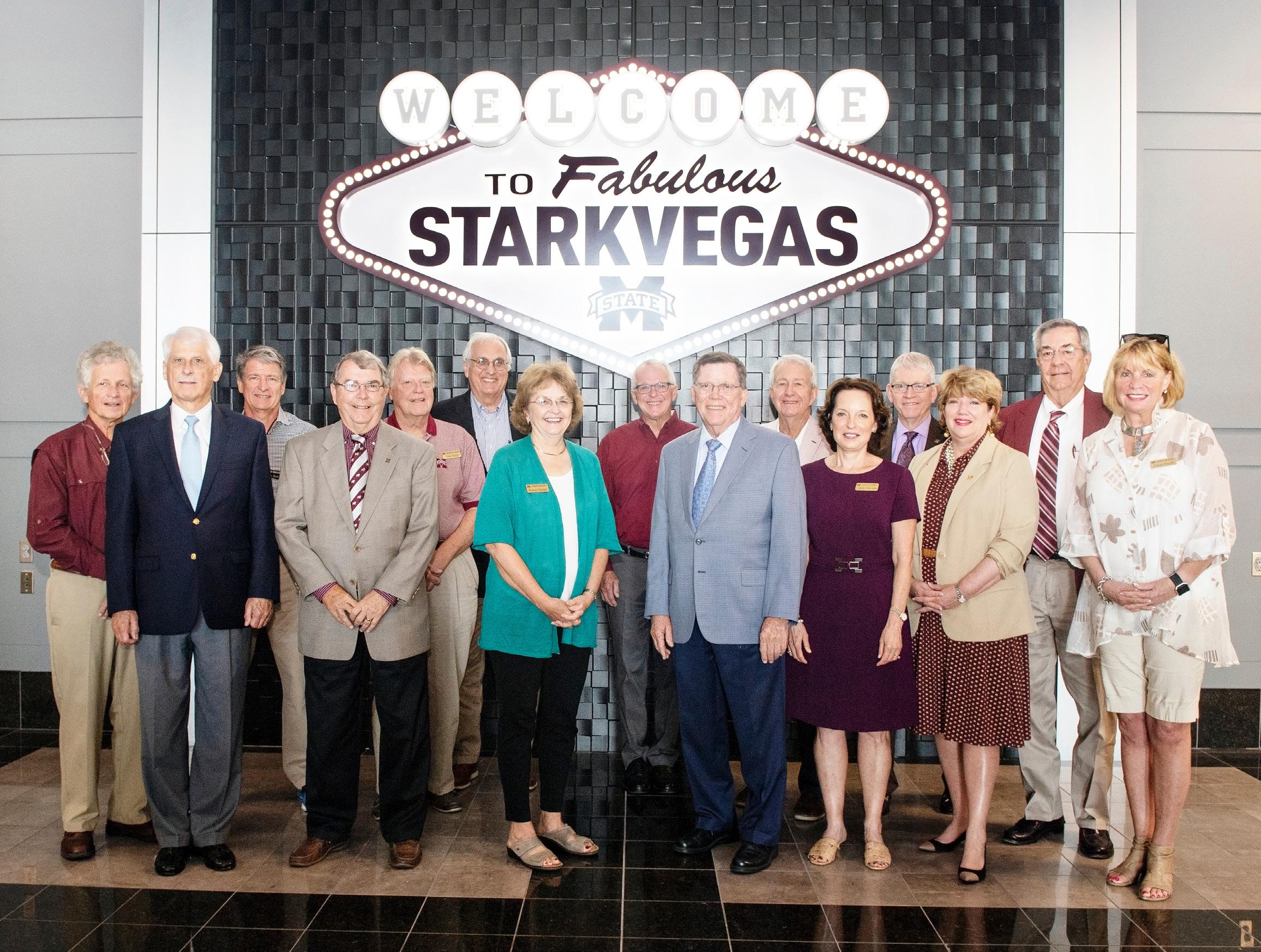
As we navigate through these turbulent times, know that I keep you in my thoughts and prayers. When we started a new year in 2021, I realized 2020 was just the eye of the storm. 2021 has brought more devastating losses to our A&S Bulldog family. Though uncertainty and confusion seemed to reign, our students, faculty and staff rose above as some of the most resilient, compassionate and grittiest group of people around.
In a time when the entertainment industry took a hit, our Theatre MSU program delivered a myriad of shows throughout the year. You would think the added COVID-19 layers would make students and faculty struggle under the extra weight and burden. Instead, they utilized the extra layers to make their productions even stronger. When the program ran into financial obstacles to deliver the production they envisioned, an alumna answered the need. When COVID-19 began shutting down inperson productions around the world, John and Myna Sowell Dickerson knew they wanted to help struggling creatives.
In May of 2021, the John and Myna Dickerson Sowell Endowed Fund for Excellence was established to help Theatre MSU with various needs, like production upgrades, travel support and equipment enhancements. As a student, Myna cherished her time on stage. She knew she wanted to support an area providing relief from reality that served as a vehicle for the expression of social commentary.
GRACE – simple elegance or refinement of movement.
As COVID-19 protocols shifted, our administration, parents and alumni began expressing concern for students transitioning from virtual learning back to a face-to-face learning environment. By this point, students had spent nearly two years building their educational knowledge and tech skills – but what about their interpersonal skills? How could we bridge the gap from virtual
learning back to face-to-face learning? Through the vision of Cheryl Chambers, a communication instructor, and our generous alumni, a valuable resource was established to bridge the gap and extend student success even further. In October 2021, the MSU Speaking Center opened to address public speaking concerns and promote the best delivery of presentations of all types. The MSU Speaking Center specializes in the delivery of presentations, speeches, debates and more! This resource enables students to build confidence and promotes the delivery of a clear and concise message.
GRATITUDE - the quality of being thankful; readiness to show appreciation for and to return kindness.
I cherish all the incredible support for students within the College of Arts and Sciences. Our students take the knowledge learned within the classroom and continually apply it to reallife opportunities. It amazes me to see how the students utilize support and experiences to pave the path to their ultimate career aspirations. How do we continue to rebuild what COVID-19 took away as we begin moving forward? By remaining grateful for hard work and dedication. Through the successful valueadded opportunities, our students and faculty are out in the field, industry, and beyond promoting the College of Arts and Sciences and MSU in the best light. Gratitude, a true expression of gratitude, cannot be faked – and through these experiences, our students expressed their sincere gratitude to those who provided them a chance. The gratitude caught the attention of others who wanted to make a difference and play a role in our student’s academic development and success.
In November of 2021, FOX Weather, a network subsidiary, established the FOX Weather Endowed Scholarship and the FOX Weather Annual Scholarship to further increase diversity
and expand opportunities for academic success in the field of meteorology. In addition to the scholarship, FOX Weather provides an internship position with a dedicated mentor for recipients throughout their college experience. The inaugural FOX Weather scholarship recipient will be awarded for the 2022-2023 academic year, equipping them with valuable resources to thrive and succeed in the broadcast meteorology field.
GROWTH - the process of developing or maturing physically, mentally or spiritually.
We have all grown substantially since March of 2020. Growing pains got us to where we are today, and we know more hurdles are to be jumped along the way. But as we continue this academic journey focused on the well-being, development and growth of our students, faculty and staff, we know that 2022 will continue to offer countless opportunities because of you. You, our loyal alumni and friends, built the solid foundation the College of Arts and Sciences continues to stand on.
We invite you to come see the growth and development of the
College by joining us on a campus visit. Through all your support and generosity, my perspective on the future is bright! We shall continue to work together to promote academic excellence throughout all units within the College of Arts and Sciences. Thank you for the support you provide to promote opportunities for all to thrive in the good and the challenging times. I value and appreciate you all more than I could ever express in words.
With Grit, Grace, Gratitude and Growth,When most people think about making a charitable gift, they think of giving cash. While we welcome gifts of many kinds to help support Mississippi State University, there are ways you can give and benefit from a gift of other assets.

• You can avoid paying capital gains tax if you give appreciated assets.
• You will receive a charitable deduction for your gift which can lower your tax bill.
• You can make a gift today while preserving your cash for immediate or future needs.
• You and your family can receive benefits such as lifetime income.
• You may be able to make greater gifts than you ever thought possible.
For more information on how you can give and get the most from your assets, contact the MSU Foundation Office of Gift Planning.
Sara Jurney Frederic
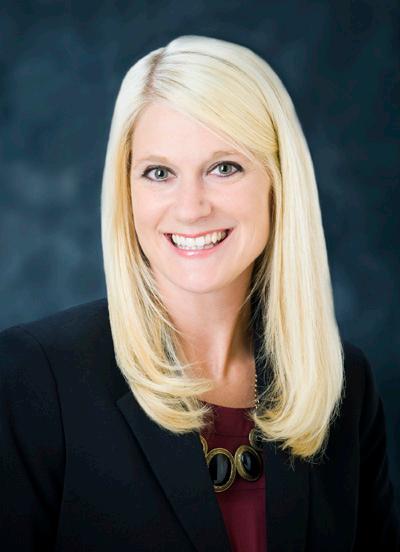 Director of Development College of Arts & Sciences
Director of Development College of Arts & Sciences
Petroleum Experts, Inc.
Dr. Fred G. Corley, Jr.
American Chemical Society
Mr. and Mrs. Malcolm B. Lightsey, Sr.
Ms. Cynthia M. Stevens
Mr. Bruce G. Thomas
Dr. and Mrs. A. Randle White
Dr. Sara E. Morris
Dr. Howard E. Shook, Jr.
Mr. Homer F. Wilson, Jr.
John M. and Myna Dickerson Sowell
Ms. Margaret E. Swain, ACSW
Mr. Frank Imbruglia and Mrs. Elaine Akers Imbruglia
Drs. Karen and William Hulett
FOX News Network, LLC
The Community Foundation of Louisville
Dr. and Mrs. Michael Thorne
Dr. Dale G. Read, Sr.
Mr. Wesley and Mrs. Laura Holland
Dr. and Mrs. Ralph W. Alewine, III
Dr. P. J. Moore, III
Dr. Stephen D. Shaffer
Ms. Llana Y. Smith and Dr. John B. Rada
Mr. and Mrs. Richard R. Brann
Dr. Gavin P. Thompson and Mr. Paul E. Kinsey
Mr. and Mrs. William E. Covington, III
Mr. and Mrs. Henry E. Johnston
Mr. and Mrs. Greg J. Barker
Mr. Ray L. Bellande
Dr. Gary L. Bradshaw
Kermit and Coralie Carraway
Dr. and Mrs. Gerald A. Emison
Dr. Erin Jaye Holmes
Mr. and Mrs. Jason L. Shelton
Dr. Martha H. Swain

The following list includes our generous alumni and friends who supported the college
Mr. Edward D. Graham, Jr.
Dr. Lee G. Turnage, Jr.
Dr. Christopher and Mrs. Bette Behr
Dr. and Mrs. Richard J. Lenz
Major and Mrs. Frank Wilkerson
Mr. and Mrs. Tommie S. Cardin
Ms. Anna Minor Grizzle
Dr. and Mrs. Edward J. Clynch
Mr. and Mrs. W. V. Harned
Ms. Gretchen Gulmon
Mr. and Mrs. Alan C. Geolot
Florence Dental Clinic
Mr. Chris Gottbrath
Dr. and Mrs. William Harris, III
Dr. and Mrs. Hubert H. Parker IV
Col. and Mrs. Steve Schrum
Mr. and Mrs. Lloyd A. Solomon
Dr. Robert E. Wolverton
Mr. and Mrs. W. V. Harned
Mrs. Carol R. Elliott
Mrs. Jeanne R. Boykin
Mr. and Mrs. F. Ewin Henson, III
Dr. Gary L. Permenter
Mr. and Mrs. Gus Colvin, Jr.
Mrs. Paula C. Mabry
John and Ginger Arledge
Mr. and Mrs. Larry D. Cobb
Mr. Jamie L. Mahne
Dr. Mitchell E. Berman
Mr. and Mrs. Samuel P. Guyton
Mr. and Mrs. Tom Webb
Dr. David Wigley and Dr. Dana Fox
Mr. and Mrs. Robert C. Williams
Keith and Camille Young
Drs. Richard and Patricia Weddle
Dr. and Mrs. R. Kirk Reid
Mrs. Eileen Carr-Tabb
Dr. Sue C. Lauderdale
Dr. and Mrs. Edward E. Rigdon
Drs. Timothy and Katie Thomas
Dr. and Mrs. Barry W. Herring
Dr. and Mrs. W. Lawrence Croft
Col. and Mrs. Robert K. Jayne
Mr. Steven L. Mayo
Mr. Chester A. Tapscott, III
Mr. Mark Sivik
Mr. John W. Elliott
Mr. Walker E. Marsh
Mr. and Mrs. Robert Barnes
Dr. Claude E. Peacock
Mr. Everett T. Culpepper
Mr. and Mrs. Bruce E. Barlow
Mr. and Mrs. Aubrey B. Conrad
Mrs. Jean Walrath Ferguson
Dr. and Mrs. Benton M. Hilbun
Mr. and Mrs. John P. Jenkins
Ms. Cheryl A. King
Mr. Herbert A. King
Dr. and Mrs. Alan Meierhoefer
Ms. Susmita Parikh
Dr. Dan Punday
Dr. and Mrs. Don Vaughan
Mr. Nathan H. Elmore
Ms. Brenna G. Hunter
Col. Debbie L. Gibbs
Mr. and Mrs. Louis M. Jurney
Dr. and Mrs. Robert T. McAdory, Jr.
Ms. Susan C. Palmer
Mr. and Mrs. Jefferson P. Skelton
Ms. Amy Tuck
Dr. Diane E. Wall
Mr. and Mrs. Paul D. Speyerer
Dr. and Mrs. Charles Guyton
Mr. and Mrs. James A. Yarborough
Dr. Joseph Davenport, III
Mr. Douglas C. Milton, Jr.
Mr. and Mrs. Bill Burnett
Mr. Lloyd W. East, Jr.
Mr. Alfred F. Eaton, Jr.
Mr. and Mrs. Harvey D. Fisher
Bill and Sondra Fondren
Mr. Joseph T. Harvey
Miss Lee M. Hilliard
Mr. and Mrs. David A. Holden
Dr. and Mrs. Gordon E. Jones
Dr. Kelly A. Marsh
Mr. and Mrs. John J. McGeehan
Mr. and Mrs. Julius McIlwain
Ms. Patricia G. Moseley
Mr. R. David Murrell
Mr. and Mrs. Ernie Plummer
Dr. Brian A. Pugh
Mr. and Mrs. James B. Renicker
Mr. Thomas W. Sanders, Jr.
Mr. Adolph Simmons, Jr.
Drs. Randolph and Gwen Stone
Mrs. Amy L. Walker
Dr. and Mrs. Alex G. Waterson
Mr. John C. Williams, III
Dr. Mirae C. Wood
Bright Funds
Mr. and Mrs. John P. Elliott
Mrs. Jennifer D. Schroeder
Mr. and Mrs. William D. Vanderbrink
Mrs. Page D. Dickerson
Ms. Nancy P. Farmer
Ms. Julie S. Fleming
Mr. and Mrs. Joseph V. Pace, III
Dr. Dennis W. Smith, Jr.
Lt. Col. and Mrs. Marc D. Staats
Mr. and Mrs. William S. Watkins
Mr. and Mrs. Steven Killen
Ms. Eugenia O. Alsobrook
Mr. and Mrs. Robert K. Barnett
Battelle Memorial Institute
Mr. and Mrs. Michael Bograd
Lt. General (Ret.) Ted F. Bowlds
Mr. and Mrs. Brent J. Cox, III
Mr. and Mrs. William A. Friday
Dr. and Mrs. Steven R. Gwaltney
Mr. and Mrs. Danny Earl Hardin
Capt. Patrick R. Launey
Mr. and Mrs. Laroy M. Rushing
Mr. Eddie Thames, Jr.
Dr. and Mrs. Frank J. Whittington
Dr. Crystal E. Boudreaux
Mr. Byron R. Dong
Mr. and Mrs. James W. Abernethy, Jr.
Mr. Sameer Agrawal
Col. William D. Benton
Ms. Dorothy S. Billingsley
Mr. Richard A. Conrad, II
Dr. Peter L. Corrigan
Dr. Mary Jo Craine
Mrs. Megan T. Daly
Dr. and Mrs. Howell C. Garner
Mr. Jesse A. Gaydon
Mr. Jeffrey W. Hardy
Mr. and Mrs. James W. Bearden, III OD
Ms. Hanling Joswick
Mr. and Mrs. Cinclair May
Mr. and Mrs. Dennis F. Mobley
Mr. Eric S. Moulds
Dr. Michael R. Nadorff
Mr. and Mrs. Ralph Owens, Jr.
Mr. and Mrs. Howard E. Patrick
Mr. Paul A. Pickett
Mr. James H. Rule
Ms. Marcia Sanders
Mr. Chess and Carrie Rybolt
Dr. and Mrs. Richard C. Raymond
Dr. Bobby and Mrs. Angela Brewer
Ms. Teresa R. Brown
Dr. and Mrs. Michael T. Christensen
Ms. Wendy L. Creel
Brig. General Duane W. Deal
Mr. Dennis P. Durham, Jr.
Mr. and Mrs. Tom H. Fisher
Drs. John and Connie Forde
Mr. and Mrs. Phillip Hardwick
Mr. Jason K. Humphrey
Dr. and Mrs. George G. Murphy
Dr. Charles B. Nettles, II
Mr. Donnie R. Nowlin
Mr. and Mrs. Stanley S. Owen
Dr. and Mrs. H. Sidney Prosser
Mr. Andrew Rendon
Mr. Robert R. Roberts, Jr.
Mrs. Daphne C. Shannon
Ms. Sabrina A. Smith
Dr. and Mrs. Charles E. Webster
Dr. David O. Wipf
Rev. Dr. Richard C. Nourse, Jr.
Mr. and Mrs. Anderson W. Barham
Mr. Jenner L. Collins
Mr. and Mrs. Durward Dunn, III
Mr. Tyler D. Ellis
Dr. Willie H. Gunn
Dr. Ruth J. Haug
Mr. Elbert R. Hilliard
Mrs. Linda J. Johnson
Dr. Michael P. Kardos
Mr. Chris G. Loschiavo
Lt. Col. Daniel P. McCutchon
Mr. Joel L. Pettit
Dr. and Mrs. Douglas H. Taylor Willie Howard Gunn, Attorney-at-Law
Mr. Jonathan K. Barden
Ms. Mary S. Runions
Mr. and Mrs. Kirk C. Shaw
Mr. Caleb E. Zumbro
Dr. Bryan M. Johnson
Mrs. Lori Westphal Cook
Mr. and Mrs. Michael L. Agee
Mr. and Mrs. James L. Bailey
Mr. and Mrs. Gregory Barrick
Mr. and Mrs. William W. Beckett
Mr. and Mrs. Richard K. Bell
Ms. Mary E. Benincasa
Mr. Joseph P. Blakeney
Mr. and Mrs. Patrick Blanchard
Mr. Earl B. Brand, Jr.
Mr. Gregory D. Brooks
Lt. Col. Linda Brown-Saffore and Mr Horace Saffore
Mr. and Mrs. Stephens Bryant
Mrs. Christina L. Burton
Ms. Anna P. Cagle
Mr. and Mrs. Dwayne Carlock
Drs. James and Paula Clutter
Mr. and Mrs. W. T. Costilow
Mr. Caleb D. Cravens
Dr. and Mrs. Jerry W. Dallas
Mrs. Sarah E. Danishefsky
Honorable and Mrs. Jerry Davis
Mr. and Mrs. William Davis, III
Mr. Joseph V. Dawsey, III
Mr. Robert C. Deweese
Col. Jeffery L. Donald
Mr. Eric Van Dornshuld
Mr. James M. Draper
Mr. and Mrs. George Dunn
Mr. Edward H. Evans, Jr.
Mr. Thomas W. Fewel
Dr. and Mrs. L. Michael Freeman
Mr. and Mrs. Gary D. Freeze
Dr. and Mrs. John Fuquay
Mr. Clayton N. Graff
Mr. and Mrs. Theron V. Griffin
Mrs. Barbara J. L. Hamilton
Lt. Col. and Mrs. Glenn Harrison
Mr. and Mrs. B. B. Hosch, Jr.
Dr. and Mrs. Henry C. Hudson
Mr. and Mrs. John P. Jaap, Jr.
Mr. Jonathan L. Jackson
Mr. and Mrs. White Gan Jee
Mrs. Maria T. Johnson
Dr. and Mrs. Ray E. Johnson
Mrs. Rebecca Harbor Jones
Mrs. Tish A. Jones
Dr. Lisa G. Keeton
Dr. Paul W. Kincade, Ph.D.
Mrs. Brandilyn M. Bates-Langley
Mr. and Mrs. Norman L. Lanier
Ms. Carol J. Levy
Ms. Zheng Li
Ms. Rebecca J. Long
Mr. Ryan O. MacKie
Dr. and Mrs. Byron Clay May
Dr. Lynn W. McBroom
Dr. P. C. McLaurin, Jr.
Dr. Todd E. Mlsna
Mr. and Mrs. Wayne Muirhead
Mr. Sean D. Murray
Mr. and Mrs. Steven R. Nash
Mr. and Mrs. R. David Necessary, Jr.
Dr. Whitnee L. Simmons
Ms. Ellen Rose H. Nichols
Ms. Faith A. O’Brien
Mr. and Mrs. Marcus E. Oswalt
Ms. Janis N. Peacock
Mr. Holly A. Piner
Dr. Ginger B. Pizer
Ms. Joyce A. Prowell
Drs. Philip and Deborah Rabinowitz
Mr. and Mrs. Richard Ratcliffe
Mr. and Mrs. Henry E. Roberson
Dr. Jackie Rowland
Mr. Robert Scheuermann
Mr. and Mrs. William V. Scott
Dr. Gensheng Shi
Ms. Annie M. Sizer
Mr. and Mrs. Jud Skelton
Mrs. Ann Ardahl Smith
Mr. James C. Sneed, III
Col. and Mrs. Wm. Starnes, Jr.
Mr. and Mrs. Leo R. Stevens, III
Mr. James R. Stogner
Mr. and Mrs. Jacob G. Thorn, Jr.
Mr. and Mrs. Dexter T. Thornton
Dr. and Mrs. Walt Towery
Mr. Ronald H. Upton
Mr. and Mrs. Clint E. Walker
Mr. and Mrs. Charles Wallace
Mr. and Mrs. Ivan Ware
Mr. and Mrs. Franklin Weeden
Mr. Lewis Whitfield
Ms. Arleatha Williams
Dr. Lee E. Williams, II
Ms. Pat L. Williams
Mr. Leo K. Wingate
Dr. and Mrs. Michael L. Wise
Dr. Xue Xu
Dr. Zhangjin Xu
Mr. Fuchang Yin
Dr. Dongmao Zhang
Aerospace Studies – Lieutenant Colonel
Megan Loges
African American Studies –Director
Donald M. Shaffer, Jr.
Anthropology & Middle Eastern Cultures –
Department Head Hsain Ilahiane
Biological Sciences – Department Head
Angus Dawe
Chemistry – Department Head Dennis Smith
Classical & Modern Languages and Literatures – Interim Department Head
Robert West
Communication – Department Head
Terry Likes
English – Department Head Daniel Punday
Gender Studies – Director Kimberly Kelly
General Liberal Arts – Dean
Tommy Anderson
General Science – Advisor R. Torsten Clay
Geosciences – Department Head
John C. Rodgers
Department Name
Biological Sciences
Chemistry
Geosciences
Mathematics & Statistics
Philosophy & Religion
Political Science and Public Administration
Political Science and Public Administration
Psychology
History – Department Head Alan I. Marcus
Interdisciplinary Studies – Academic Coordinators, Emily Cain and Kasondra Harris
Mathematics & Statistics – Department Head
Mohsen Razzaghi
Military Science – Lieutenant Colonel
Jason R. Posey
MSU Meridian – Division Head of Arts and Sciences Richard V. Damms
Philosophy & Religion – Department Head
Robert Thompson
Physics & Astronomy – Department Head
Mark A. Novotny
Political Science & Public Administration –Interim Department Head Brian Shoup
Psychology – Department Head
Mitchell Berman
Sociology –Department Head Nicole Rader
Cobb Institute –Director Jimmy Hardin Institute for the Humanities – Director
Julia Osman
John C. Stennis Institute of Government –Executive Director Joseph “Dallas” Breen

Promotion
Brandon Barton Promoted to Associate Professor with Tenure
Nick Fitzkee
Andrew Mercer
Promoted to Professor
Promoted to Professor
Matthew McBride Promoted to Associate Professor with Tenure
Anthony Neal Granted Tenure as an Associate Professor
Sawsan Abutabenjeh Promoted to Associate Professor with Tenure
Vasabjit Banerjee Promoted to Associate Professor with Tenure
Andrew Jarosz Promoted to Associate Professor with Tenure
Psychology Cliff McKinney Promoted to Professor
Psychology
Psychology
Sociology
Sociology .................................
Sociology
Gary Bradshaw
Mark Clark
Danielle Nadorff Promoted to Associate Professor with Tenure
Michael Pratte Promoted to Associate Professor with Tenure
Stacy Haynes Promoted to Professor
Kecia Johnson ........... Promoted to Associate Professor with Tenure
Margaret Ralston Promoted to Associate Professor with Tenure
As the largest college on campus, it is our privilege to showcase all that it has to offer. In order to do that, we need your assistance. Past issues have featured outstanding accomplishments of faculty, students, alumni, and organizations—their accomplishments, awards, and how each is making a difference on campus and in the community. If you have something that should be included, please send it to us!
Department of Psychology
Department of Classical and Modern Languages and Literatures
Vincent Klink ...................................................................................Department of Biological Sciences
Seth Oppenheimer
Marty Price
Ann Spurlock
Department of Mathematics and Statistics
Department of English
Department of English
Tracy Britt Dean’s Office, College of Arts and Sciences
Denice Miller
Department of Biological Sciences
Send an e-mail or letter to:
Karyn Brown
Director of Communication
Mississippi State University College of Arts & Sciences
P.O. Box AS
Mississippi State, MS 39762
kbrown@deanas.msstate.edu
